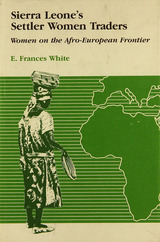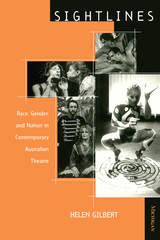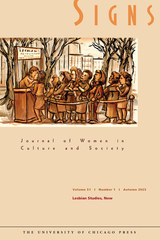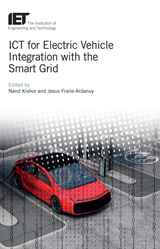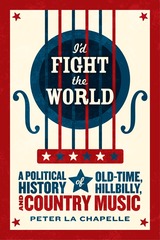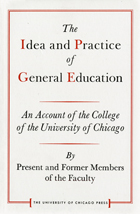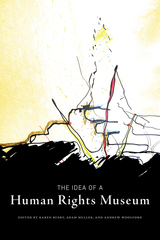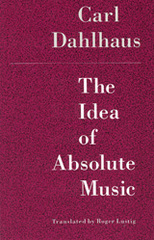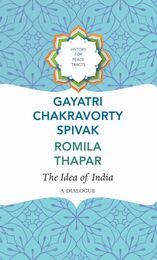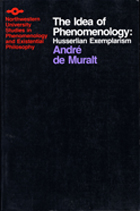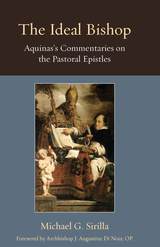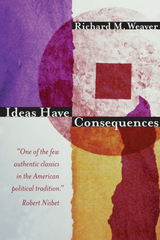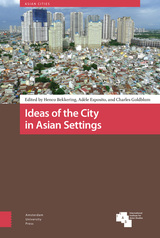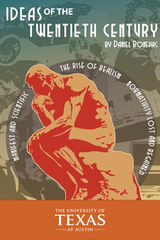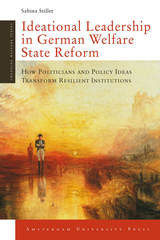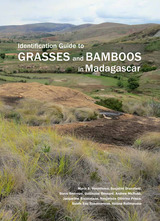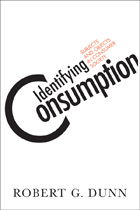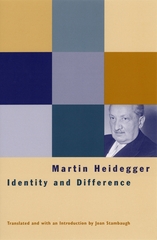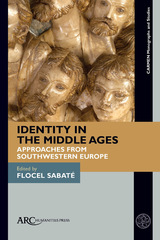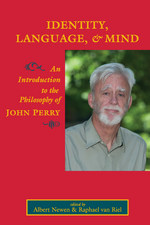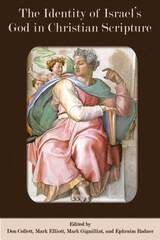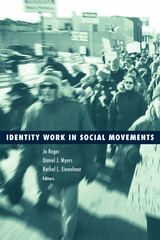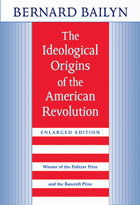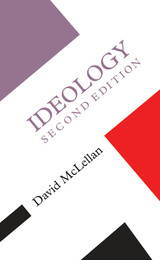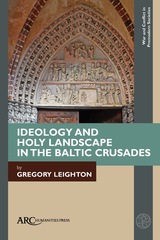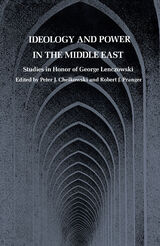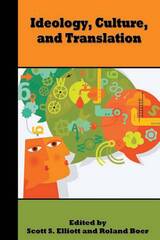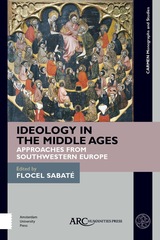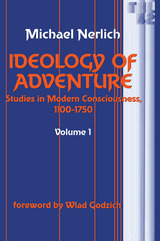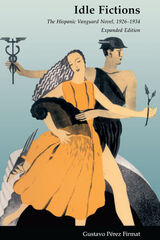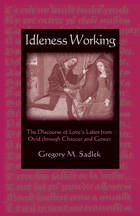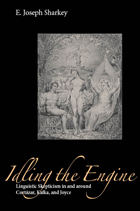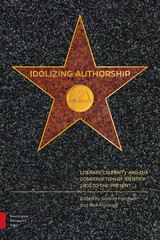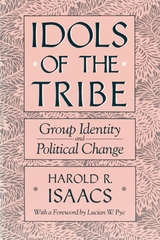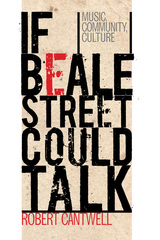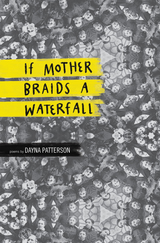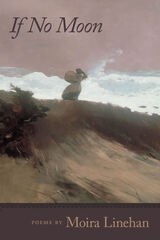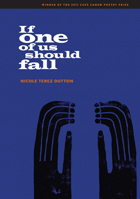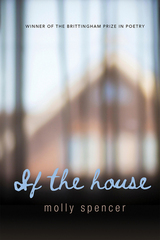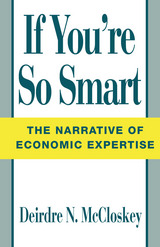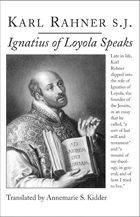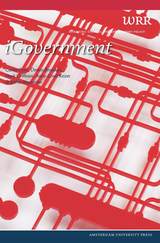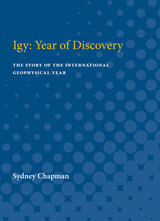 Icons of the Fantastic: Illustrations of Imaginative Literature from The Korshak Collection
Amanda T. Zehnder
University of Delaware Press, 2025 Icons of the Fantastic: Illustrations of Imaginative Literature from the Korshak Collection features artwork by pioneering artists from over 160 years of published works of science fiction and fantasy. The illustrations in the collection appeared on the covers of timeless novels such as the Tarzan series by Edgar Rice Burroughs and classic pulp magazines from the 1930s through 1960s, such as Amazing Stories and Weird Tales. They accompany images of mischievous satyrs, ethereal mermaids, and spell-casting witches for texts ranging from The Tempest, Don Quixote, and Alice's Adventures in Wonderland to works by Edgar Allan Poe and H. G. Wells. Alongside essays about famous illustrators such as Arthur Rackham and Aubrey Beardsley, contributors engage in a critical reassessment of understudied artists such as José Segrelles, Wladyslaw Benda, Margaret Brundage, and Hannes Bok. The book includes a foreword by Guillermo del Toro, a preface by Kevin J. Anderson, an introduction by Michael Dirda, and an interview with renowned contemporary illustration artist Michael Whelan.
Icons of the Left: Benjamin and Eisenstein, Picasso and Kafka after the Fall of Communism
Otto Karl Werckmeister
University of Chicago Press, 1999 In his new book, art historian O. K. Werckmeister advances a critique of Marxist culture in capitalist society.
Focusing on some of the most celebrated instances of traditional "Western Marxism," Werckmeister shows how such "icons of the Left" have been progressively detached from their political roots in communist activism to the safe distance of utopian or revolutionary speculations. He assesses some recent critiques of "Western Marxism" in popular culture such as Soderbergh's film Kafka, pointing out the historic fallacies that underlie such wholesale repudiations. With this analysis, Werckmeister seeks to clear the ground for a coherent cultural policy of the Left that responds to the continuing crisis of society.
ICT for Electric Vehicle Integration with the Smart Grid
Nand Kishor
The Institution of Engineering and Technology, 2020 Electric vehicles (EVs) offer a cleaner mode of personal transportation and a new way to store energy, but also present challenges to the grid due to additional distributed storage and load. With rising numbers of EVs on the streets, problems can include voltage limits violation or line congestion, mainly at the distribution level. All those operating devices in the grid, from network operators/managers to EVs owners, need fast communication with low latency, high security and reliability. The book addresses EVs as a driving source for realizing smart grid operation. It provides chapters from multidisciplinary academic and industry communities related to EVs charging schemes and technologies, and its associated communication, networking and information architectures.
ICT Solutions and Digitalisation in Ports and Shipping
Michele Fiorini
The Institution of Engineering and Technology, 2021 Given the volumes of global ship traffic, solutions are needed to reduce waiting times, costs, energy consumption and emissions. This systematic reference on ICT solutions and digitalisation in the ports and shipping sector covers new and existing technologies, different types of digital systems, and offers illustrative examples and case studies.
I'd Fight the World: A Political History of Old-Time, Hillbilly, and Country Music
Peter La Chapelle
University of Chicago Press, 2019 Long before the United States had presidents from the world of movies and reality TV, we had scores of politicians with connections to country music. In I’d Fight the World, Peter La Chapelle traces the deep bonds between country music and politics, from the nineteenth-century rise of fiddler-politicians to more recent figures like Pappy O’Daniel, Roy Acuff, and Rob Quist. These performers and politicians both rode and resisted cultural waves: some advocated for the poor and dispossessed, and others voiced religious and racial anger, but they all walked the line between exploiting their celebrity and righteously taking on the world. La Chapelle vividly shows how country music campaigners have profoundly influenced the American political landscape.
 I'd Just as Soon Kiss a Wookiee: Uncovering Racialized Desire in the Star Wars Galaxy
Greg Carter
University of Texas Press, 2025 How the Star Wars trilogies and their fandoms have engaged with and mirrored American beliefs about race and gender. The Star Wars saga takes place in a galaxy far, far away, but its social structures—in particular its racial realities—are thoroughly American. So argues Greg Carter in this thought-provoking analysis, which blends historical and theoretical treatments of science fiction cinema and Star Wars fandom to explore the subtle mirroring between fantasy and the communities that create and consume it. I’d Just as Soon Kiss a Wookiee draws on insights from prominent scholars to examine fictional relationships between groups perceived to be biologically different. Three areas of commonality between the United States and Star Wars arise: stiff regulation of racial mixture; racialized servitude, with nonhumans placed in positions of bondage; and the presumption of white male supremacy. None of these are functions of the of the Star Wars story; rather, they index the expectations of US society. But expectations have also shifted since Star Wars launched in 1977, and the franchise with it. Carter gauges minority and mainstream fan reactions, finding that, while science fiction enthusiasts have a reputation for progressiveness, the truth turns out to be as complicated as US racism itself.
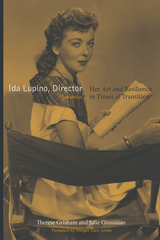 Ida Lupino, Director, 2nd edition: Her Art and Resilience in Times of Transition
Therese Grisham
Rutgers University Press, 2026 The updated edition of Ida Lupino, Director: Her Art and Resilience in Times of Transition, an in-depth exploration of Lupino’s film and television directing work, provides close readings of the films and TV episodes Lupino directed and accounts for the history of Lupino’s reception, continuing into the mid 2020s, in media and film scholarship. The book gives readers a fuller understanding of Lupino’s major contribution to the history of American cinema and media. The revisions update this book, the first on Lupino’s directing, to address recent scholarship on Lupino’s work and reinforce her abiding relevance for cinephiles and film scholars. It incorporates scholarly and popular culture references to Lupino in the last seven years. Updates include a foreword by writer and film critic Imogen Sara Smith, whose work in film scholarship and the public arena has drawn attention to Lupino and the importance of gender to film noir. Authors Therese Grisham and Julie Grossman have added a complete list of the TV episodes Lupino directed in the 1950s and 60s, as well as an updated epilogue.
This new edition addresses how our views of Lupino’s innovative cinema and her prodigious contributions to classic television have been taken up by others, proving that Lupino, whose reputation has waxed and waned since the middle of the 20th century, is here to stay as a major figure in the history of American media.
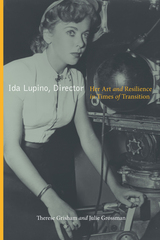 Ida Lupino, Director: Her Art and Resilience in Times of Transition
Grisham, Therese
Rutgers University Press, 2017 Dominated by men and bound by the restrictive Hays Code, postwar Hollywood offered little support for a female director who sought to make unique films on controversial subjects. But Ida Lupino bucked the system, writing and directing a string of movies that exposed the dark underside of American society, on topics such as rape, polio, unwed motherhood, bigamy, exploitative sports, and serial murder.
The first in-depth study devoted to Lupino’s directorial work, this book makes a strong case for her as a trailblazing feminist auteur, a filmmaker with a clear signature style and an abiding interest in depicting the plights of postwar American women. Ida Lupino, Director not only examines her work as a cinematic auteur, but also offers a serious consideration of her diverse and long-ranging career, getting her start in Hollywood as an actress in her teens and twenties, directing her first films in her early thirties, and later working as an acclaimed director of television westerns, sitcoms, and suspense dramas. It also demonstrates how Lupino fused generic elements of film noir and the social problem film to create a distinctive directorial style that was both highly expressionistic and grittily realistic. Ida Lupino, Director thus shines a long-awaited spotlight on one of our greatest filmmakers.
 Ida Lupino, Forgotten Auteur: From Film Noir to the Director's Chair
Alexandra Seros
University of Texas Press, 2024 An archival study of Ida Lupino’s work in film and television directing, writing, producing, and acting from the 1940s to the 1970s. Though her acting career is well known, Ida Lupino was, until very recently, either unknown or overlooked as an influential director. One of the few female directors in Classical Hollywood, Lupino was the only woman with membership in the Directors Guild of America between 1948 and 1971. Her films were about women without power in society and engaged with highly controversial topics despite Hollywood’s strict production code. Working in a male-dominated field, Lupino was forced to manage her public persona carefully, resisting attempts by the press to paint her solely as a dutiful wife and mother—a continual feminization—just so that she could continue directing. Filmmaker Alexandra Seros retells the story of Ida Lupino’s career, from actor to director, first in film, then in television, using archival materials from collections housed around the world. The result provides rich insights into three of Lupino’s independently directed films and a number of episodes from her vast television oeuvre. Seros contextualizes this analysis with discussions of gendered labor in the film industry, the rise of consumerism in the United States after World War II, and the expectations put on women in their family lives during the postwar era. Seros’s portrait of Lupino ultimately paints her life and career as an exemplar of collaborative auteurship.
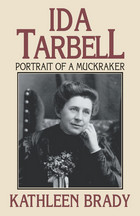 Ida Tarbell: Portrait of a Muckraker
Kathleen Brady
University of Pittsburgh Press, 1984 In this first definitive biography of Ida Tarbell, Kathleen Brady has written a readable and widely acclaimed book about one of America’s great journalists.
Ida Tarbell’s generation called her “a muckraker” (the term was Theodore Roosevelt’s, and he didn’t intend it as a compliment), but in our time she would have been known as “an investigative reporter,” with the celebrity of Woodward and Bernstein. By any description, Ida Tarbell was one of the most powerful women of her time in the United States: admired, feared, hated. When her History of the Standard Oil Company was published, first in McClure’s Magazine and then as a book (1904), it shook the Rockefeller interests, caused national outrage, and led the Supreme Court to fragment the giant monopoly.
A journalist of extraordinary intelligence, accuracy, and courage, she was also the author of the influential and popular books on Napoleon and Abraham Lincoln, and her hundreds of articles dealt with public figures such as Louis Pateur and Emile Zola, and contemporary issues such as tariff policy and labor. During her long life, she knew Teddy Roosevelt, Jane Addams, Henry James, Samuel McClure, Lincoln Stephens, Herbert Hoover, and many other prominent Americans. She achieved more than almost any woman of her generation, but she was an antisuffragist, believing that the traditional roles of wife and mother were more important than public life. She ultimately defended the business interests she had once attacked.
To this day, her opposition to women’s rights disturbs some feminists. Kathleen Brady writes of her: “[She did not have] the flinty stuff of which the cutting edge of any revolution is made. . . . Yet she was called to achievement in a day when women were called only to exist. Her triumph was that she succeeded. Her tragedy ws that she was never to know it.”
The Idea and Practice of General Education: An Account of the College of the University of Chicago
The College of the University of Chicago
University of Chicago Press, 1992 Written by members of the faculty at the College of the University of Chicago, this book provides a comprehensive account of one of the most significant and successful experiments in the field of education. In 1931, the faculty undertook to determine the essentials of a general education and to devise an integrated system of essential courses that students were required to take. This book discusses that innovative curriculum and method, and includes reading lists and sample examinations. Levine's new Preface discusses the endurance of and excitement surrounding the program created during the Hutchins years.
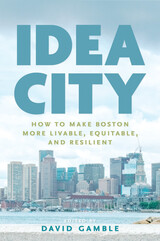 Idea City: How to Make Boston More Livable, Equitable, and Resilient
Edited by David Gamble, Foreword by Renée Loth
University of Massachusetts Press, 2023 Racial strife, increased social and economic discrimination, amplified political friction, and growing uncertainty around the impacts of the COVID-19 pandemic and climate change have laid bare many inequalities within the city of Boston. How will these disruptions and inequities influence the city’s future, especially as Boston celebrates its quadricentennial in 2030? This collection of original essays addresses the many challenges Boston contends with in the twenty-first century and considers ways to improve the city for everyone. Presenting a range of perspectives written by area experts—academics, reflective practitioners, and policymakers—these essays tackle issues of resiliency, mobility, affordable housing, health outcomes, social equity, economic equality, zoning, regionalism, and more. Reflecting the diversity of the city and the challenges and opportunities Boston currently faces, Idea City will help readers think differently about their own areas of expertise and draw conclusions from urban regeneration work in other fields.
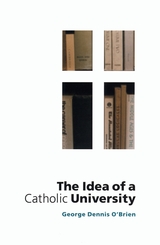 The Idea of a Catholic University
George Dennis O'Brien
University of Chicago Press, 2002 George Bernard Shaw thought that a Catholic university was a contradiction in terms—"university" represents intellectual freedom and "Catholic" represents dogmatic belief. Scholars, university administrators, and even the Vatican have staked out positions debating Shaw's observation. In this refreshing book, George Dennis O'Brien argues that contradiction arises both from the secular university's limited concept of academic freedom and the church's defective notion of dogma.
Truth is a central concept for both university and church, and O'Brien's book is built on the idea that there are different areas of truth—scientific, artistic, and religious—each with its own proper warrant and "method." In this light, he argues that one can reverse Shaw's comparison and uncover academic dogma and Christian freedom, university "infallibility" and dogmatic "fallibility."
Drawing on theology and the history of philosophy, O'Brien shows how religious truth relates to the work of a Catholic university. He then turns to the current controversies over Pope John Paul II's recent statement, Ex Corde Ecclesiae, which seeks to make Catholic universities conform to the church's official teaching office. O'Brien rejects the conventional "institutional-juridical" model used by the Vatican as improper both to faith and academic freedom. He argues for a "sacramental" model, one that respects the different kinds of "truth"—thus preserving the integrity of both church and university while making their combination in a Catholic university not only possible but desirable. O'Brien concludes with a practical consideration of how the ideal Catholic university might be expressed in the actual life of the contemporary curriculum and extracurriculum.
For anyone concerned about the place of religion in higher education, The Idea of a Catholic University will be essential reading.
 The Idea of a China Arrest Warrant: Surrender of Fugitive Offenders between Mainland China, Hong Kong, and Macau
Yanhong Yin
Hong Kong University Press, 2025 A theoretical model for extradition between China, Hong Kong SAR, and Macau SAR.
Hong Kong and Macau have both been Special Administrative Regions of China since 1999. To this day, however, the two SARs and mainland China have yet to form a cohesive agreement for extradition. Yanhong Yin proposes a theoretical model, the China Arrest Warrant, that fulfills three essential criteria: compliance with the framework of “one country, two systems,” allowance for differences within the three divergent legal systems, and sufficient human rights protection.
This model takes direct inspiration from the European Arrest Warrant, which is undergirded by the principle of mutual recognition—the idea that while states may make different decisions on a wide range of matters, results will be accepted equivalently to decisions made by one’s own state. The success of the European Union’s adoption of mutual recognition across political, economic, and legal situations is instrumental in providing a blueprint for judicial cooperation among mainland China, Hong Kong SAR, and Macau SAR.
The Idea of a China Arrest Warrant seeks to resolve a legal quandary that has existed for decades without resolution, and is essential reading in criminal and constitutional law.
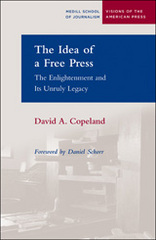 The Idea of a Free Press: The Enlightenment and Its Unruly Legacy
David Copeland
Northwestern University Press, 2006 With the introduction of the printing press in England in 1476, a struggle over its control--and its potential for interrupting power--was joined. The written word, once the domain of the upper levels of society that controlled politics, economics, and religion, could be seen passing into the hands of anyone throughout the social strata who wished to voice opinions on any topic of interest or importance. How the advent of printing led to the idea of a free press is the story told by David Copeland in this book, which traces a confrontation that began with issues of religion and gradually expanded into the realm of political freedom.
The rise of a free press was, in many ways, a legacy of the Reformation and Enlightenment. Copeland describes a discourse centered on questions of religion--a discussion that the government, with all its religious authority, could not suppress because of the belief that the ability to reason for oneself was God-given. In this account we see how the debate moved from religion to the purely political sphere, and how, through the increased use of the printing press, it was opened to a multiplicity of voices and opinions. Spanning nearly four centuries in Britain and America, Copeland's book reveals how the tension between government control and the right to debate public affairs openly ultimately led to the idea of a free press; in doing so, it documents an intellectual development of unparalleled relevance and importance to the history of journalism.
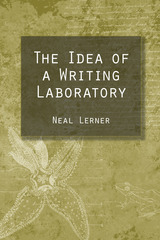 The Idea of a Writing Laboratory
Neal Lerner
Southern Illinois University Press, 2009 The Idea of a Writing Laboratory is a book about possibilities, about teaching and learning to write in ways that can transform both teachers and students. Author Neal Lerner explores higher education’s rich history of writing instruction in classrooms, writing centers and science laboratories. By tracing the roots of writing and science educators’ recognition that the method of the lab––hands-on student activity—is essential to learning, Lerner offers the hope that the idea of a writing laboratory will be fully realized more than a century after both fields began the experiment. Beginning in the late nineteenth century, writing instructors and science teachers recognized that mass instruction was inadequate for a burgeoning, “non-traditional” student population, and that experimental or laboratory methods could prove to be more effective. Lerner traces the history of writing instruction via laboratory methods and examines its successes and failures through case studies of individual programs and larger reform initatives. Contrasting the University of Minnesota General College Writing Laboratory with the Dartmouth College Writing Clinic, for example, Lerner offers a cautionary tale of the fine line between experimenting with teaching students to write and “curing” the students of the disease of bad writing. The history of writing within science education also wends its way through Lerner’s engaging work, presenting the pedagogical origins of laboratory methods to offer educators in science in addition to those in writing studies possibilities for long-sought after reform. The Idea of a Writing Laboratory compels readers and writers to “don those white coats and safety glasses and discover what works” and asserts that “teaching writing as an experiment in what is possible, as a way of offering meaning-making opportunities for students no matter the subject matter, is an endeavor worth the struggle.”
The Idea of Absolute Music
Carl Dahlhaus
University of Chicago Press, 1989 With a characteristically broad and provocative treatment, Dahlhaus examines a single music-aesthetical idea from various historical and philosophical viewpoints.
"Essential reading for anyone interested in the larger intellectual framework in which Romantic music found its place, a framework that to a remarkable degree has continued to shape our image of music."—Robert P. Morgan, Yale University
Carl Dahlhaus (1928-1989) is the author of a highly influential body of works on the foundations of music history and aesthetics.
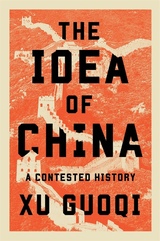 The Idea of China: A Contested History
Xu Guoqi
Harvard University Press An acclaimed historian’s bold response to two simple, yet vexed, questions: What counts as China, and who counts as Chinese?
China became a capitalist superpower by investing in globalization. Now that it has established its credentials—and emerged as a major US competitor—its leaders are looking within, focused on suppressing dissent and fostering cohesion. The result has been an increasingly nationalist cultural agenda, celebrating a Chinese identity steeped in the mystique of the Middle Kingdom and nostalgia for heroic twentieth-century resistance. Yet Chinese nationalism, like nationalism everywhere, is fraught. Few Westerners, and even fewer Chinese, recognize that the very idea of China is up for grabs.
In this sweeping history, Xu Guoqi explores the transnational construction of Chineseness. The Idea of China describes an identity constantly under renovation. Through dialogue and confrontation with neighbors, more distant outsiders, and Chinese speakers and writers within the state, Hong Kong, Taiwan, and the diaspora, the idea of China has been reshaped repeatedly across time. Even bedrock cultural formations like Confucianism have been reimported to China after their translation in Korea, Japan, Vietnam, and elsewhere. The idea of China has always been and remains a continuing process, invented, subverted, and reinvented to serve the shifting needs of kings and bureaucrats, industrialists and intellectuals, allies and adversaries.
Xu’s chronicle is as provocative as it is rigorous, and his conclusion could hardly be starker: China, fundamentally, is constituted by a shared history. To accept this is to begin moving past the heated great-power rivalries that threaten international peace and stability today.
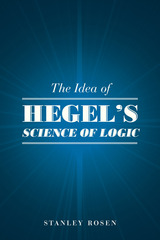 The Idea of Hegel's "Science of Logic"
Stanley Rosen
University of Chicago Press, 2013 Although Hegel considered Science of Logic essential to his philosophy, it has received scant commentary compared with the other three books he published in his lifetime. Here philosopher Stanley Rosen rescues the Science of Logic from obscurity, arguing that its neglect is responsible for contemporary philosophy’s fracture into many different and opposed schools of thought. Through deep and careful analysis, Rosen sheds new light on the precise problems that animate Hegel’s overlooked book and their tremendous significance to philosophical conceptions of logic and reason.
Rosen’s overarching question is how, if at all, rationalism can overcome the split between monism and dualism. Monism—which claims a singular essence for all things—ultimately leads to nihilism, while dualism, which claims multiple, irreducible essences, leads to what Rosen calls “the endless chatter of the history of philosophy.” The Science of Logic, he argues, is the fundamental text to offer a new conception of rationalism that might overcome this philosophical split. Leading readers through Hegel’s book from beginning to end, Rosen’s argument culminates in a masterful chapter on the Idea in Hegel. By fully appreciating the Science of Logic and situating it properly within Hegel’s oeuvre, Rosen in turn provides new tools for wrangling with the conceptual puzzles that have brought so many other philosophers to disaster.
The Idea of India: A Dialogue
Gayatri Chakravorty Spivak and Romila Thapar
Seagull Books, 2024 A lively discussion between two eminent Indian academics that examines what it means to be an Indian.
Through a stimulating dialogue, two old friends trace the history of the idea of India through digressions, anecdotes, and observations. Historian Romila Thapar and theorist Gayatri Chakravorty Spivak reflect on the challenges posed by essentialism and exclusion whenever cultures attempt to define and assert themselves. They also emphasize the role of education in fostering a more inclusive and accurate understanding of the nation’s complex history. Their conversation revolves around the narratives that have shaped Indian identity—from Vedic times to the present—and those whose voices and visions for this land remain unheard and unseen.
Ranging from nationalism to religion and beyond, TheIdea of India discusses an urgent question: What does it mean to be an Indian in contemporary society?
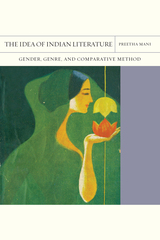 The Idea of Indian Literature: Gender, Genre, and Comparative Method
Preetha Mani
Northwestern University Press, 2022 Winner of the 2023 Aldo and Jeanne Scaglione Prize for South Asian Studies
Indian literature is not a corpus of texts or literary concepts from India, argues Preetha Mani, but a provocation that seeks to resolve the relationship between language and literature, written in as well as against English. Examining canonical Hindi and Tamil short stories from the crucial decades surrounding decolonization, Mani contends that Indian literature must be understood as indeterminate, propositional, and reflective of changing dynamics between local, regional, national, and global readerships. In The Idea of Indian Literature, she explores the paradox that a single canon can be written in multiple languages, each with their own evolving relationships to one another and to English.
Hindi, representing national aspirations, and Tamil, epitomizing the secessionist propensities of the region, are conventionally viewed as poles of the multilingual continuum within Indian literature. Mani shows, however, that during the twentieth century, these literatures were coconstitutive of one another and of the idea of Indian literature itself. The writers discussed here—from short-story forefathers Premchand and Pudumaippittan to women trailblazers Mannu Bhandari and R. Chudamani—imagined a pan-Indian literature based on literary, rather than linguistic, norms, even as their aims were profoundly shaped by discussions of belonging unique to regional identity. Tracing representations of gender and the uses of genre in the shifting thematic and aesthetic practices of short vernacular prose writing, the book offers a view of the Indian literary landscape as itself a field for comparative literature.
 The Idea of Justice
Amartya Sen
Harvard University Press, 2009 Social justice: an ideal, forever beyond our grasp; or one of many practical possibilities? More than a matter of intellectual discourse, the idea of justice plays a real role in how—and how well—people live. And in this book the distinguished scholar Amartya Sen offers a powerful critique of the theory of social justice that, in its grip on social and political thinking, has long left practical realities far behind.
The transcendental theory of justice, the subject of Sen’s analysis, flourished in the Enlightenment and has proponents among some of the most distinguished philosophers of our day; it is concerned with identifying perfectly just social arrangements, defining the nature of the perfectly just society. The approach Sen favors, on the other hand, focuses on the comparative judgments of what is “more” or “less” just, and on the comparative merits of the different societies that actually emerge from certain institutions and social interactions.
At the heart of Sen’s argument is a respect for reasoned differences in our understanding of what a “just society” really is. People of different persuasions—for example, utilitarians, economic egalitarians, labor right theorists, no-nonsense libertarians—might each reasonably see a clear and straightforward resolution to questions of justice; and yet, these clear and straightforward resolutions would be completely different. In light of this, Sen argues for a comparative perspective on justice that can guide us in the choice between alternatives that we inevitably face.
 The Idea of Persia: A Philosophical Inquiry
Ramin Jahanbegloo
Gingko, 2025 Exploring the idea of Persia as a means of investigating the soul of this fascinating nation.
In 1721, the French philosopher Montesquieu posed the question, “Comment peut-on être persan?” in the title to his famous Persian Letters (Lettres persanes). After centuries of invasion, murder, destruction, authoritarian rule, decay of political theory, and increasing dissolution in Iran’s politics, this volume is an investigation into what the answer to that question might be today.
The Idea of Persia explores the notion of what it is to be Persian, but not as it has been constituted in the past, with reference to the political experience of antiquity, nor as an affirmation of the secular-rational project of modernity. Rather, the book examines the question of what it is to be Persian against the backdrop of centuries in which a common, plural subjectivity of Persian-ness has been continually delayed by those who, with or without ideologies, believed in politics only as a means of ruling or of being ruled without laws and in the absence of citizenship.
The historical battle for social and political freedoms is still underway in Iran, and as the nation wrestles with the possibility of an extended period of political, social, and cultural decline, it is a timely moment to return to the perspective embodied in the enlightened thinking of figures such as the writer and three times prime minister of Iran Mohammed Ali Foroughi (1877–1942) and his vision of a country possessing rational and moral capabilities, and to a possible renaissance of social and political institutions.
The idea of Persia as it is presented here sees hope in the future as the means by which Iranians may liberate themselves from the duality of heroes and saints and remake their political mentality while staying true to an age-old idea of Persia and to freedom as a virtue that has to be taught.
Idea of Phenomenology: Husserlian Exemplarism
Andre de Muralt
Northwestern University Press, 1988 De Muralt's ambition is to carry out such 'historical' inquiries in the form of a structural analysis of philosophy, which he regards as a rigorous philosophical discipline—that is, as a science.
 The Idea of Private Law
Ernest J. Weinrib
Harvard University Press, 1995 Private law is a familiar and pervasive phenomenon. It applies our deepest intuitions about personal responsibility and justice to the property we own and use, to the injuries we inflict or avoid, and to the contracts which we make or break. The Idea of Private Law offers a new way of understanding this phenomenon. Rejecting the functionalism popular among legal scholars, Ernest Weinrib advances the provocative idea that private law is an autonomous and noninstrumental moral practice, with its own structure and rationality. Weinrib draws on Kant and Aristotle to set out a formalist approach to private law that repudiates the identification of law with politics or economics. Weinrib argues that private law is to be understood not as a mechanism for promoting efficiency but as a juridical enterprise in which coherent public reason elaborates the norms implicit in the parties' interaction. The book combines philosophical exposition and legal analysis, and pays special attention to issues of tort law.
Private law, Weinrib tells us, embodies a special morality that links the doer and the sufferer of harm. Weinrib elucidates the standpoint internal to this morality, in opposition to functionalists, who view private law as an instrument in the service of external and independently justifiable goals. After establishing the inadequacy of functionalist approaches, Weinrib traces the implications of the formalism he proposes for our ideas of the structure, coherence, and normative grounding of private law. Furthermore, the author shows how this formalism manifests itself in the leading doctrines of private law liability. Finally, he describes the public but nonpolitical role of the courts in articulating the special morality of private law.
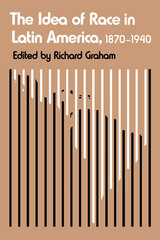 The Idea of Race in Latin America, 1870-1940
Edited and with an introduction by Richard Graham
University of Texas Press, 1990 From the mid-nineteenth century until the 1930s, many Latin American leaders faced a difficult dilemma regarding the idea of race. On the one hand, they aspired to an ever-closer connection to Europe and North America, where, during much of this period, "scientific" thought condemned nonwhite races to an inferior category. Yet, with the heterogeneous racial makeup of their societies clearly before them and a growing sense of national identity impelling consideration of national futures, Latin American leaders hesitated. What to do? Whom to believe? Latin American political and intellectual leaders' sometimes anguished responses to these dilemmas form the subject of The Idea of Race in Latin America. Thomas Skidmore, Aline Helg, and Alan Knight have each contributed chapters that succinctly explore various aspects of the story in Brazil, Argentina, Cuba, and Mexico. While keenly alert to the social and economic differences that distinguish one Latin American society from another, each author has also addressed common issues that Richard Graham ably draws together in a brief introduction. Written in a style that will make it accessible to the undergraduate, this book will appeal as well to the sophisticated scholar.
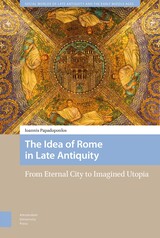 The Idea of Rome in Late Antiquity: From Eternal City to Imagined Utopia
Ioannis Papadopoulos
Amsterdam University Press, 2021 This book approaches the manifestation and evolution of the idea of Rome as an expression of Roman patriotism and as an (urban) archetype of utopia in late Roman thought in a period extending from AD 357 to 417. Within this period of about a human lifetime, the concepts of Rome and Romanitas were reshaped and used for various ideological causes. This monograph unfolds through a selection of sources that represent the patterns and diversity of this ideological process. The theme of Rome as a personified and anthropomorphic figure and as an epitomized notion 'applied' on the urban landscape would become part of the identity of the Romans of Rome highlighting a sense of cultural uniqueness in an era when their city’s privileged status was challenged. Towards the end of the chronological limits set in this thesis various versions of Romanitas would emerge indicating new physical and spiritual potentials.
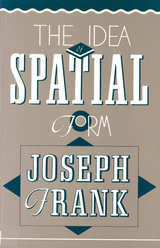 The Idea of Spatial Form
Frank, Joseph
Rutgers University Press, 1991 The Idea of Spatial Form contains the classic essay that introduced the concept of "spatial form" into literary discussion in 1945, and has since been accepted as one of the foundations for a theory of modern literature. It is here reprinted along with two later reconsiderations, one of which answers its major critics, while the second places the theory in relation to Russian Formalism and French Structuralism. Originally conceived to clarify the formal experiments of avant-garde literature, the idea of spatial form, when placed in this wider context, also contributes importantly to the foundations of a general poetics of the literary text. Also included are related discussions of André Malraux, Heinrich Wölfflin, Herbert Read, and E. H. Gombrich.
New material has been added to the essays in the form of footnotes and postscripts to two of them. These either illustrate the continuing relevance of the questions raised, or offer Frank's more recent opinions on the topic.
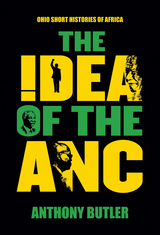 The Idea of the ANC
Anthony Butler
Ohio University Press, 2013 The African National Congress (ANC) is Africa’s most famous liberation movement. It has recently celebrated its centenary, a milestone that has prompted partisans to detail a century of unparalleled achievement in the struggle against colonialism and racial discrimination. Critics paint a less flattering portrait of the historical ANC as a communist puppet, a moribund dinosaur, or an elitist political parasite. For such skeptics, the ANC—now in government for two decades—has betrayed South Africans rather than liberating them.
South Africans endure deep inequality and unemployment, violent community protests, murders of foreign residents, major policy blunders, an AIDS crisis, and deepening corruption. Inside the ANC there are episodes of open rebellion against the leadership, conflicts over the character of a postliberation movement, and debilitating battles for succession to the movement’s presidency. The ANC is nevertheless likely to remain the party of government for the foreseeable future.
This remarkable book explores how ANC intellectuals and leaders interpret the historical project of their movement. It investigates three interlocking ideas: a conception of power, a responsibility for promoting unity, and a commitment to human liberation. Anthony Butler explores how these notions have shaped South African politics in the past and how they will inform ANC leaders’ responses to the challenges of the future.
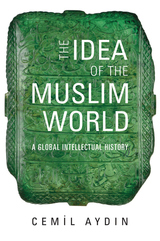 The Idea of the Muslim World: A Global Intellectual History
Cemil Aydin
Harvard University Press, 2017 “Superb… A tour de force.”
—Ebrahim Moosa
“Provocative… Aydin ranges over the centuries to show the relative novelty of the idea of a Muslim world and the relentless efforts to exploit that idea for political ends.”
—Washington Post
When President Obama visited Cairo to address Muslims worldwide, he followed in the footsteps of countless politicians who have taken the existence of a unified global Muslim community for granted. But as Cemil Aydin explains in this provocative history, it is a misconception to think that the world’s 1.5 billion Muslims constitute a single entity. How did this belief arise, and why is it so widespread? The Idea of the Muslim World considers its origins and reveals the consequences of its enduring allure.
“Much of today’s media commentary traces current trouble in the Middle East back to the emergence of ‘artificial’ nation states after the fall of the Ottoman Empire… According to this narrative…today’s unrest is simply a belated product of that mistake. The Idea of the Muslim World is a bracing rebuke to such simplistic conclusions.”
—Times Literary Supplement
“It is here that Aydin’s book proves so valuable: by revealing how the racial, civilizational, and political biases that emerged in the nineteenth century shape contemporary visions of the Muslim world.”
—Foreign Affairs
 The Idea of the Sciences in the French Enlightenment: A Reinterpretation
G. Matthew Adkins
University of Delaware Press, 2014 This book traces the development of the idea that the sciences were morally enlightening through an intellectual history of the secrétaires perpétuels of the French Royal Academy of Sciences and their associates from the mid-seventeenth century to the end of the eighteenth century. Academy secretaries such as Fontenelle and Condorcet were critical to the emergence of a central feature of the narrative of Enlightenment in that they encouraged the notion that the “philosophical spirit” of the Scientific Revolution, already present among the educated classes, should guide the necessary reformation of society and government according to the ideals of scientific reasoning. The Idea of the Sciences also tells an intellectual history of political radicalization, explaining especially how the marquis de Condorcet came to believe that the sciences could play central a role in guiding the outcome of the Revolution of 1789.
Published by University of Delaware Press. Distributed worldwide by Rutgers University Press.
 The Idea of the Theater in Latin Christian Thought: Augustine to the Fourteenth Century
Donnalee Dox
University of Michigan Press, 2004 "Through well-informed and nuanced readings of key documents from the fourth through fourteenth centuries, this book challenges historians' long-held beliefs about how concepts of Greco-Roman theater survived the fall of Rome and the Middle Ages, and contributed to the dramatic triumphs of the Renaissance. Dox's work is a significant contribution to the history of ideas that will change forever the standard narrative of the birth and development of theatrical activity in medieval Europe."
---Margaret Knapp, Arizona State University
"...an elegantly concise survey of the way classical notions of theater have been interpreted in the Latin Middle Ages. Dox convincingly demonstrates that far from there being a single 'medieval' attitude towards theater, there was in fact much debate about how theater could be understood to function within Christian tradition, even in the so-called 'dark ages' of Western culture. This book makes an innovative contribution to studies of the history of the theater, seen in terms of the history of ideas, rather than of practice."
---Constant Mews, Director, Centre for the Study of Religion & Theology, University of Monash, Australia
"In the centuries between St. Augustine and Bartholomew of Bruges, Christian thought gradually moved from a brusque rejection of classical theater to a progressively nuanced and positive assessment of its value. In this lucidly written study, Donnalee Dox adds an important facet to our understanding of the Christian reaction to, and adaptation of, classical culture in the centuries between the Church Fathers and the rediscovery of Aristotle."
---Philipp W. Rosemann, University of Dallas
This book considers medieval texts that deal with ancient theater as documents of Latin Christianity's intellectual history. As an exercise in medieval historiography, this study also examines biases in modern scholarship that seek links between these texts and performance practices. The effort to bring these texts together and place them in their intellectual contexts reveals a much more nuanced and contested discourse on Greco-Roman theater and medieval theatrical practice than has been acknowledged. The book is arranged chronologically and shows the medieval foundations for the Early Modern integration of dramatic theory and theatrical performance.
The Idea of the Theater in Latin Christian Thought will be of interest to theater historians, intellectual historians, and those who work on points of contact between the European Middle Ages and Renaissance. The broad range of documents discussed (liturgical treatises, scholastic commentaries, philosophical tracts, and letters spanning many centuries) renders individual chapters useful to philosophers, aestheticians, and liturgists as well as to historians and historiographers. For theater historians, this study offers an alternative reading of familiar texts which may alter our understanding of the emergence of dramatic and theatrical traditions in the West. Because theater is rarely considered as a component of intellectual projects in the Middle Ages, this study opens a new topic in the writing of medieval intellectual history.
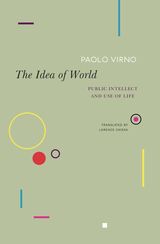 The Idea of World: Public Intellect and Use of Life
Paolo Virno
Seagull Books, 2022 A philosophical exploration of what capitalistic societies truly mean for the individual.
A short vade mecum for unrepentant materialism, The Idea of World collects three essays by Italian philosopher Paulo Virno that are intricately wrapped around one another. The first essay, “Mundanity,” tries to clarify what the term “world,” as referred to as the perceptual and historical context of our existence, means—both with and against Kant and Wittgenstein. How should we understand expressions such as “worldly people,” “the course of the world,” or “getting by in this world”? The second, “Virtuosity and Revolution,” is a minor political treatise. Virno puts forward a set of concepts capable of confronting the magnetic storm that has knocked out the compasses that every reflection on the public sphere has relied on since the seventeenth century. The third, “The Use of Life”, is the shorthand delineation of a research program on the notion of use. What exactly are we doing when we use a hammer, a time span, or an ironic sentence? And, above all, what does the use of the self—of one’s own life, which lies at the basis of all uses—amount to in human existence?
Presenting his ideas in three distinct vignettes, Virno examines how the philosophy of language, anthropology, and political theory are inextricably linked.
 Ideal Beauty: The Life and Times of Greta Garbo
Lois W. Banner
Rutgers University Press, 2023 One of the silver screen’s greatest beauties, Greta Garbo was also one of its most profound enigmas. A star in both silent pictures and talkies, Garbo kept viewers riveted with understated performances that suggested deep melancholy and strong desires roiling just under the surface. And offscreen, the intensely private Garbo was perhaps even more mysterious and alluring, as her retirement from Hollywood at age thirty-six only fueled the public’s fascination.
Ideal Beauty reveals the woman behind the mystique, a woman who overcame an impoverished childhood to become a student at the Swedish Royal Dramatic Academy, an actress in European films, and ultimately a Hollywood star. Chronicling her tough negotiations with Louis B. Mayer at MGM, it shows how Garbo carved out enough power in Hollywood to craft a distinctly new feminist screen presence in films like Queen Christina. Banner draws on over ten years of in-depth archival research in Sweden, Germany, France, and the United States to demonstrate how, away from the camera’s glare, Garbo’s life was even more intriguing. Ideal Beauty takes a fresh look at an icon who helped to define female beauty in the twentieth century and provides answers to much-debated questions about Garbo’s childhood, sexuality, career, illnesses and breakdowns, and spiritual awakening.
The Ideal Bishop
Michael G. Sirilla
Catholic University of America Press, 2017 St. Thomas Aquinas’s commentaries on the Pastoral Epistles are distinctive and overlooked theological resources, offering invaluable insights into the exercise of the episcopal office in bringing about the spiritual perfection of the faithful in Christ. The Ideal Bishop includes a review of the theology of the episcopacy found in St. Thomas’s principal contemporaries, including Peter Lombard, St. Albert the Great, and St. Bonaventure of Bagnoregio. The heart of this book is an examination of the theology and spirituality of the episcopacy found in the lectures on 1 Timothy, 2 Timothy, and Titus. Particular attention is devoted to Aquinas’s treatment of the nature, purpose, requisite virtues, disqualifying vice, special duties, and particular graces of the episcopal office.
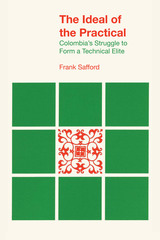 The Ideal of the Practical: Colombia’s Struggle to Form a Technical Elite
By Frank Safford
University of Texas Press, 1976 The Ideal of the Practical is a study of efforts by a segment of the upper class in an aristocratic Latin American society to alter cultural values in the society, creating stronger orientations toward the technical and the practical. Frank Safford describes attempts by members of Colombia’s nineteenth-century political elite to use technical education as a means of nurturing energetic upper-class entrepreneurs and an industrious working class in a static agrarian economy. In the course of his analysis, Safford sketches the historical development of scientific and technical education and of the engineering profession in Colombia. The book opens with a description of the economic and social context of early nineteenth-century Colombia. It then discusses some early experiments with manual industrial training between 1820 and 1850. Later chapters deal with the careers of upper-class youths sent abroad for scientific and technical training, the growth of indigenous engineering education, and the crystallization of a Colombian engineering profession. While the book primarily explores the nineteenth century, it also touches on eighteenth-century Spanish Bourbon antecedents and provides an epilogue on the twentieth-century evolution of technical elites in Colombia. The author focuses on the reasons why the implantation of technical education and technical orientations proved difficult. He examines the interplay between various obstructions: on the one hand, a hierarchical social structure and aristocratic social values and, on the other, obstructions created by fundamental geographic and economic conditions. He concludes that, while Colombian leaders had hoped that technical education and the development of values oriented toward the technical would spearhead economic growth, in fact economic growth proved a prerequisite for the effective implantation of technical orientations and training.
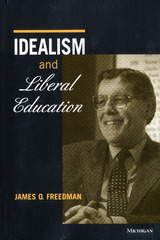 Idealism and Liberal Education
James O. Freedman
University of Michigan Press, 2001 With refreshing eloquence, James O. Freedman sets down the American ideals that have informed his life as an intellectual, a law professor, and a college and university president. He examines the content and character of liberal education, discusses the importance of letters and learning in forming his own life and values, and explores how the lessons and the habits of mind instilled by a liberal education can give direction and meaning to one's life. He offers a stirring defense of affirmative action in higher education. And he describes how, in the midst of undergoing chemotherapy for cancer, liberal education helped him in that most human of desires--the yearning to make order and sense out of his experience.
Part intellectual biography and part examination of the world of higher education, Idealism and Liberal Education is a quintessentially American book, animated by a confidence that reason, knowledge, idealism, and the better angels of our natures will further human progress.
Freedman offers, as models for shaping one's life, profiles of some of his heroes--Thurgood Marshall, Alexander M. Bickel, Václav Havel, Louis D. Brandeis, Felix Frankfurter, Hugo L. Black, Flannery O'Connor, Eudora Welty, George Orwell, Edmund Wilson, Martin Luther King, Jr., George F. Kennan, Ralph J. Bunche, and Harry S Truman.
This volume speaks to all Americans who are drawn to the power of liberal education and democratic citizenship and who yearn for the inspiration to lead thoughtful, committed lives.
"This thought-provoking book should be required reading for young people entering college and for the people who advise them. Freedman explores the purpose and importance of a liberal education in shaping values, character, and imagination and convincingly argues for the need for the wisdom and perspective it provides, whatever one's chosen field."--Marian Wright Edelman, President, Children's Defense Fund
"In this wide-ranging series of essays, Freedman reveals himself again as one of America's most erudite, articulate, and reflective university presidents. Students, parents, fellow presidents, and all who love learning will find something in these pages to ponder with profit."--Derek Bok, Former President, Harvard University
Idealism and Liberal Education is an inspiring intellectual diary of James O. Freedman. . . . It is a forceful affirmation of liberal education as a social and cultural force in shaping the minds and characters of our youth as future citizens and leaders of our democracy. It is a tribute to the joy of learning."--Vartan Gregorian, President, Brown University
"Beautifully written and a pleasure to read. At a time when the idea of the liberal university is under attack from all sides, Freedman has given a wondrous personal reaffirmation of its place in our lives."--David Halberstam
James O. Freedman is President of Dartmouth College.
 The Idealist: Wendell Willkie’s Wartime Quest to Build One World
Samuel Zipp
Harvard University Press, 2020 Winner of the Robert H. Ferrell Book Prize
“The Idealist is a powerful book, gorgeously written and consistently insightful. Samuel Zipp uses the 1942 world tour of Wendell Willkie to examine American attitudes toward internationalism, decolonization, and race in the febrile atmosphere of the world’s first truly global conflict.”
—Andrew Preston, author of Sword of the Spirit, Shield of Faith
A dramatic account of the plane journey undertaken by businessman-turned-maverick-internationalist Wendell Willkie to rally US allies to the war effort. Willkie’s tour of a planet shrunk by aviation and war inspired him to challenge Americans to fight a rising tide of nationalism at home.
In August 1942, as the threat of fascism swept the world, a charismatic Republican presidential contender boarded the Gulliver at Mitchel Airfield for a seven-week journey around the world. Wendell Willkie covered 31,000 miles as President Roosevelt’s unofficial envoy. He visited the battlefront in North Africa with General Montgomery, debated a frosty de Gaulle in Beirut, almost failed to deliver a letter to Stalin in Moscow, and allowed himself to be seduced by Chiang Kai-shek in China. Through it all, he was struck by the insistent demands for freedom across the world.
In One World, the runaway bestseller he published on his return, Willkie challenged Americans to resist the “America first” doctrine espoused by the war’s domestic opponents and warned of the dangers of “narrow nationalism.” He urged his fellow citizens to end colonialism and embrace “equality of opportunity for every race and every nation.” With his radio broadcasts regularly drawing over 30 million listeners, he was able to reach Americans directly in their homes. His call for a more equitable and interconnected world electrified the nation, until he was silenced abruptly by a series of heart attacks in 1944. With his death, America lost its most effective globalist, the man FDR referred to as “Private Citizen Number One.”
At a time when “America first” is again a rallying cry, Willkie’s message is at once chastening and inspiring, a reminder that “one world” is more than a matter of supply chains and economics, and that racism and nationalism have long been intertwined.
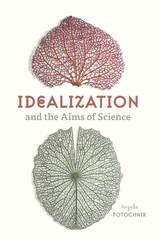 Idealization and the Aims of Science
Angela Potochnik
University of Chicago Press, 2017 Science is the study of our world, as it is in its messy reality. Nonetheless, science requires idealization to function—if we are to attempt to understand the world, we have to find ways to reduce its complexity.
Idealization and the Aims of Science shows just how crucial idealization is to science and why it matters. Beginning with the acknowledgment of our status as limited human agents trying to make sense of an exceedingly complex world, Angela Potochnik moves on to explain how science aims to depict and make use of causal patterns—a project that makes essential use of idealization. She offers case studies from a number of branches of science to demonstrate the ubiquity of idealization, shows how causal patterns are used to develop scientific explanations, and describes how the necessarily imperfect connection between science and truth leads to researchers’ values influencing their findings. The resulting book is a tour de force, a synthesis of the study of idealization that also offers countless new insights and avenues for future exploration.
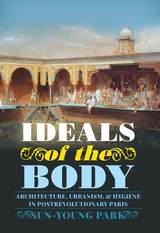 Ideals of the Body: Architecture, Urbanism, and Hygiene in Postrevolutionary Paris
Sun-Young Park
University of Pittsburgh Press, 2018 Modern hygienic urbanism originated in the airy boulevards, public parks, and sewer system that transformed the Parisian cityscape in the mid-nineteenth century. Yet these well-known developments in public health built on a previous moment of anxiety about the hygiene of modern city dwellers. Amid fears of national decline that accompanied the collapse of the Napoleonic Empire, efforts to modernize Paris between 1800 and 1850 focused not on grand and comprehensive structural reforms, but rather on improving the bodily and mental fitness of the individual citizen. These forgotten efforts to renew and reform the physical and moral health of the urban subject found expression in the built environment of the city—in the gymnasiums, swimming pools, and green spaces of private and public institutions, from the pedagogical to the recreational. Sun-Young Park reveals how these anxieties about health and social order, which manifested in emerging ideals of the body, created a uniquely spatial and urban experience of modernity in the postrevolutionary capital, one profoundly impacted by hygiene, mobility, productivity, leisure, spectacle, and technology.
 Ideas across Cultures: Essays on Chinese Thought in Honor of Benjamin I. Schwartz
Paul A. Cohen
Harvard University Press, 1990 Benjamin Schwartz taught at Harvard from 1950 until his retirement in 1987. Through his teaching and writing, he became a major force in the field of Chinese studies, setting standards—above all in the area of intellectual history—that have been a source of inspiration to students and scholars worldwide. His influence extends well beyond the China field, cutting across conventional disciplinary boundaries, touching political science, religion, philosophy, and literature as well as history.
The essays in this book are by scholars who have studied with Benjamin Schwartz. Given the range of his own interests, it is fitting that they embrace an expanse of time from the Zhou dynasty to the present and a range of subjects equally inclusive—ancient and medieval Chinese thought, the fate of democracy in early Republican China, the development of aesthetic modernism in the 1920s and 1930s and its reemergence in the post-Mao era, the emphasis on spiritual regeneration and cultural transformation in Chinese and Japanese Marxism, popular values in twentieth-century China (as reflected in village theatrical performances), the larger issue of what part our own values should take in the study and assessment of other societies and cultures, and the equally broad issue of how we are to address the relationship between Chinese modernization and China’s traditional culture.
Despite this heterogeneity and the fact that the contributors include two political scientists, five historians with strong philosophical interests, and three scholars whose writing bridges the disciplines of history and literature, there is a surprising coherence to the volume. Almost all the authors consciously address either aspects of Schwartz’s general approach or specific themes dealt with in his work. Each contribution is about ideas and takes ideas and their societal roles seriously. Although presented in the specific context of China, the issues raised in these essays are important to the world beyond China. Exploring them in both their Chinese and non-Chinese settings reflects the power of Schwartz’s own work in illuminating a broader canvas of human thought.
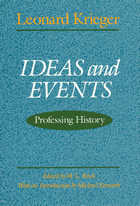 Ideas and Events: Professing History
Leonard Krieger
University of Chicago Press, 1992 Leonard Krieger has long been revered as a contemporary master historian. With an eye toward placing his critical achievements before an expanded readership, he helped compile this core collection of his most important essays. Together these essays bring under a single cover the key themes and ideas of his life's work to serve as a handbook for intellectual history and historians of every stripe.
This book reflects Krieger's conviction that the value of intellectual history is as a source of orientation in a world of information overload. In Krieger's hands, intellectual history has stressed "thinking-through" the relations between ideas and events rather than the compilation and recapitulation of mere facts and historical categories.
The essays in this collection cover a range of topics, including history of ideas, intellectual history, early modern political history, German political history, Hegel, Marx, and more. Many of these essays are already classics of historical scholarship. With the demise of the Soviet Union and state-sponsored Marxism, and with the reunification of Germany, Krieger's history takes on new relevance and a renewed importance.
With a splendid introduction by Michael Ermath, and an extensive bibliography of Krieger's most important books and essays, this is a "must read" for every serious student of modern history.
Leonard Krieger was University Professor Emeritus in the Department of History at the University of Chicago until his death in 1990.
Ideas Have Consequences
Richard M. Weaver
University of Chicago Press, 1984 In what has become a classic work, Richard M. Weaver unsparingly diagnoses the ills of our age and offers a realistic remedy. He asserts that the world is intelligible, and that man is free. The catastrophes of our age are the product not of necessity but of unintelligent choice. A cure, he submits, is possible. It lies in the right use of man's reason, in the renewed acceptance of an absolute reality, and in the recognition that ideas—like actions—have consequences.
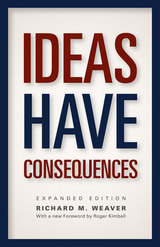 Ideas Have Consequences: Expanded Edition
Richard M. Weaver
University of Chicago Press, 2013 Originally published in 1948, at the height of post–World War II optimism and confidence in collective security, Ideas Have Consequences uses “words hard as cannonballs” to present an unsparing diagnosis of the ills of the modern age. Widely read and debated at the time of its first publication,the book is now seen asone of the foundational texts of the modern conservative movement.
In its pages, Richard M. Weaver argues that the decline of Western civilization resulted from the rising acceptance of relativism over absolute reality. In spite of increased knowledge, this retreat from the realist intellectual tradition has weakened the Western capacity to reason, with catastrophic consequences for social order and individual rights. But Weaver also offers a realistic remedy. These difficulties are the product not of necessity, but of intelligent choice. And, today, as decades ago, the remedy lies in the renewed acceptance of absolute reality and the recognition that ideas—like actions—have consequences.
This expanded edition of the classic work contains a foreword by New Criterion editor Roger Kimball that offers insight into the rich intellectual and historical contexts of Weaver and his work and an afterword by Ted J. Smith III that relates the remarkable story of the book’s writing and publication.
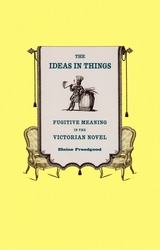 The Ideas in Things: Fugitive Meaning in the Victorian Novel
Elaine Freedgood
University of Chicago Press, 2006 While the Victorian novel famously describes, catalogs, and inundates the reader with things, the protocols for reading it have long enjoined readers not to interpret most of what crowds its pages. The Ideas in Things explores apparently inconsequential objects in popular Victorian texts to make contact with their fugitive meanings. Developing an innovative approach to analyzing nineteenth-century fiction, Elaine Freedgood here reconnects the things readers unwittingly ignore to the stories they tell.
Building her case around objects from three well-known Victorian novels—the mahogany furniture in Charlotte Brontë’s Jane Eyre, the calico curtains in Elizabeth Gaskell’s Mary Barton, and “Negro head” tobacco in Charles Dickens’s Great Expectations—Freedgood argues that these things are connected to histories that the novels barely acknowledge, generating darker meanings outside the novels’ symbolic systems. A valuable contribution to the new field of object studies in the humanities, The Ideas in Things pushes readers’ thinking about things beyond established concepts of commodity and fetish.
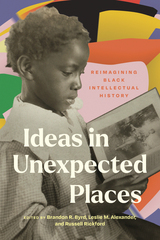 Ideas in Unexpected Places: Reimagining Black Intellectual History
Edited by Leslie M. Alexander, Brandon R. Byrd, and Russell Rickford
Northwestern University Press, 2022 This transformative collection advances new approaches to Black intellectual history by foregrounding the experiences and ideas of people who lacked access to more privileged mechanisms of public discourse and power. While the anthology highlights renowned intellectuals such as W. E. B. Du Bois, it also spotlights thinkers such as enslaved people in the antebellum United States, US Black expatriates in Guyana, and Black internationals in Liberia. The knowledge production of these men, women, and children has typically been situated outside the disciplinary and conceptual boundaries of intellectual history.
The volume centers on the themes of slavery and sexuality; abolitionism; Black internationalism; Black protest, politics, and power; and the intersections of the digital humanities and Black intellectual history. The essays draw from diverse methodologies and fields to examine the ideas and actions of Black thinkers from the eighteenth century to the present, offering fresh insights while creating space for even more creative approaches within the field.
Timely and incisive, Ideas in Unexpected Places encourages scholars to ask new questions through innovative interpretive lenses—and invites students, scholars, and other practitioners to push the boundaries of Black intellectual history even further.
Ideas of the City in Asian Settings
Edited by Henco Bekkering, Adèle Esposito, and Charles Goldblum
Amsterdam University Press, 2019 At a time when intense dynamics of urban development of Asian cities puzzle and disorient, Ideas of the City in Asian Settings offers knowledge about the concepts, representations, and ideas that lie beneath the historical and contemporary production of cities in Asia, in order to deepen our understanding of the processes and meanings of urban development in the continent. The book sheds more light on the vast array of rules and innovations and aspirations that make cities into complex objects that are continuously ‘in the making’. Because Asian cities have experienced unprecedented dynamics of urban development during the last fifty years, they are considered as crucial places to question the perspectives that multiple actors project onto changing urban environments, as well as the evolution of the role of cities in globalisation.
Ideas of the Twentieth Century
Daniel Bonevac
University of Texas Press, 2014 The twentieth century ushered in significant progress, as philosophers, scientists, artists, and poets across the world improved the way we lived. Yet the last century also brought increased levels of war, tyranny, and genocide, and people lost faith in values. Now, thinkers and leaders are reconstructing theories of value and creating institutions to embody them. In this thought-provoking, broad-sweeping course, you will learn how philosophy, art, literature, and history shaped the past century and continue to impact our world today.
Ideational Leadership in German Welfare State Reform: How Politicians and Policy Ideas Transform Resilient Institutions
Sabina Stiller
Amsterdam University Press, 2010
An important contribution to the debates surrounding the evolution of the European welfare state model, this volume investigates the role that “ideational leadership” has played in the passing of structural reforms in the change-resistant German welfare state. Based on in-depth case studies of individual reforms in health care, pensions, and unemployment insurance since the early 1990s, Stiller illuminates the ways in which Germany has made the transition from its Bismarckian past to a hybrid welfare state.
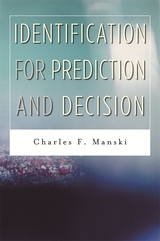 Identification for Prediction and Decision
Charles F. Manski
Harvard University Press, 2008 This book is a full-scale exposition of Charles Manski's new methodology for analyzing empirical questions in the social sciences. He recommends that researchers first ask what can be learned from data alone, and then ask what can be learned when data are combined with credible weak assumptions. Inferences predicated on weak assumptions, he argues, can achieve wide consensus, while ones that require strong assumptions almost inevitably are subject to sharp disagreements.
Building on the foundation laid in the author's Identification Problems in the Social Sciences (Harvard, 1995), the book's fifteen chapters are organized in three parts. Part I studies prediction with missing or otherwise incomplete data. Part II concerns the analysis of treatment response, which aims to predict outcomes when alternative treatment rules are applied to a population. Part III studies prediction of choice behavior.
Each chapter juxtaposes developments of methodology with empirical or numerical illustrations. The book employs a simple notation and mathematical apparatus, using only basic elements of probability theory.
Identification Guide to Grasses and Bamboos in Madagascar
Maria Vorontsova
Royal Botanic Gardens, Kew, 2018 The family containing grasses and bamboos, Poaceae, includes an estimated 12,000 species. Grasses and bamboos have always been a central pillar of people’s lives, providing rice, maize, sugarcane, and bread wheat for humans and livestock. Despite their importance, Madagascar’s grasses are still poorly known. This guide provides a practical means of identifying these beautiful and interesting plants at the generic level, featuring 144 grasses described with life size color photographs.
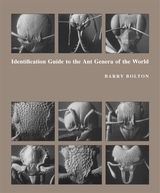 Identification Guide to the Ant Genera of the World
Barry Bolton
Harvard University Press, 1994 From subarctic tundra to equatorial rainforest, deep in the soil and at the tip of the highest tree, ants are found the world over. This book, by the world’s leading ant taxonomist, offers a definitive guide for identifying these ubiquitous insects.
Barry Bolton provides identification keys to all the living ant subfamilies and genera, presented in alphabetical order and separated by zoogeographical region. Designed for professional and amateur myrmecologists alike, this guide is as accessible as it is comprehensive, including information on the function and use of identification keys, instructions for preparing specimens for examination, and an illustrated glossary of morphological terms. Over 500 scanning electron microscope photographs illustrate the taxonomic keys.
Bolton introduces each subfamily with a diagnosis of the group, followed by synoptic classifications of all genera within each subfamily, notes on broad distribution, and a list of references to all species-rank publications useful to identification. He also provides a short summary of the extinct subfamilies and includes a checklist of every name ever proposed in the classification of ants, from the rank of family down to subgenus, showing the current status and usage of each.
An updated and exhaustively expanded revision of the taxonomic keys found in Hölldobler and Wilson’s The Ants, Bolton’s identification guide takes its place alongside that landmark work as the foundation for the study of ants for many years to come.
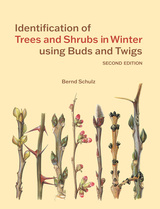 Identification of Trees & Shrubs in Winter Using Buds and Twigs, Second Edition
Bernd Schulz
Royal Botanic Gardens, Kew, 2025 An updated edition of Bernd Schulz’s unrivaled practical guide to identifying trees and shrubs in winter.
This second edition of the essential reference book for plant identification in winter is updated with new illustrations and fully revised text.
To many plant lovers winter seems like lost time, but a glance at the twigs of trees and shrubs shows that this does not need to be the case. In contrast to other life forms, trees and shrubs do not die above ground but enclose their shoots for the next year in buds, presenting many characters which hardly change over time. Using these bud and twig characters, deciduous trees and shrubs can be classified reliably in winter, which is particularly important during planting time.
Comprehensive and easy to use, Identification of Trees & Shrubs in Winter using Buds and Twigs contains over seven hundred species identifiable via their winter buds and twigs. The illustrated identification keys are easy to use, and a summary set of keys is provided as an appendix. Detailed descriptions are accompanied with 1,900 illustrations.
Identification of Trees and Shrubs in Winter Using Buds and Twigs
Bernd Schulz
Royal Botanic Gardens, Kew, 2018 For many plant lovers, winter seems like a lost time. The bursts of color and distinctive leaf shapes disappear, leaving what seems like ambiguous branches. But there is no need for botanical enthusiasts to hunker down until spring. What we overlook as “dead trees” are simply shoots covered up for the season. If we look closer, we’ll see that trees and shrubs have distinct shapes to their buds and twigs that allow them to be classified reliably in winter.
While most books focus on identifying leaves and other seasonal characteristics, this practical guide is one of the few that will allow gardeners to identify trees and shrubs while they are in their dormant state. It covers more than seven hundred species and includes easy-to-use illustrated identification keys. More than 1,400 color images make it even easier to spot the distinctive pieces of these plants.
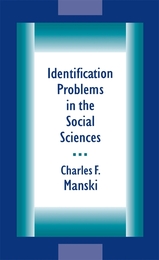 Identification Problems in the Social Sciences
Charles F. Manski
Harvard University Press, 1999 This book provides a language and a set of tools for finding bounds on the predictions that social and behavioral scientists can logically make from nonexperimental and experimental data. The economist Charles Manski draws on examples from criminology, demography, epidemiology, social psychology, and sociology as well as economics to illustrate this language and to demonstrate the broad usefulness of the tools.
There are many traditional ways to present identification problems in econometrics, sociology, and psychometrics. Some of these are primarily statistical in nature, using concepts such as flat likelihood functions and nondistinct parameter estimates. Manski's strategy is to divorce identification from purely statistical concepts and to present the logic of identification analysis in ways that are accessible to a wide audience in the social and behavioral sciences. In each case, problems are motivated by real examples with real policy importance, the mathematics is kept to a minimum, and the deductions on identifiability are derived giving fresh insights.
Manski begins with the conceptual problem of extrapolating predictions from one population to some new population or to the future. He then analyzes in depth the fundamental selection problem that arises whenever a scientist tries to predict the effects of treatments on outcomes. He carefully specifies assumptions and develops his nonparametric methods of bounding predictions. Manski shows how these tools should be used to investigate common problems such as predicting the effect of family structure on children's outcomes and the effect of policing on crime rates.
Successive chapters deal with topics ranging from the use of experiments to evaluate social programs, to the use of case-control sampling by epidemiologists studying the association of risk factors and disease, to the use of intentions data by demographers seeking to predict future fertility. The book closes by examining two central identification problems in the analysis of social interactions: the classical simultaneity problem of econometrics and the reflection problem faced in analyses of neighborhood and contextual effects.
Identifying Consumption: Subjects and Objects in Consumer Society
Robert G. Dunn
Temple University Press, 2008 Identifying Consumption illustrates how an individual’s buying habits are shaped by the dynamics of the consumer marketplace—and thus how consumption and identity inform each other. Robert Dunn brings together the various theories of spending and develops a mode of analysis concentrating on the individual subjectivity of consumption. By doing so, he addresses how we spend and its relationship with status and lifestyle. Dunn provides a comprehensive guide to the study of modern consumer behavior before summarizing and critiquing the major theories of consumption. At this juncture, he proposes a method of analysis that focuses on the significance of status and lifestyle in social relations that can help explain how the consumer marketplace is shaped. He concludes by raising issues about different ways of consuming and the relationship between consumption and identity.
Identifying Future Disease Hot Spots: Infectious Disease Vulnerability Index
Melinda Moore
RAND Corporation, 2016 Recent high-profile outbreaks such as Ebola and Zika have illustrated the transnational nature of infectious diseases. Countries that are most vulnerable to outbreaks may be higher priorities for technical support. RAND’s Infectious Disease Vulnerability Index should help U.S. government and international agencies identify these countries and inform programming to preemptively mitigate the spread and effects of potential transnational outbreaks.
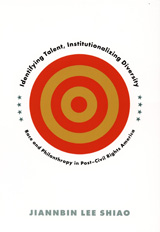 Identifying Talent, Institutionalizing Diversity: Race and Philanthropy in Post-Civil Rights America
Jiannbin Lee Shiao
Duke University Press, 2005 “Diversity” has become a mantra in corporate boardrooms, higher education, and government hiring and contracting. In Identifying Talent, Institutionalizing Diversity, Jiannbin Lee Shiao explains the leading role that large philanthropies have played in establishing diversity as a goal throughout American society in the post–civil rights era. By creating and institutionalizing diversity policies, these private organizations have quietly transformed the practice of affirmative action. Shiao describes how, from the 1960s through the 1990s, philanthropies responded to immigration, the recognition of nonblack minority groups, and the conservative backlash against affirmative action. He shows that these pressures not only shifted discourse and practice within philanthropy away from a binary black-white conception of race but also dovetailed with a change in its mission from supporting “good causes” to “identifying talent.” Based on three years of research on the racial and ethnic priorities of the San Francisco Foundation and the Cleveland Foundation, Shiao demonstrates the geographically uneven impact of the national transition to diversification. The demographics of the regions served by the foundations in San Francisco and Cleveland are quite different, and paradoxically, the foundation in Cleveland—which serves an area with substantially fewer immigrants—has had greater institutional opportunities for implementing diversity policies. Shiao connects these regional histories with the national philanthropic field by underscoring the prominent role of the Ford Foundation, the third largest private foundation in the country, in shaping diversity policies. Identifying Talent, Institutionalizing Diversity reveals philanthropic diversity policy as a lens through which to focus on U.S. race relations and the role of the private sector in racial politics.
Identifying the Pathogen
Jennifer Militello
Tupelo Press, 2026 A hybrid collection blending historical research and contemporary essays to consider the nature of oppressive marriage and gender inequity.
Composed as a lab notebook recording various surgeries, autopsies, and experiments, Identifying the Pathogen tells the story of a scientist on an obsessive quest to document an ailment that resists classification. The book considers the body in response to the COVID-19 pandemic, woven through with the story of Anna Morandi Manzolini—an eighteenth-century Italian anatomist and artist who struggled to support a husband suffering from depression—as well as several essays detailing accounts of a ruptured appendix, a splintered cello, and an ill-fated rock climbing excursion.
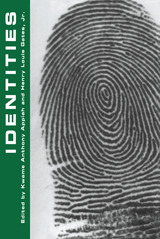 Identities
Edited by Kwame Anthony Appiah and Henry Louis Gates Jr.
University of Chicago Press, 1995 The study of identity crosses all disciplinary borders to address such issues as the multiple interactions of race, class, and gender in feminist, lesbian, and gay studies, postcolonialism and globalization, and the interrelation of nationalism and ethnicity in ethnic and area studies. Identities will help disrupt the cliché-ridden discourse of identity by exploring the formation of identities and problem of subjectivity.
Leading scholars in literary criticism, anthropology, sociology, and philosophy explore such topics as "Gypsies" in the Western imagination, the mobilization of the West in Chinese television, the lesbian identity and the woman's gaze in fashion photography, and the regulation of black women's bodies in early 20th-century urban areas. This collection of twenty articles brings together the special issue of Critical Inquiry entitled "Identities" (Summer 1992), two other previously published essays, and five previously published critical responses and rejoinders, all of which is interrogated in two new essays by Michael Gorra and Judith Butler.
Contributors include Elizabeth Abel, Kwame Anthony Appiah, Akeel Bilgrami, Daniel Boyarin, Jonathan Boyarin, Judith Butler, Hazel V. Carby, Xiaomei Chen, Diana Fuss, Henry Louis Gates, Jr., Avery Gordon, Michael Gorra, Cheryl Herr, Saree S. Makdisi, Walter Benn Michaels, Christopher Newfield, Gananath Obeyesekere, Molly Anne Rothenberg, Gayatri Chakravorty Spivak, Sara Suleri, Katie Trumpener, and Joseph Valente.
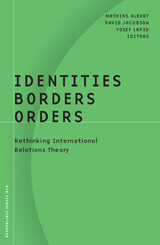 Identities, Borders, Orders: Rethinking International Relations Theory
Mathias Albert
University of Minnesota Press, 2001 An interdisciplinary exploration of the role of sovereignty, national identity, and borders in international politics. Political Science An interdisciplinary exploration of the role of sovereignty, national identity, and borders in international politics.Informed by current debates in social theory, Identities, Borders, Orders brings together a multinational group of respected scholars to seek and encourage imaginative adaptations and recombinations of concepts, theories, and perspectives across disciplinary lines. These contributors take up a variety of substantive, theoretical, and normative issues such as migration, nationalism, citizenship, human rights, democracy, and security. Together, their essays contribute significantly to our understanding of sovereignty, national identity, and borders. Contributors: Didier Bigo, Institut d’Etudes Politiques de Paris; Lothar Brock, U of Frankfurt am Main; Chris Brown, London School of Economics; Neil Harvey, New Mexico State U; Martin O. Heisler, U of Maryland; Rey Koslowski, Rutgers U; Friedrich Kratochwil, Ludwig Maximilians U, Munich; Ronnie D. Lipschutz, UC Santa Cruz; Richard W. Mansbach, Iowa State U; David Newman, Ben Gurion U of the Negev, Israel; Antje Wiener, Queen’s U of Belfast; and Frankie Wilmer, Montana State U.
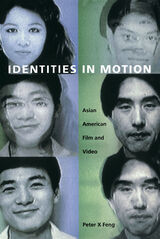 Identities in Motion: Asian American Film and Video
Peter X Feng
Duke University Press, 2002 This innovative book shows how Asian American filmmakers and videomakers frame and are framed by history—how they define and are defined by cinematic projections of Asian American identity. Combining close readings of films and videos, sophisticated cultural analyses, and detailed production histories that reveal the complex forces at play in the making and distributing of these movies, Identities in Motion offers an illuminating interpretative framework for assessing the extraordinary range of Asian American films produced in North America.
Peter X Feng considers a wide range of works—from genres such as detective films to romantic comedies to ethnographic films, documentaries, avant-garde videos, newsreels, travelogues, and even home movies. Feng begins by examining movies about three crucial moments that defined the American nation and the roles of Asian Americans within it: the arrival of Chinese and Japanese women in the American West and Hawai’i; the incorporation of the Philippines into the U.S. empire; and the internment of Japanese Americans during World War II. In subsequent chapters Feng discusses cinematic depictions of ideological conflicts among Asian Americans and of the complex forces that compel migration, extending his nuanced analysis of the intersections of sexuality, ethnicity, and nationalist movements.
Identities in Motion illuminates the fluidity of Asian American identities, expressing the diversity and complexity of Asian Americans—including Filipinos, Indonesians, Chinese, Japanese, Vietnamese, Laotians, Indians, and Koreans—from the nineteenth to the twenty-first century.
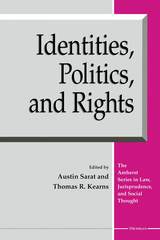 Identities, Politics, and Rights
Austin Sarat and Thomas R. Kearns, Editors
University of Michigan Press, 1997 The subject of rights occupies a central place in liberal political thought. This tradition posits that rights are entitlements of individuals by virtue of their personhood and that rights stand apart from politics, that rights in fact hold at bay intrusions of state policy. The essays in Identities, Politics, and Rights question these assumptions and examine how rights constitute us as subjects and are, at the same time, implicated in political struggles. In contrast to the liberal notion of rights' universality, these essays emphasize the context-specific nature of rights as well as their constitutive effects.
Recognizing that political disputes throughout the world have increasingly been cast as arguments about rights, the essays in this volume examine the varied roles that rights play in political movements and contests. They argue that rights talk is used by many different groups primarily because of its fluidity. Certainly rights can empower individuals and protect them from their societies, but they also constrain them in other areas. Frequently, empowerment for one group means disabling rights for another group. Moreover, focusing on rights can both liberate and limit the imagination of the possible. By alerting us to this paradox of rights--empowerment and limitation--Identities, Politics, and Rights illuminates ongoing challenges to rights and reminds us that rights can both energize political engagement and provide a resource for defenders of the status quo.
Contributors are Richard Abel, Bruce Ackerman, Wendy Brown, John Comaroff, Drucilla Cornell, Jane Gaines, Thomas R. Kearns, Elizabeth Kiss, Kirstie McClure, Sally Merry, Martha Minow, Austin Sarat, and Steven Shiffrin.
Austin Sarat is William Nelson Cromwell Professor of Jurisprudence and Political Science, Amherst College. Thomas R. Kearns is William H. Hastie Professor of Philosophy, Amherst College.
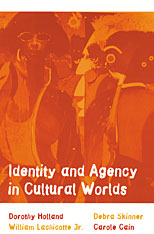 Identity and Agency in Cultural Worlds
Dorothy Holland; William S. Lachicotte, Jr.; Debra Skinner; and Carole Cain
Harvard University Press, 2001 This landmark book addresses the central problem in anthropological theory today: the paradox that humans are products of social discipline yet producers of remarkable improvisation.
Synthesizing theoretical contributions by Vygotsky, Bakhtin and Bourdieu, Holland and her co-authors examine the processes by which people are constituted as agents as well as subjects of culturally constructed, socially imposed worlds. They develop a theory of self-formation in which identities become the pivot between discipline and agency: turning from experiencing one's scripted social positions to making one's way into cultural worlds as a knowledgeable and committed participant. They emphasize throughout that "identities" are not static and coherent, but variable, multivocal and interactive.
Ethnographic illumination of this complex theoretical construction comes from vividly described fieldwork in vastly different microcultures: American college women "caught" in romance; persons in U.S. institutions of mental health care; members of Alcoholics Anonymous groups; and girls and women in the patriarchal order of Hindu villages in central Nepal.
Ultimately, Identity and Agency in Cultural Worlds offers a liberating yet tempered understanding of agency, for it shows how people, across the limits of cultural traditions and social forces of power and domination, improvise and find spaces to re-describe themselves, creating their cultural worlds anew.
Identity and Difference
Martin Heidegger
University of Chicago Press, 2002 Identity and Difference consists of English translations and the original German versions of two little-known lectures given in 1957 by Martin Heidegger, "The Principle of Identity" and "The Onto-theo-logical Constitution of Metaphysics." Both lectures discuss the difficult problem of the nature of identity in the history of metaphysics. A helpful introduction and a list of references are also provided by the translator, Joan Stambaugh.
Identity and Ethnicity in the Rural South: A Sociolinguistic View through Past and Present Be, Volume 74
Kirk Hazen
Duke University Press PADS #83
Identity and Ethnicity in the Rural South investigates the interaction of cultural and ethnic identity as realized in language variation. Through the quantitative and qualitative analysis of sociolinguistic data on the past tense of the verb be and on its absence, this work explains the synchronic and diachronic trends of language variation and several important social factors, including ethnicity, sex, and cultural identity. This volume also informs the debates about the origins and contemporary synchronic relations of African American Vernacular English to other ethnic varieties.
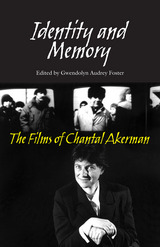 Identity And Memory: The Films of Chantal Akerman
Edited by Gwendolyn Audrey Foster
Southern Illinois University Press, 2003 Considered to be one of the most influential auteurs in French cinema today, Chantal Akerman has had a profound impact on both feminist filmmaking discourse and avant-garde film. She has shown herself to be an uncompromising and dedicated practitioner of the cinematic arts in works such as I…You…He…She (Je tu il elle,1974); Jeanne Dielman, 23 quai du Commerce, 1080 Bruxelles (1975); Meetings with Anna (Les Rendez-vous d’Anna,1978); American Stories/Food, Family, and Philosophy (Histoires d’Amérique,1989); and From the East (D’Est,1993). Akerman has continued to create new and unexpected films that explore ideas about image, gaze, space, performance, and narration. This collection of essays edited by Gwendolyn Audrey Foster assesses Akerman’s wide-ranging oeuvre, particularly her exploration of identity and memory, and considers her development as an artist and as a social force. Along with a detailed filmography and bibliography, both compiled by Foster, ten of the key figures in contemporary feminist moving-image discourse explore the themes with which Akerman is preoccupied: sexuality and lesbian identity, subjectivity, alterity, quotidian reality, the mother-daughter relationship, and Jewish diasporic identity. The contributors include Maureen Turim, Sandy Flitterman-Lewis, Jennifer M. Barker, Ivone Margulies, Catherine Fowler, Janet Bergstrom, Ginette Vincendeau, Gwendolyn Audrey Foster, Judith Mayne, and Kristine Butler. Originally published in the United Kingdom by Flicks Books, this marks the first United States edition of Identity and Memory: The Films of Chantal Akerman.
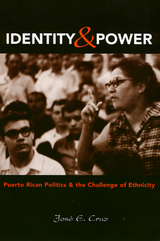 Identity And Power: Puerto Rican Politics and the Challenge of Ethnicity
José E. Cruz
Temple University Press, 1998 On the surface, identity politics appears to promote polarization. To the contrary, political scientist Jose E. Cruz argues that, instead, fragmentation and instability are more likely to occur only when the differences are ignored and nonethnic strategies are employed. Cruz illustrates his claim by focusing on one group of Puerto Ricans and how they mobilized to demand accountability from political leaders in Hartford, Connecticut.
The activities of the Puerto Rican Political Action Committee from 1983 to 1991 illustrate the power of ethnic mobilization and strategy in an urban setting. Cruz examines their insistence on their right to be included in the political process in the context of both a typical mid-sized American city and the unique attributes of Hartford's predominantly white-collar population. At the same time, this study acknowledges the limitations of the exercise of such power in the political process.
Through extensive interviews Cruz brings to light the variety of ways in which politicians and political activists themselves view their own activities and achievements. This group of Puerto Rican activists attempted to penetrate the power structure of Hartford. Though their success was limited, their work constitutes a springboard for further change.
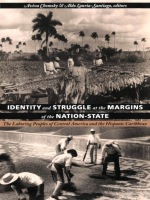 Identity and Struggle at the Margins of the Nation-State: The Laboring Peoples of Central America and the Hispanic Caribbean
Aviva Chomsky and Aldo Lauria-Santiago, eds.
Duke University Press, 1998 Identity and Struggle at the Margins of the Nation-State brings together new research on the social history of Central America and the Spanish-speaking Caribbean during the late nineteenth and early twentieth centuries. Aviva Chomsky and Aldo A. Lauria Santiago have gathered both well-known and emerging scholars to demonstrate how the actions and ideas of rural workers, peasants, migrants, and women formed an integral part of the growth of the export economies of the era and to examine the underacknowledged impact such groups had on the shaping of national histories. Responding to the fact that the more common, elite-centered “national” histories distort or erase the importance of gender, race, ethnicity, popular consciousness, and identity, contributors to this volume correct this imbalance by moving these previously overlooked issues to the center of historical research and analysis. In so doing, they describe how these marginalized working peoples of the Hispanic Caribbean Basin managed to remain centered on not only class-based issues but on a sense of community, a desire for dignity, and a struggle for access to resources. Individual essays include discussions of plantation justice in Guatemala, highland Indians in Nicaragua, the effects of foreign corporations in Costa Rica, coffee production in El Salvador, banana workers in Honduras, sexuality and working-class feminism in Puerto Rico, the Cuban sugar industry, agrarian reform in the Dominican Republic, and finally, potential directions for future research and historiography on Central America and the Caribbean. This collection will have a wide audience among Caribbeanists and Central Americanists, as well as students of gender studies, and labor, social, Latin American, and agrarian history. Contributors. Patricia Alvarenga, Barry Carr, Julie A. Charlip, Aviva Chomsky, Dario Euraque, Eileen Findlay, Cindy Forster, Jeffrey L. Gould, Lowell Gudmundson, Aldo A. Lauria Santiago, Francisco Scarano, Richard Turits
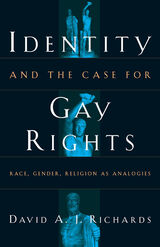 Identity and the Case for Gay Rights: Race, Gender, Religion as Analogies
David A. J. Richards
University of Chicago Press, 1999 How should we chart a course toward legal recognition of gay rights as basic human rights? In this enlightening study, legal scholar David Richards explores the connections between gay rights and three successful civil rights movements—black civil rights, feminism, and religious toleration—to determine how these might serve as analogies for the gay rights movement.
Richards argues that racial and gender struggles are informative but partial models. As in these movements, achieving gay rights requires eliminating unjust stereotypes and allowing one's identity to develop free from intolerant views. Richards stresses, however, that gay identity is an ethical choice based on gender equality. Thus the right to religious freedom offers the most compelling analogy for a gay rights movement because gay identity should be protected legally as an ethical decision of conscience.
A thoughtful and highly original voice in the struggle for gay rights, David Richards is the first to argue that discrimination is like religious intolerance-denial of full humanity to individuals because of their identity and moral commitments to gender equality.
 Identity and the Failure of America: From Thomas Jefferson to the War on Terror
John Michael
University of Minnesota Press, 2008 From Thomas Jefferson to John Rawls, justice has been at the center of America’s self-image and national creed. At the same time, for many of its peoples-from African slaves and European immigrants to women and the poor-the American experience has been defined by injustice: oppression, disenfranchisement, violence, and prejudice. In Identity and the Failure of America, John Michael explores the contradictions between a mythic national identity promising justice to all and the realities of a divided, hierarchical, and frequently iniquitous history and social order. Through a series of insightful readings, Michael analyzes such cultural moments as the epic dramatization of the tension between individual ambition and communal complicity in Moby-Dick, attempts to effect social change through sympathy in the novels of Lydia Marie Child and Harriet Beecher Stowe, Ralph Waldo Emerson’s antislavery activism and Frederick Douglass’s long fight for racial equity, and the divisive figures of John Brown and Nat Turner in American letters and memory. Focusing on exemplary instances when the nature of the United States as an essentially conflicted nation turned to force, Michael ultimately posits the development of a more cosmopolitan American identity, one that is more fully and justly imagined in response to the nation’s ethical failings at home and abroad. John Michael is professor of English and of visual and cultural studies at the University of Rochester. He is the author of Anxious Intellects: Academic Professionals, Public Intellectuals, and Enlightenment Values and Emerson and Skepticism: The Cipher of the World.
 Identity and the Second Generation: How Children of Immigrants Find Their Space
Faith G. Nibbs
Vanderbilt University Press, 2015 Most recently, Americans have become familiar with the term "second generation" as it's applied to children of immigrants who now find themselves citizens of a nation built on the notion of assimilation. This common, worldwide experience is the topic of study in Identity and the Second Generation. These children test and explore the definition of citizenship and their cultural identity through the outlets provided by the Internet, social media, and local community support groups. All these factors complicate the ideas of boundaries and borders, of citizenship, and even of home. Indeed, the second generation is a global community and endeavors to make itself a home regardless of state or citizenship.
This book explores the social worlds of the children of immigrants. Based on rich ethnographic research, the contributors illustrate how these young people, the so-called second generation, construct and negotiate their lives. Ultimately, the driving question is profoundly important on a universal level: How do these young people construct an identity and a sense of belonging for themselves, and how do they deal with processes of inclusion and exclusion?
 Identity Complex: Making the Case for Multiplicity
Michael Hames-García
University of Minnesota Press, 2011 In seemingly exhaustive arguments about identity as a category of analysis, we have made a critical error—one that Michael Hames-García sets out to correct in this revisionary look at the making and meaning of social identities. We have asked how separate identities—of race, class, ethnicity, gender, and sexuality—come to intersect. Instead, Hames-García proposes, we should begin by understanding such social identities as mutually constituting one another. Grounded in both theoretical and political practices—in the lived realities of people’s experience—Identity Complex reinvigorates identity as a key concept and as a tool for the pursuit of social justice. Hames-García draws on a wide range of examples to show that social identities are central to how exploitation works, such as debates about the desirability of sexual minority identities in postcolonial contexts, questions about the reality of race, and the nature of the U.S. prison crisis. Unless we understand precisely how identities take shape in relation to each other and within contexts of oppression, he contends, we will never be able to eradicate discrimination and social inequality. By analyzing the social interdependence of identities, Hames-García seeks to enable the creation of deep connections of solidarity across differences.
 Identity Crises: A Social Critique Of Postmodernity
Robert G. Dunn
University of Minnesota Press, 1998 A readable analysis of postmodernity that provides a cultural context for its rise. Though the term “postmodern” looms large on our cultural landscape, rarely do we find a systematic and impartial discussion of the circumstances of its ascendance. Identity Crises offers just such an accounting. In this book, Robert G. Dunn situates the intellectual currency of “the postmodern” within the larger context of social and cultural change shaping the movement over the past several decades. Along the way, he offers a necessary corrective to both the sociological and historical shortcomings of cultural criticism and the cultural myopia of social science in considering the postmodern world. Dunn explains contemporary culture and contemporary cultural criticism as part of a distinct historical moment, one that entails new social relations as a consequence of new means of production. In place of prevailing cultural and political constructions, Dunn proposes a “social relational” approach that explicitly recognizes the structural and situational contexts of identity formation. He conceptualizes issues of identity and difference in terms of social, cultural, and political transformations in the transition from modern to postmodern society. This provides a socio-historical perspective through which to consider the impact of consumption, mass media, globalization, and new social movements on identity-forming processes. Unique to this undertaking and crucial to Dunn’s critique of poststructuralist and postmodern theories is his application of the theory of George Herbert Mead as a more effective means of theorizing identity and difference. Dunn’s focus on postmodernity as opposed to postmodernism serves to ground the analysis of identity and difference materially and socially. Learned, evenhanded, and enlightening, Identity Crises is an essential demonstration of the connections between cultural theory and criticism, contemporary culture, and sociological analysis. ISBN 0-8166-3072-0 Cloth $49.95xxISBN 0-8166-3073-9 Paper $19.95x304 pages 5 7/8 x 9 MarchTranslation inquiries: University of Minnesota Press
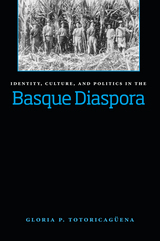 Identity, Culture, And Politics In The Basque Diaspora
Gloria Pilar Totoricagüena
University of Nevada Press, 2015 Gloria P. Totoricagüena presents a thorough comparative examination of the remarkable endurance of Basque identity and culture in six countries of the far-flung Basque diaspora. Using the results of interviews and extensive anonymous surveys with more than eight hundred informants in the diaspora, plus extensive research in archives and printed sources in all six of her study countries, Totoricagüena reveals for the first time the complex and interrelated universe of these dispersed Basques. She explores the elements of their migration patterns and the institutions that have encouraged identity maintenance, the impacts on established communities of each new wave of immigrants, and the nature of economic and political ties with the homeland.
Totoricagüena offers a superb quantitative study of an aspect of Basque culture that has been largely ignored by scholars—the diaspora. In doing so, she enlarges the understanding of cultural identity in general—how it is defined and preserved, how it evolves over time, and how both the politics of distant places and the most intimate family habits can shape an individual’s sense of self. Identity, Culture, and Politics in the Basque Diaspora is a major contribution to the knowledge of Basques and their persistent political and cultural traditions.
 Identity Designs: The Sights and Sounds of a Nation
Karen A Cerulo
Rutgers University Press, 1995 National symbols, modern totems with ancient roots, remain entities for which men and women continue to march, debate, fight, and die. Modern political leaders still drape their campaigns in such symbols; modern revolutionaries still defile them. Identity Designs explores the source of this long-standing power––the way national symbols are selected, the manner in which their meaning is conveyed, their potential effects, and the sustenance of their power.
In particular, the book charts the role of design in the selection of symbolic images, thus demonstrating that symbols are chosen not just for what they convey, but how they convey their message. Karen Cerulo shows that the symbolic designs of a nation's identity are not simply the products of indigenous characteristics, as conventional wisdom might suggest. Rather, the banners and songs by which nations represent themselves are generated by broad social forces that transcend the peculiarities of any one nation. Cerulo's analysis acquaints readers with a set of social structural factors that delimit rules of symbolic expression. Further, the book suggests the benefits of adhering to these rules and explores the costs of violating them.
Identity Destabilised: Living in an Overheated World
Edited by Thomas Hylland Eriksen and Elisabeth Schober
Pluto Press, 2016 We are living in a new epoch: the Anthropocene, where the world is overheated by human activity, driven too fast and filled too full, uneven and unequal. This collection explores the question of identity in this new world, looking at the consequences of rapidly accelerating change on social and personal identities and providing a concrete set of perspectives on how people conceive their selves and belonging in the twenty-first century. Featuring examinations of the Phiippines, Israel, Australia, the Cape Verde Islands, and Afghanistan, the book studies changes generated by rapid industrialization, forced return of migrants, sudden population growth, and the touristification of local cultures.
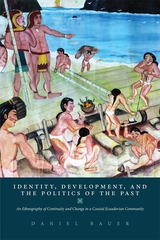 Identity, Development, and the Politics of the Past: An Ethnography of Continuity and Change in a Coastal Ecuadorian Community
Bauer
University Press of Colorado, 2018 Combining personal narrative and ethnography, Identity, Development, and the Politics of the Past examines cultural change in a rural Ecuadorian fishing village where the community has worked to stake claim to an Indigenous identity in the face of economic, social, and political integration. By documenting how villagers have reconstructed their identity through the use of archaeology and political demarcation of territory, author Daniel Bauer shows that ethnicity is part of a complex social matrix that involves politics, economics, and history.
Residents in the coastal community of Salango pushed for formal recognition of Indigenous identity while highlighting their pre-Hispanic roots in order to make claims about cultural continuity and ancestrality. Bauer considers the extent to which the politics of identity is embedded in the process of community-based development, paying close attention to how local conceptions of identity and residents’ ideas about their own identity and the identities of others fit within the broader context of Ecuadorian and Latin American notions of mestizaje. He emphasizes ethnogenesis and the fluid nature of identity as residents reference prehistory and the archaeological record as anchor points for claims to an Indigenous ethnic identity.
Identity, Development, and the Politics of the Past moves beyond existing studies that center on questions of authenticity and instead focuses on the ways people make claims to identity. This book makes a significant contribution to the growing body of literature on the Ecuadorian coast and directs scholars who focus on Ecuador to expand their focus beyond the highland and Amazonian regions. It will be of interest to students and scholars of Latin American studies, anthropology, ethnology, economic development, and ethnic identity.
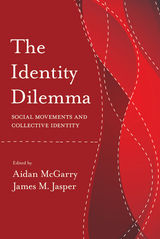 The Identity Dilemma: Social Movements and Collective Identity
Aidan McGarry
Temple University Press, 2015 Collective identities are politically necessary, or at least useful, as banners for recruiting others and engaging opponents and the state. However, not every member fits or accepts the label in the same way or to the same degree. The Identity Dilemma provides eight diverse case studies of social movements to show the benefits, risks, and tradeoffs when a group develops a strong sense of collective identity.
The editors and contributors to this pathbreaking volume examine how collective identities can provide powerful advantages but also generate conflicts. The various chapters help to develop our understanding of collective identity from how strategic identities are developed for protest groups to how stigmatized groups negotiate identity dilemmas.
Ultimately, The Identity Dilemma contributes a new strategic approach to understanding social movements that highlights the choices and tensions that groups inevitably face in articulating their ideas and interests.
Contributors include: Marian Barnes, Cristina Flesher Fominaya, Umut Korkut, Elzbieta Korolczuk, John Nagle, Clare Saunders, Neil Stammers, Marisa Tramontano, Huub Van Baar, and the editors.
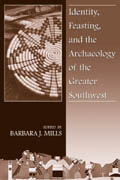 Identity, Feasting, and the Archaeology of the Greater Southwest
Barbara J. Mills
University Press of Colorado, 2004 With contributions from sociocultural and linguistic anthropologists as well as archaeologists, this volume is the first to present case studies of social identity and feasting from throughout the Greater Southwest. A section of the book is also devoted to a synthesis and set of case studies on the archaeology of the pivotal Mexican State of Chihuahua. Unlike many previous studies, the authors of this volume place emphasis on how differences within and between societies came about rather than why dissimilar structures arose, elevating the place of both agency and history in understanding the past. Identity, Feasting, and the Archaeology of the Greater Southwest will be of interest to all doing archaeological research in the Southwestern United States and those conducting research on social identity, cultural affiliation, and commensal politics. Contributors include Karen R. Adams, Jeffrey J. Clark, Patricia L. Crown, T. J. Ferguson, Catherine S. Fowler, Robert J. Hard, Jane H. Hill, Jane H. Kelley, Frances Levine, Micah Loma'omvaya, K. Tsianina Lomawaima, A. C. MacWilliams, Paul E. Minnis, Scott G. Ortman, David Phillips Jr., James M. Potter, John R. Roney, Lynne Sebastian, Katherine A. Spielmann, Joe D. Stewart, Scott Van Keuren, Laurie D. Webster, Michael E. Whalen, and W. H. Wills
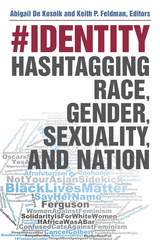 #identity: Hashtagging Race, Gender, Sexuality, and Nation
Abigail De Kosnik and Keith P. Feldman, editors
University of Michigan Press, 2019 Since its launch in 2006, Twitter has served as a major platform for political performance, social justice activism, and large-scale public debates over race, ethnicity, gender, sexuality, and nationality. It has empowered minoritarian groups to organize protests, articulate often-underrepresented perspectives, and form community. It has also spread hashtags that have been used to bully and silence women, people of color, and LGBTQ people.
#identity is among the first scholarly books to address the positive and negative effects of Twitter on our contemporary world. Hailing from diverse scholarly fields, all contributors are affiliated with The Color of New Media, a scholarly collective based at the University of California, Berkeley. The Color of New Media explores the intersections of new media studies, critical race theory, gender and women’s studies, and postcolonial studies. The essays in #identity consider topics such as the social justice movements organized through #BlackLivesMatter, #Ferguson, and #SayHerName; the controversies around #WhyIStayed and #CancelColbert; Twitter use in India and Africa; the integration of hashtags such as #nohomo and #onfleek that have become part of everyday online vernacular; and other ways in which Twitter has been used by, for, and against women, people of color, LGBTQ, and Global South communities. Collectively, the essays in this volume offer a critically interdisciplinary view of how and why social media has been at the heart of US and global political discourse for over a decade.
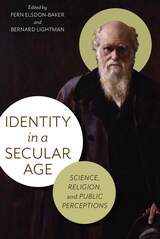 Identity in a Secular Age: Science, Religion, and Public Perceptions
Fern Elsdon-Baker and Bernard Lightman
University of Pittsburgh Press, 2020 Although historians have suggested for some time that we move away from the assumption of a necessary clash between science and religion, the conflict narrative persists in contemporary discourse. But why? And how do we really know what people actually think about evolutionary science, let alone the many and varied ways in which it might relate to individual belief? In this multidisciplinary volume, experts in history and philosophy of science, oral history, sociology of religion, social psychology, and science communication and public engagement look beyond two warring systems of thought. They consider a far more complex, multifaceted, and distinctly more interesting picture of how differing groups along a spectrum of worldviews—including atheistic, agnostic, and faith groups—relate to and form the ongoing narrative of a necessary clash between evolution and faith. By ascribing agency to the public, from the nineteenth century to the present and across Canada and the United Kingdom, this volume offers a much more nuanced analysis of people’s perceptions about the relationship between evolutionary science, religion, and personal belief, one that better elucidates the complexities not only of that relationship but of actual lived experience.
Identity in the Middle Ages: Approaches from Southwestern Europe
Flocel Sabaté
Arc Humanities Press, 2021 This book places identity at the centre of a project to better understand medieval society. By exploring the multiplicity of personal identities, the ways in which these were expressed within particular social structures (such as feudalism), and their evolution into formal expressions of collective identity (municipalities, guilds, nations, and so on) we can shed new light on the Middle Ages. A specific legacy of such developments was that by the end of the Middle Ages, a sense of national identity, supported by the late medieval socio-economic structure, backed in law and by theological, philosophical, and political thought, defined society. What is more, social structures coalesced across diverse elements, including language, group solidarities, and a set of assumed values.
Identity, Language, and Mind: An Introduction to the Philosophy of John Perry
Edited by Albert Newen and Raphael van Riel
CSLI, 2012 As one of the world’s most eminent living philosophers, John Perry has covered a remarkable breadth of subjects in his published work, including semantics, indexicality, self-knowledge, personal identity, and consciousness. Looking particularly at the way in which he deals with issues of self, communication, and reality, this volume is organized in seven chapters that highlight a different aspect of Perry’s work on the intersection of these subjects. A fundamental work for students and scholars, Identity, Language, and Mind explores questions that are not only essential in understanding Perry’s writings, but also contemporary philosophy as a whole.
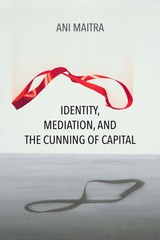 Identity, Mediation, and the Cunning of Capital
Ani Maitra
Northwestern University Press, 2020 In Identity, Mediation, and the Cunning of Capital, Ani Maitra urgently calls for a reevaluation of identity politics as an aesthetic maneuver regulated by capitalism. A dominant critical trend in the humanities, Maitra argues, is to dismiss or embrace identity through the formal properties of a privileged aesthetic medium such as literature, cinema, or even the performative body. In contrast, he demonstrates that identity politics becomes unavoidably real and material only because the minoritized subject is split between multiple sites of mediation—visual, linguistic, and sonic—while remaining firmly tethered to capitalism’s hierarchical logic of value production. Only in the interstices of media can we track the aesthetic conversion of identitarian difference into value, marked by the inequities of race, class, gender, and sexuality.
Maitra’s archive is transnational and multimodal. Moving from anticolonial polemics to psychoanalysis to diasporic experimental literature to postcolonial feminist and queer media, he lays bare the cunning by which capitalism produces and fragments identity through an intermedial “aesthetic dissonance” with the commodity form. Maitra’s novel contribution to theories of identity and to the concept of mediation will interest a wide range of scholars in media studies, critical race and postcolonial studies, and critical aesthetics.
The Identity of Israel’s God in Christian Scripture
Don Collett
SBL Press, 2021 A broad, sweeping volume that breaches the walls separating biblical and theological disciplines
Biblical scholars and theologians engage an important question: Who is Israel’s God for Christian readers of the Old Testament? For Christians, Scripture is the Old and New Testament bound together in a single legacy. Contributors approach the question from multiple disciplinary vantage points. Essays on both Testaments focus on figural exegesis, critical exegesis, and the value of diachronic understandings of the Old Testament’s compositional history for the sake of a richer synchronic reading. This collection is offered in celebration of the life and work of Christopher R. Seitz. His rich and wide-ranging scholarly efforts have provided scholars and students alike a treasure trove of resources related to this critical question.
 Identity Papers: Contested Nationhood in Twentieth-Century France
Steven Ungar and Tom Conley, Editors
University of Minnesota Press, 1996 Identity Papers was first published in 1996. Minnesota Archive Editions uses digital technology to make long-unavailable books once again accessible, and are published unaltered from the original University of Minnesota Press editions. What does citizenship mean? What is the process of "naturalization" one goes through in becoming a citizen, and what is its connection to assimilation? How do the issues of identity raised by this process manifest themselves in culture? These questions, and the way they arise in contemporary France, are the focus of this diverse collection. The essays in this volume range in subject from fiction and essay to architecture and film. Among the topics discussed are the 1937 Exposition Universelle; films dealing with Vichy France; François Truffaut's Histoire d'Adèle H.; the war of Algerian independence; and nation building under François Mitterrand. Contributors: Anne Donadey, Elizabeth Ezra, Richard J. Golsan, Lynn A. Higgins, T. Jefferson Kline, Panivong Norindr, Shanny Peer, Rosemarie Scullion, David H. Slavin, Philip H. Solomon; Florianne Wild, . Steven Ungar is professor of cinema and comparative literature at the University of Iowa and author of Scandal and Aftereffect: Blanchot and France since 1930 (Minnesota, 1995). Tom Conley is professor of French at Harvard University.
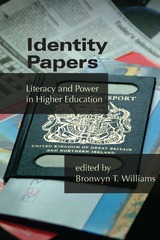 Identity Papers: Literacy and Power in Higher Education
edited by Bronwyn T. Williams
Utah State University Press, 2006 How do definitions of literacy in the academy, and the pedagogies that reinforce such definitions, influence and shape our identities as teachers, scholars, and students? The contributors gathered here reflect on those moments when the dominant cultural and institutional definitions of our identities conflict with our other identities, shaped by class, race, gender, sexual orientation, location, or other cultural factors. These writers explore the struggle, identify the sources of conflict, and discuss how they respond personally to such tensions in their scholarship, teaching, and administration. They also illustrate how writing helps them and their students compose alternative identities that may allow the connection of professional identities with internal desires and senses of self. They emphasize how identity comes into play in education and literacy and how institutional and cultural power is reinforced in the pedagogies and values of the writing classroom and writing profession.
 Identity, Place, and Subversion in Contemporary Mizrahi Cinema in Israel
Yaron Shemer
University of Michigan Press, 2013 In Identity, Place, and Subversion in Contemporary Mizrahi Cinema in Israel, Yaron Shemer presents the most comprehensive and systematic study to date of Mizrahi (Oriental-Jewish or Arab-Jewish) films produced in Israel in the last several decades. Through an analysis of dozens of films the book illustrates how narratives, characters, and space have been employed to give expression to Mizrahi ethnic identity and to situate the Mizrahi within the broader context of the Israeli societal fabric. The struggle over identity and the effort to redraw ethnic boundaries have taken place against the backdrop of a long-standing Zionist view of the Mizrahi as an inferior other whose “Levantine” culture posed a threat to the Western-oriented Zionist enterprise. In its examination of the nature and dynamics of Mizrahi cinema (defined by subject-matter), the book engages the sensitive topic of Mizrahi ethnicity head-on, confronting the conventional notion of Israeli society as a melting pot and the widespread dismissal of ethnic divisions in the country. Shemer explores the continuous marginalization of the Mizrahi in contemporary Israeli cinema and the challenge some Mizrahi films offer to the subjugation of this ethnic group. He also studies the role cultural policies and institutional power in Israel have played in shaping Mizrahi cinema and the creation of a Mizrahi niche in cinema. In a broader sense, this pioneering work is a probing exploration of Israeli culture and society through the prism of film and cinematic expression. It sheds light on the play of ethnicity, class, gender, and religion in contemporary Israel, and on the heated debates surrounding Zionist ideology and identity politics. By charting a new territory of academic inquiry grounded in an interdisciplinary theoretical framework, the study contributes to the formation of “Mizrahi Cinema” as a recognized and vibrant scholarly field.
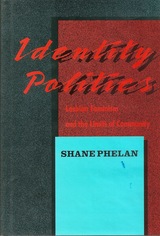 Identity Politics: Lesbian Feminism and the Limits of Community
Shane Phelan
Temple University Press, 1991 "Lesbian feminism began and has fueled itself with the rejection of liberalism.... In this rejection, lesbian feminists were not alone. They were joined by the New Left, by many blacks in the civil rights movement, by male academic theorists.... What all these groups shared was an intense awareness of the ways in which liberalism fails to account for the social reality of the world, through a reliance upon law and legal structure to define membership, through individualism, through its basis in a particular conception of rationality." In tracing how lesbian feminism came to be defined in uneasy relationships with the Women’s Movement and gay rights groups, Shane Phelan explores the tension between liberal ideals of individual rights and tolerance and communitarian ideals of solidarity. The debate over lesbian sado-masochism—an expression of individual choice or pornographic, anti-feminist behavior?—is considered as a test case. Phelan addresses the problems faced by "the woman-identified woman" in a liberal society that presumes heterosexuality as the biological, psychological, and moral standard. Often silenced by laws defining their sexual behavior as criminal and censured by a medical establishment that persists in defining homosexuality as perversion, lesbians, like blacks and other groups, have fought to have the same rights as others in their communities and even in their own homes. Lesbian feminists have also sought to define themselves as a community that would be distinctly different, a community that would disavow the traditional American obsession with individual advancement in the world as it is. In this controversial study of political philosophy and the women’s movement, Phelan argues that "the failure to date to produce a satisfying theory and program for lesbian action is reflective of the failure of modern political thinking to produce a compelling, nonsuspect alternative to liberalism." In the series Women in the Political Economy, edited by Ronnie J. Steinberg.
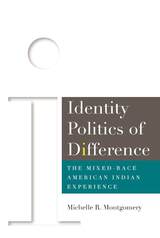 Identity Politics of Difference: The Mixed-Race American Indian Experience
Michelle Montgomery
University Press of Colorado, 2021 In Identity Politics of Difference, author Michelle R. Montgomery uses a multidisciplinary approach to examine questions of identity construction and multiracialism through the experiences of mixed-race Native American students at a tribal school in New Mexico. She explores the multiple ways in which these students navigate, experience, and understand their racial status and how this status affects their educational success and social interactions. Montgomery contextualizes students’ representations of their racial identity choices through the compounded race politics of blood quantum and stereotypes of physical features, showing how varying degrees of "Indianness" are determined by peer groups. Based on in-depth interviews with nine students who identify as mixed-race (Native American–White, Native American–Black, and Native American–Hispanic), Montgomery challenges us to scrutinize how the category of “mixed-race” bears different meanings for those who fall under it based on their outward perceptions, including their ability to "pass" as one race or another. Identity Politics of Difference includes an arsenal of policy implications for advancing equity and social justice in tribal colleges and beyond and actively engages readers to reflect on how they have experienced the identity politics of race throughout their own lives. The book will be a valuable resource to scholars, policy makers, teachers, and school administrators, as well as to students and their families.
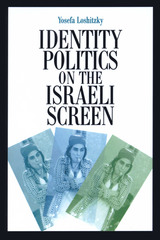 Identity Politics on the Israeli Screen
By Yosefa Loshitzky
University of Texas Press, 2002 2002 — A Choice Outstanding Academic Book The struggle to forge a collective national identity at the expense of competing plural identities has preoccupied Israeli society since the founding of the state of Israel. In this book, Yosefa Loshitzky explores how major Israeli films of the 1980s and 1990s have contributed significantly to the process of identity formation by reflecting, projecting, and constructing debates around Israeli national identity. Loshitzky focuses on three major foundational sites of the struggle over Israeli identity: the Holocaust, the question of the Orient, and the so-called (in an ironic historical twist of the "Jewish question") Palestinian question. The films she discusses raise fundamental questions about the identity of Jewish Holocaust survivors and their children (the "second generation"), Jewish immigrants from Muslim countries or Mizrahim (particularly the second generation of Israeli Mizrahim), and Palestinians. Recognizing that victimhood marks all the identities represented in the films under discussion, Loshitzky does not treat each identity group as a separate and coherent entity, but rather attempts to see the conflation, interplay, and conflict among them.
 Identity Reflections: Pilgrimages to Mount Tai in Late Imperial China
Brian R. Dott
Harvard University Press, 2004 Mount Tai in northeastern China has long been a sacred site. Indeed, it epitomizes China’s religious and social diversity. Throughout history, it has been a magnet for both women and men from all classes—emperors, aristocrats, officials, literati, and villagers. For much of the past millennium, however, the vast majority of pilgrims were illiterate peasants who came to pray for their deceased ancestors, as well as for sons, good fortune, and health.
Each of these social groups approached Mount Tai with different expectations. Each group’s or individual’s view of the world, interpersonal relationships, and ultimate goals or dreams—in a word, its identity—was reflected in its interactions with this sacred site. This book examines the behavior of those who made the pilgrimage to Mount Tai and their interpretations of its sacrality and history, as a means of better understanding their identities and mentalities. It is the first to trace the social landscape of Mount Tai, to examine the mindsets not just of prosperous, male literati but also of women and illiterate pilgrims, and to combine evidence from fiction, poetry, travel literature, and official records with the findings of studies of material culture and anthropology.
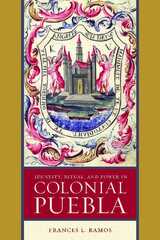 Identity, Ritual, and Power in Colonial Puebla
Frances L. Ramos
University of Arizona Press, 2012 Located between Mexico City and Veracruz, Puebla has been a political hub since its founding as Puebla de los Ángeles in 1531. Frances L. Ramos’s dynamic and meticulously researched study exposes and explains the many (and often surprising) ways that politics and political culture were forged, tested, and demonstrated through public ceremonies in eighteenth-century Puebla, colonial Mexico’s “second city.”
With Ramos as a guide, we are not only dazzled by the trappings of power—the silk canopies, brocaded robes, and exploding fireworks—but are also witnesses to the public spectacles through which municipal councilmen consolidated local and imperial rule. By sponsoring a wide variety of carefully choreographed rituals, the municipal council made locals into audience, participants, and judges of the city’s tumultuous political life. Public rituals encouraged residents to identify with the Roman Catholic Church, their respective corporations, the Spanish Empire, and their city, but also provided arenas where individuals and groups could vie for power.
As Ramos portrays the royal oath ceremonies, funerary rites, feast-day celebrations, viceregal entrance ceremonies, and Holy Week processions, we have to wonder who paid for these elaborate rituals—and why. Ramos discovers and decodes the intense debates over expenditures for public rituals and finds them to be a central part of ongoing efforts of councilmen to negotiate political relationships. Even with the Spanish Crown’s increasing disapproval of costly public ritual and a worsening economy, Puebla’s councilmen consistently defied all attempts to diminish their importance.
Ramos innovatively employs a wealth of source materials, including council minutes, judicial cases, official correspondence, and printed sermons, to illustrate how public rituals became pivotal in the shaping of Puebla’s complex political culture.
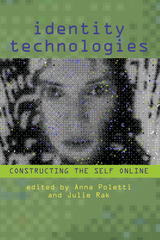 Identity Technologies: Constructing the Self Online
Edited by Anna Poletti and Julie Rak
University of Wisconsin Press, 2013 Identity Technologies is a substantial contribution to the fields of autobiography studies, digital studies, and new media studies, exploring the many new modes of self-expression and self-fashioning that have arisen in conjunction with Web 2.0, social networking, and the increasing saturation of wireless communication devices in everyday life. This volume explores the various ways that individuals construct their identities on the Internet and offers historical perspectives on ways that technologies intersect with identity creation. Bringing together scholarship about the construction of the self by new and established authors from the fields of digital media and auto/biography studies, Identity Technologies presents new case studies and fresh theoretical questions emphasizing the methodological challenges inherent in scholarly attempts to account for and analyze the rise of identity technologies. The collection also includes an interview with Lauren Berlant on her use of blogs as research and writing tools.
Identity Work in Social Movements
Jo Reger
University of Minnesota Press, 2008 Movements for social change are by their nature oppositional, as are those who join change movements. How people negotiate identity within social movements is one of the central concerns in the field.
This volume offers new scholarship that explores issues of diversity and uniformity among social movement participants. Featuring case studies that range widely—from Jewish resistance fighters in Nazi-occupied Poland to antigay Christian movements in the United States to online white supremacy groups—the essays show how participants set aside issues of personal identity in order to merge together and how these processes affect mobilization and the attainment of goals.
Contributors: Mary Bernstein, Kimberly B. Dugan, Elizabeth Kaminski, Susan Munkres, Kevin Neuhouser, Benita Roth, Silke Roth, Todd Schroer, Verta Taylor, Jane Ward.
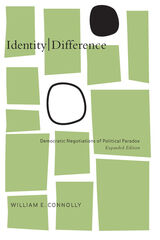 Identity/Difference: Democratic Negotiations of Political Paradox
William E. Connolly
University of Minnesota Press, 2002 A new edition of this classic work on the idea of difference. In this foundational work in contemporary political theory, William Connolly makes a distinctive contribution to our understanding of the relationship between personal identity and democratic politics, particularly in the domains of religion, ethics, sexuality, and ethnicity. Every identity, Connolly argues, whether individual or social, presents us with a fundamental and troubling paradox: an identity establishes itself in relation to a set of differences, and it operates under powerful pressures to fix, regulate, or exclude some of these differences as otherness. The dignity of a people or political regime, and the quality of democratic culture, depends on the acknowledgment and ethos cultivated in response to these pressures. In a substantial new essay, Connolly responds to the heated controversy surrounding his ideas when Identity\Difference was first published in 1991, while augmenting his discussion of the virtues of critical responsiveness. The issues of identity and difference cannot be ignored, he contends, and are ubiquitous in modern life.
Identity's Architect: A Biography of Erik H. Erikson
Lawrence J. Friedman
Harvard University Press Identity's Architect is the first comprehensive biography of Erik Erikson, postwar America's most influential psychological thinker, who decisively reshaped our views of human development.
Drawing on private materials and extensive interviews, award-winning historian Lawrence J. Friedman illuminates the relationship between Erikson's personal life and his groundbreaking notion of the life cycle and the identity crisis. A decade in the making, this book is indispensable for anyone who hopes to understand fully the life and intellectual legacy of one of the most significant figures of our time.
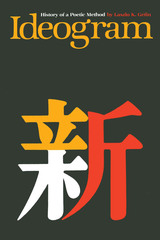 Ideogram: History of a Poetic Method
By Laszlo K. Géfin
University of Texas Press, 1982 The ideogram changed the course of modern American poetry, and Ideogram is the first history of this important poetic tradition. In modern poetry the ideogram is an idea presented to the reader by means of the juxtaposition of concrete particulars, usually without connective words or phrases. The poem is therefore presented in precise images, usually very tersely, and free from conventional form and meter. The idea of presenting a concept in this manner derives in part from Ernest Fenollosa's essay "The Chinese Character as a Medium for Poetry," the Chinese written character itself being a juxtaposition of pictographs to form a new meaning. Ezra Pound's search for an alternative to traditional forms of verse composition resulted in his use of the ideogrammic method which, Laszlo K. Géfin asserts, became the major mode of presentation in twentieth-century American poetry. Two generations of avant-garde, experimental poets since Pound have turned to it for inspiration, evolving their own methods from its principles. Géfin begins by tracing the development of Pound's poetics from the pre-Imagist stage through Imagism and Vorticism to the formulation of the ideogrammic method. He then examines the Objectivist poetics of Louis Zukofsky, Charles Reznikoff, and George Oppen; the contributions to the ideogrammic tradition of William Carlos Williams; and the Projectivist theories of Charles Olson, Robert Duncan, and Robert Creeley. He concludes with an exploration of Allen Ginsberg's theory of the ellipse and Gary Snyder's "riprap" method. Throughout, Géfin maintains that the ideogrammic mode is the literary representation of the twentieth-century post-logical—even post-humanist—world view.
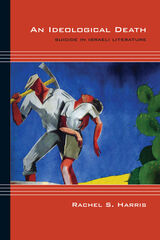 An Ideological Death: Suicide in Israeli Literature
Rachel S. Harris
Northwestern University Press, 2014 An Ideological Death: Suicide in Israeli Literature explores literary challenges to Israel’s national narratives. Many prominent Israeli writers use their fiction to confront the centrality of the army, the mythology of the “new Jew,” the positioning of Tel Aviv as the first Israeli city, and the very process by which a nation’s history is constructed. Yehudit Katzir, Etgar Keret, Amos Oz, Yaakov Shabtai, Benjamin Tammuz, and A. B. Yehoshua are among the writers who engage with depictions of suicide in a critical and rhetorical process that reconsiders myths at the heart of the Zionist project. In Israeli literature, suicide is linked to a society’s compulsion to create impossible ideals that leave its populace disappointed and deluded. Yet, as Rachel S. Harris shows, even at their harshest these writers also acknowledge the idealism that helped build Israel as a modern nation-state.
 The Ideological Origins of African American Literature: From Puritanism to Romanticism
Phillip M. Richards
University of Tennessee Press, 2024 Inquiry into African American literature in recent decades has neglected to probe the intellectual structure of the tradition’s aesthetics and its underlying ideology. In The Ideological Origins of African American Literature, Phillip M. Richards begins this reconstructive work, illuminating the dialectical backstory of black prose and poetry in America. Richards argues that the social and political forces that influenced white literature were uniquely reacted to, absorbed, and often times rejected by African American literary figures—from the eighteenth-century Puritan notions of a God-centered history to the onset of Romanticism and Modernism in the nineteenth and twentieth centuries.
Building his case for ideological continuity, Richards surveys a profoundly creative period of 125 years launched by an African American reaction against a racist, mid-eighteenth-century American culture. This epoch in African American literature saw a fusion of Puritan-Protestant culture into a religious and secular worldview, drawing in the poetry of Phillis Wheatley, antebellum slave narratives, Richard Allen, and the periodicals of the ambitious African Methodist Episcopalian movement—all of which would form the underlying foundation of a Black Victorian culture. A rising black middle class, Richards argues, would later be secularized by an eroding religious tradition under the pressures of nineteenth-century modernity, the trauma of Jim Crow, and the emerging northern ghetto. Richards further traces the emergence of Romanticism which appeared with white American authors such as Emerson, Thoreau, and Whitman, but would not take shape in African American literature until the likes of W.E.B. Du Bois and Langston Hughes took stock of Anglo-European culture at the end of the nineteenth century. The Ideological Origins of African American Literature illustrates a pattern of black writing that eschews the hegemonic white culture of the day for an evolving black culture that would define an American literary landscape.
 The Ideological Origins of American Federalism
Alison L. LaCroix
Harvard University Press, 2011 Federalism is regarded as one of the signal American contributions to modern politics. Its origins are typically traced to the drafting of the Constitution, but the story began decades before the delegates met in Philadelphia.
In this groundbreaking book, Alison LaCroix traces the history of American federal thought from its colonial beginnings in scattered provincial responses to British assertions of authority, to its emergence in the late eighteenth century as a normative theory of multilayered government. The core of this new federal ideology was a belief that multiple independent levels of government could legitimately exist within a single polity, and that such an arrangement was not a defect but a virtue. This belief became a foundational principle and aspiration of the American political enterprise. LaCroix thus challenges the traditional account of republican ideology as the single dominant framework for eighteenth-century American political thought. Understanding the emerging federal ideology returns constitutional thought to the central place that it occupied for the founders. Federalism was not a necessary adaptation to make an already designed system work; it was the system.
Connecting the colonial, revolutionary, founding, and early national periods in one story reveals the fundamental reconfigurations of legal and political power that accompanied the formation of the United States. The emergence of American federalism should be understood as a critical ideological development of the period, and this book is essential reading for everyone interested in the American story.
The Ideological Origins of the American Revolution: Enlarged Edition
Bernard Bailyn
Harvard University Press, 1992 To the original text of what has become a classic of American historical literature, Bernard Bailyn adds a substantial essay, ”Fulfillment,” as a Postscript. Here he discusses the intense, nation-wide debate on the ratification of the Constitution, stressing the continuities between that struggle over the foundations of the national government and the original principles of the Revolution. This detailed study of the persistence of the nation’s ideological origins adds a new dimension to the book and projects its meaning forward into vital present concerns.
 The Ideological Origins of the American Revolution: Fiftieth Anniversary Edition
Bernard Bailyn
Harvard University Press, 2017 The Ideological Origins of the American Revolution, awarded both the Pulitzer and the Bancroft prizes, has become a classic of American historical literature. Hailed at its first appearance as “the most brilliant study of the meaning of the Revolution to appear in a generation,” it was enlarged in a second edition to include the nationwide debate on the ratification of the Constitution, hence exploring not only the Founders’ initial hopes and aspirations but also their struggle to implement their ideas in constructing the national government.
Now, in a new preface, Bernard Bailyn reconsiders salient features of the book and isolates the Founders’ profound concern with power. In pamphlets, letters, newspapers, and sermons they returned again and again to the problem of the uses and misuses of power—the great benefits of power when gained and used by popular consent and the political and social devastation when acquired by those who seize it by force or other means and use it for their personal benefit.
This fiftieth anniversary edition will be welcomed by readers familiar with Bailyn’s book, and it will introduce a new generation to a work that remains required reading for anyone seeking to understand the nation’s historical roots.
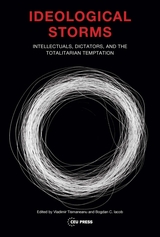 Ideological Storms: Intellectuals, Dictators, and the Totalitarian Temptation
Bogdan C. Iacob
Central European University Press, 2019 This volume gathers authors who wrote important works in the fields of the history of ideologies, the comparative study of dictatorships, and intellectual history. The book is a state of the art reassessment and analysis of the ideological commitments of intellectuals and their relationships with dictatorships during the twentieth century. The contributions focus on turning points or moments of breakage as well as on the continuities. Though its focus is on an East–West comparison in Europe, there are texts also dealing with Latin America, China, and the Middle East giving the book a global outlook. The first part of the book deals with intellectuals' involvement with communist regimes or parties; the second looks at the persistence of utopianism in the trajectory of intellectuals who had been associated earlier in their lives with either communism or fascism; the third tackles intellectuals' role in national imaginations from either the left or the right; and, the fourth ties late twentieth century phenomena to current phenomena such as the persistence of anti-Semitism in the West, the slow erosion of the values upon which the EU is built, the quagmire in Iraq, and China's rise in the post-Cold War era. The collection provides a comprehensive big-picture of intellectual genealogies and dictatorial developments.
Ideologies and Illusions: Revolutionary Thought from Herzen to Solzhenitsyn
Adam B. Ulam
Harvard University Press, 1976 In a book of keen perception and vast sweep, a foremost scholar examines one hundred years of Russian revolutionary thought and the men who shaped and were caught up in it. Adam Ulam displays an unusual ability to penetrate the core of the Soviet mind as it evolved and was encapsulated in history.
Why did the Russians sign a treaty with Hitler? Why did they build a Berlin Wall, rattle missiles, and then sign a nuclear-test-ban treaty with President Kennedy? Why do they fear Titoism? Why was detente fostered when Nixon was president? By reflecting on the psychology, ideology, and frenetic activity of revolutionary Russians, Ulam leads us to answers.
Ulam's ability to explain events by tracing the continuities in the Russian mentality makes this work a special achievement in Soviet studies and intellectual history.
Ideologies and National Identities: The Case of Twentieth-Century Southeastern Europe
Mark Mazower
Central European University Press, 2004 Twentieth-century Southeastern Europe endured three, separate decades of international and civil war, and was marred in forced migration and wrenching systematic changes. This book is the result of a year-long project by the Open Society Institute to examine and reappraise this tumultuous century. A cohort of young scholars with backgrounds in history, anthropology, political science, and comparative literature were brought together for this undertaking. The studies invite attention to fascism, socialism, and liberalism as well as nationalism and Communism. While most chapters deal with war and confrontation, they focus rather on the remembrance of such conflicts in shaping today's ideology and national identity.
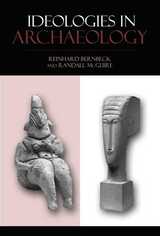 Ideologies in Archaeology
Edited by Reinhard Bernbeck and Randall McGuire
University of Arizona Press, 2011 Archaeologists have often used the term ideology to vaguely refer to a “realm of ideas.” Scholars from Marx to Zizek have developed a sharper concept, arguing that ideology works by representing—or misrepresenting—power relations through concealment, enhancement, or transformation of real social relations between groups. Ideologies in Archaeology examines the role of ideology in this latter sense as it pertains to both the practice and the content of archaeological studies. While ideas like reflexive archaeology and multivocality have generated some recent interest, this book is the first work to address in any detail the mutual relationship between ideologies of the past and present ideological conditions producing archaeological knowledge.
Contributors to this volume focus on elements of life in past societies that “went without saying” and that concealed different forms of power as obvious and unquestionable. From the use of burial rites as political theater in Iron Age Germany to the intersection of economics and elite power in Mississippian mound building, the contributors uncover complex manipulations of power that have often gone unrecognized. They show that Occam’s razor—the tendency to favor simpler explanations—is sometimes just an excuse to avoid dealing with the historical world in its full complexity.
Jean-Paul Demoule’s concluding chapter echoes this sentiment and moreover brings a continental European perspective to the preceding case studies. In addition to situating this volume in a wider history of archaeological currents, Demoule identifies the institutional and cultural factors that may account for the current direction in North American archaeology. He also offers a defense of archaeology in an era of scientific relativism, which leads him to reflect on the responsibilities of archaeologists.
Includes contributions by: Susan M. Alt, Bettina Arnold, Uzi Baram, Reinhard Bernbeck, Matthew David Cochran, Jean-Paul Demoule, Kurt A. Jordan, Susan Kus, Vicente Lull, Christopher N. Matthews, Randall H. McGuire, Rafael Micó, Cristina Rihuete Herrada, Paul Mullins, Sue Novinger, Susan Pollock, Victor Raharijaona, Roberto Risch, Kathleen Sterling, Ruth M. Van Dyke, and LouAnn Wurst
Ideologies in the Age of Extremes: Liberalism, Conservatism, Communism, Fascism 1914-1991
Willie Thompson
Pluto Press, 2010 This is a history of political ideologies during the period famously described by Eric Hobsbawn as ‘The Age of Extremes’ - from the First World War to the collapse of the Soviet Union.
Ideologies in the Age of Extremes introduces the key ideologies of the age; liberalism, conservatism, communism and fascism. Willie Thompson identifies the political influence of mass movements as a key feature. He uses a powerful approach that considers the different ideologies in relation to each other. This allows him to shows that they often emerged from a common root or merged into a common future, stealing each other’s clothes and reinventing themselves as the stark opposite of a competing ideology.
This sophisticated yet accessible analysis will be of great interest to students of 20th century history and political theory.
Ideologies of Hispanism
Mabel Moraña
Vanderbilt University Press, 2005 Bringing together contributions from top specialists in Hispanic studies - both Peninsular and Latin American - this volume explores a variety of critical issues related to the historical, political, and ideological configuration of the field. Dealing with Hispanism in both Latin America and the United States, the book's multidisciplinary essays range from historical studies of the hegemonic status of Castillian language in Spain and America to the analysis of otherness and the uses of memory and oblivion in various nationalist discourses on both sides of the Atlantic.
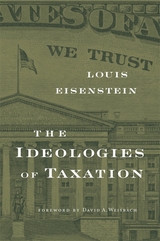 The Ideologies of Taxation
Louis Eisenstein
Harvard University Press, 2010 Originally published in 1961, The Ideologies of Taxation is a classic of taxation—a long-unavailable volume that remains uniquely applicable today. Louis Eisenstein starts from the idea that the tax system in a democracy is shaped by competing factions, each seeking to minimize its burden. Because few people are convinced by appeals to self-interest, factions must give reasons, which are skillfully elaborated into systems of belief or ideologies.
Eisenstein’s aim is to examine (and debunk) three major ideologies used to justify various reforms of the tax system. The ideology of ability holds that taxes should be apportioned based on ability to pay and that this is properly measured by income or wealth. The ideology of deterrents is concerned with high taxes on private enterprise—low and flat taxes are desired lest the wealthy reduce their work efforts and savings. The ideology of equity is focused on equal treatment of similarly situated individuals. Eisenstein shows, with sharp wit and an instinct for the jugular, how each of these ideologies is plagued with contradictions, incompleteness, and, in some cases, self-serving claims.
Ideology
David Mclellan
University of Minnesota Press, 1995
Ideology and Holy Landscape in the Baltic Crusades
Gregory Leighton
Arc Humanities Press, 2022 This book examines how the military orders and the ideology of crusading gave rise to a new sacred landscape in the medieval Baltic region, an outpost of Latin Christianity. Drawing on a wide variety of sources and international scholarship, the book discusses the paganism of the landscape in written sources pre-dating the crusades, in addition to the narrative, legal, and visual evidence of the crusade period. It draws out the key sacralizing elements as expressed in those sources, which structure the definition of sacred landscape, particularly martyrdom, the manifestation of the sacred, and use of relics in battle. By analyzing these aspects with Geographical Information Systems (GIS), a map of the Baltic campaigns emerges that provides a fresh approach to studying contemporary views of holy war in a region with no initial links to the loca sancta of Jerusalem or Europe.
Ideology and Power in the Middle East: Studies in Honor of George Lenczowski
Peter J. Chelkowski and Robert J. Pranger, eds.
Duke University Press, 1988 Scholars from the United States, Canada, Europe, and the Middle East combine their talents and expertise to honor George Lenczowski, whose studies of the Middle East over two generations have made him a foremost expert on contemporary affairs in this most volatile and complex region.
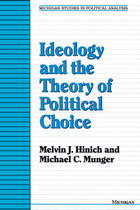 Ideology and the Theory of Political Choice
Melvin Hinich and Michael C. Munger
University of Michigan Press, 1996 There is no unified theory that can explain both voter choice and where choices come from. Hinich and Munger fill that gap with their model of political communication based on ideology.
Rather than beginning with voters and diffuse, atomistic preferences, Hinich and Munger explore why large groups of voters share preference profiles, why they consider themselves "liberals" or "conservatives." The reasons, they argue, lie in the twin problems of communication and commitment that politicians face. Voters, overloaded with information, ignore specific platform positions. Parties and candidates therefore communicate through simple statements of goals, analogies, and by invoking political symbols. But politicians must also commit to pursuing the actions implied by these analogies and symbols. Commitment requires that ideologies be used consistently, particularly when it is not in the party's short-run interest.
The model Hinich and Munger develop accounts for the choices of voters, the goals of politicians, and the interests of contributors. It is an important addition to political science and essential reading for all in that discipline.
"Hinich and Munger's study of ideology and the theory of political choice is a pioneering effort to integrate ideology into formal political theory. It is a major step in directing attention toward the way in which ideology influences the nature of political choices." --Douglass C. North
". . . represents a significant contribution to the literature on elections, voting behavior, and social choice." --Policy Currents
Melvin Hinich is Professor of Government, University of Texas. Michael C. Munger is Associate Professor of Political Science, University of North Carolina.
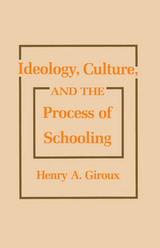 Ideology, Culture and the Process of Schooling
Henry Giroux
Temple University Press, 1984 "Giroux is an articulate, sensitive and balanced spokesperson [who] presents a thoughtful analysis of the relationship between knowledge and power and between social context and the school curriculum."
--Norman Henchey, Journal of Educational Thought
This book lays bare the ideological and political character of the positivist rationality that has been the primary theoretical underpinning of educational research in the United States. These assumptions have expressed themselves in the form and content of curriculum, classroom social relations, classroom cultural artifacts, and the experiences and beliefs of teachers and students. Have existing radical critiques provided the theoretical building blocks for a new theory of pedagogy?
The author attempts to move beyond the abstract, negative characteristics of many radical critiques, which are often based on false dualisms that fail to link structure and intentionally, content and process, ideology and hegemony, etc. He also is critical of the over-determined models of socialization and the abstract celebration of subjectivity that underlies much of the false utopianism of many radical perspectives. Professor Giroux begins to lay the theoretical groundwork for developing a radical pedagogy that connects critical theory with the need for social action in the interest of individual freedom and social reconstruction.
"...a useful and important contribution to the area of curriculum theory. Giroux has articulated well some of the major tensions in radical educational theory and practice without abandoning the concern to establish a foundation for emancipatory cage."
--Walter Feinberg, Journal of Education
"Graduate students, as well as their professors, can learn a great deal from studying Ideology, Culture, and the Process of Schooling; furthermore, the excellent system of notes and references at the end of each chapter will introduce the reader into the world of ideas from which Giroux has taken his lessons."
--Educational Studies
Ideology, Culture, and Translation
Scott S. Elliott
SBL Press, 2012 Translation is a fundamental aspect of biblical scholarship and an ever-present reality in a global context. Scholars interested in more than linguistically oriented translation problems of a traditional nature often struggle to find an interdisciplinary venue in which to share their work. These essays, by means of critical engagement with the translation, translation practices, and translation history of texts relevant to the study of Bible and ancient and modern Christianity, explore theoretical dimensions and contemporary implications of translations and translation practice. The contributors are George Aichele, Roland Boer, Virginia Burrus, Alan Cadwallader, K. Jason Coker, John Eipper, Scott S. Elliott, Raj Nadella, Flemming A. J. Nielsen, Christina Petterson, Naomi Seidman, Jaqueline du Toit, Esteban Voth, and Matt Waggoner.
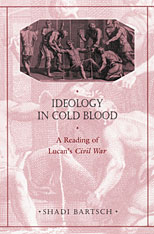 Ideology in Cold Blood: A Reading of Lucan’s Civil War
Shadi Bartsch
Harvard University Press, 1997 Is Lucan’s brilliant and grotesque epic Civil War an example of ideological poetry at its most flagrant, or is it a work that despairingly proclaims the meaninglessness of ideology? Shadi Bartsch offers a startlingly new answer to this split debate on the Roman poet’s magnum opus.
Reflecting on the disintegration of the Roman republic in the wake of the civil war that began in 49 B.C., Lucan (writing during the grim tyranny of Nero’s Rome) recounts that fateful conflict with a strangely ambiguous portrayal of his republican hero, Pompey. Although the story is one of a tragic defeat, the language of his epic is more often violent and nihilistic than heroic and tragic. And Lucan is oddly fascinated by the graphic destruction of lives, the violation of human bodies—an interest paralleled in his deviant syntax and fragmented poetry. In an analysis that draws on contemporary political thought ranging from Hannah Arendt and Richard Rorty to the poetry of Vietnam veterans, as well as on literary theory and ancient sources, Bartsch finds in the paradoxes of Lucan’s poetry both a political irony that responds to the universally perceived need for, yet suspicion of, ideology, and a recourse to the redemptive power of storytelling. This shrewd and lively book contributes substantially to our understanding of Roman civilization and of poetry as a means of political expression.
Ideology in the Middle Ages: Approaches from Southwestern Europe
Flocel Sabaté
Arc Humanities Press, 2019 <div>This interdisciplinary volume sets out to illuminate medieval thought, and to consider how the underlying values of the Middle Ages exerted significant influence in medieval society in the West.</div><div>The book situates the Christian Church in the West as a framing ideology of the Middle Ages, and considers ideology from four angles: as a means of defining power; as a way of managing power; ideology as an influence on daily living and societies; and the ways in which ideology associated with the Middle Ages continues to influence understandings of past and present. A focus on southern European case studies has been chosen as a means of enriching and complicating study of the Middle Ages.</div>
 The Dhvanyaloka of Anandavardhana with the Locana of Abhinavagupta
Daniel H. H. Ingalls, Sr.
Harvard University Press For nearly a thousand years the brilliant analysis of aesthetic experience set forth in the Locana of Abhinavagupta, India's founding literary critic, has dominated traditional Indian theory on poetics and aesthetics. The Locana, presented here in English translation for the first time, is a commentary on the ninth-century Dhvanyaloka of Anandavardhana, which is itself the pivotal work in the history of Indian poetics.
The Dhvanyaloka revolutionized Sanskrit literary theory by proposing that the main goal of good poetry is the evocation of a mood or "flavor" (rasa) and that this process can be explained only by recognizing a semantic power beyond denotation and metaphor, namely, the power of suggestion. On the basis of this analysis the Locana develops a theory of the psychology of aesthetic response.
This edition is the first to make the two most influential works of traditional Sanskrit literary and aesthetic theory fully accessible to readers who want to know more about Sanskrit literature. The editorial annotations furnish the most complete exposition available of the history and content of these works. In addition, the verses presented as examples by both authors (offered here in verse translation) form an anthology of some of the finest Sanskrit and Prakrit poetry.
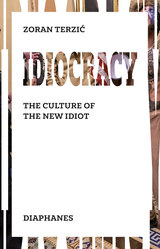 Idiocracy: The Culture of the New Idiot
Zoran Terzic
Diaphanes, 2021 There is a new quality of idiocy today. While the old idiot derived knowledge from isolation, the new idiot refuses all understanding of the world. A figure of systematic incompetence, the new idiot is impacting global culture and politics alike, giving rise to surprising, often absurd competences. Yesterday’s “fake news” or “post-truths” can be read today as evidence of an ongoing transformation of self-politics in which the idiotic impulse is redefining our experience of the world. Despite talk of global awareness, the isolated self of the many is all the more effective. It brings about a culture of happy singletons strolling towards a black hole that has become their substitute for society.
Zoran Terzić’s wide-ranging essay takes up the figure of the idiot and follows its numerous appearances throughout intellectual history in an examination of the “art of the idiotic” that both reflects and transcends the freneticism of the present.
 Idiomatic Expressions and Grammatical Constructions
Paul Kay, Laura A. Michaelis, Ivan A. Sag, and Dan Flickinger
CSLI, 2025 A thorough investigation into idioms and their grand meaning, including how best to analyze them.
Any theory of idioms should be part and parcel of a general theory of grammar, adding as little machinery to one's overall grammatical approach as possible in describing both the syntactic and semantic idiosyncrasies and regularities of this large class of linguistic expressions. This volume presents several lexicalist analyses of idioms within the framework of Sign-Based Construction Grammar, reflecting three guiding principles: many but not all idioms are syntactically and semantically compositional, dividing into distinct classes; idioms are analyzable in terms of a suitably rich lexicon and a set of constructions (lexical and syntactic rules) with corresponding meaning representations; and idiomaticity is a gradient phenomenon, exhibiting wide variation in degree of syntactic flexibility and meaning.
Idiotism: Capitalism and the Privatisation of Life
Neal Curtis
Pluto Press, 2012 Idiotism examines the condition of society in late capitalism where the market logic of neoliberalism has become the new ‘common sense’, taken as the model for the organisation and management of all aspects of social life. Using the Greek word idios, meaning 'private', Neal Curtis calls this privatisation of the world ‘idiotism’.
Constructing a new vocabulary with which to understand contemporary society, Curtis examines 'idiotism' across the spheres of economics, politics and culture, drawing on the philosophy and political theories of Martin Heidegger, Louis Althusser, Franco Berardi, Jacques Rancière and Cornelius Castoriadis.
Idiotism recasts our conception of the new neoliberal 'common sense', presenting it as not simply a case of false consciousness, but an ontological problem related to our being-in-the-world.
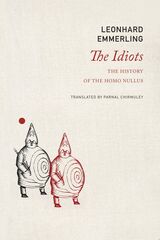 The Idiots: The History of the Homo Nullus
Leonhard Emmerling
Seagull Books, 2026 In a world obsessed with expertise and control, the figure of the idiot illuminates deeper truths about society.
Dostoevsky and Nietzsche wrote about him; Dadaists and punks idolized him; artists like Warhol and Beuys made him their icon. From holy fool to punk rebel, the idiot—a figure that traces its roots back to the Greek idiotes, a person who was alienated from public life—has always challenged society’s norms from the margins. Far from a simple madman, the idiot is a powerful subversive, a person who disregards norms and finds profound insight in a state of unmediated inspiration. Using a cross-disciplinary approach bridging literature, religion, art, and philosophy, this volume traces a rich journey up to the present, where the idiot reemerges in a dramatic twist: a public figure who inverts social norms, confounds the boundary between private and public, and declares a new, paradoxical view of the world.
Idle Fictions: The Hispanic Vanguard Novel, 1926-1934, Expanded edition
Gustavo Pérez Firmat
Duke University Press, 1982 The "idle fictions" of the vanguard novel of the 1920s and 1930s in Spain and Spanish America represented a kind of interlude of playfulness--a vacation or parenthetical insertion--in what was perceived as the established course of the modern Hispanic novel's development. Yet, as Pérez Firmat argues, though this genre saw itself as recreative and interstitial, it deliberately precipitated "a class war not between social classes but between literary classes." Concentrating on source material not widely available, Pérez Firmat reconstructs the reception these novels received at the time of their publication, then develops a reading of them based on the intellectual context of this reception. A new preface and an appendix on vanguard biographies have been added to this paperback edition.
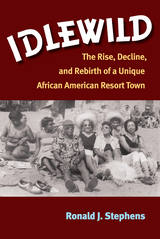 Idlewild: The Rise, Decline, and Rebirth of a Unique African American Resort Town
Ronald J. Stephens
University of Michigan Press, 2013 In 1912, white land developers founded Idlewild, an African American resort community in western Michigan. Over the following decades, the town became one of the country’s foremost vacation destinations for the black middle class, during its peak drawing tens of thousands of visitors annually and hosting the era’s premier entertainers, such as The Four Tops, Della Reese, Brook Benton, and George Kirby. With the civil rights movement and the resulting expansion of recreation options available to African Americans, Idlewild suffered a sharp social and economic decline, and by the early 1980s the town had become a struggling retirement community in the midst of financial and political crises. Meticulously researched and unearthing never-before-seen historical material, Ronald J. Stephens’s book examines the rapid rise and decline of this pivotal landmark in African American and leisure history, in the process exploring intersections among race, class, tourism, entertainment, and historic preservation in the United States. Featuring a wealth of fieldwork on contemporary Idlewild, the book also takes a candid look at recent revitalization efforts and analyzes the possibilities for a future resurgence of this national treasure.
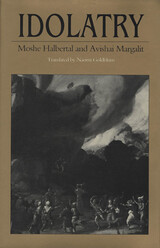 Idolatry
Moshe Halbertal and Avishai Margalit
Harvard University Press, 1998 “You shall have no other gods besides Me.” This injunction, handed down through Moses three thousand years ago, marks one of the most decisive shifts in Western culture: away from polytheism toward monotheism. Despite the momentous implications of such a turn, the role of idolatry in giving it direction and impetus is little understood. This book examines the meaning and nature of idolatry—and, in doing so, reveals much about the monotheistic tradition that defines itself against this sin.The authors consider Christianity and Islam, but focus primarily on Judaism. They explore competing claims about the concept of idolatry that emerges in the Hebrew Bible as a “whoring after false gods.” Does such a description, grounded in an analogy of sexual relations, presuppose the actual existence of other gods with whom someone might sin? Or are false gods the product of “men’s hands,” simply a matter of misguided belief? The authors show how this debate, over idolatry as practice or error, has taken shape and has in turn shaped the course of Western thought—from the differentiation between Jewish and Christian conceptions of God to the distinctions between true and false belief that inform the tradition of religious enlightenment.Ranging with authority from the Talmud to Maimonides, from Marx to Nietzsche and on to G.E. Moore, this brilliant account of a subject central to our culture also has much to say about metaphor, myth, and the application of philosophical analysis to religious concepts and sensibilities. Its insights into pluralism and intolerance, into the logic and illogic of the arguments religions aim at each other, make Idolatry especially timely and valuable in these days of dark and implacable religious difference.
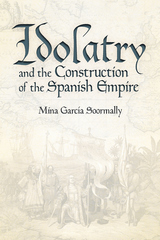 Idolatry and the Construction of the Spanish Empire
Mina García Soormally
University Press of Colorado, 2018 An ethnohistory on the spiritual and governmental conquest of the indigenous people in colonial Mexico, Idolatry and the Construction of the Spanish Empire examines the role played by the shifting concept of idolatry in the conquest of the Americas, as well as its relation to the subsequent construction of imperial power and hegemony.
Contrasting readings of evangelization plays and chronicles from the Indies and legislation and literature produced in Spain, author Mina García Soormally places theoretical analysis of state formation in Colonial Latin America within the historical context. The conquest of America was presented, in its first instances, as a virtual extension of the Reconquista, which had taken place in Spain since 711, during which Spaniards fought to build an empire based in part on religious discrimination. The fight against the “heathens” (Moors and Jews) provided the experience and mindset to practice the repression of the other, making Spain a cultural laboratory that was transported across the Atlantic Ocean.
Idolatry and the Construction of the Spanish Empire is a wide-ranging explication of religious orthodoxy and unorthodoxy during Spain’s medieval and early modern period as they relate to idolatry, with analysis of events that occurred on both sides of the Atlantic. The book contributes to the growing field of transatlantic studies and explores the redefinition that took place in Europe and in the colonies.
Idolizing Authorship: Literary Celebrity and the Construction of Identity, 1800 to the Present
Edited by Gaston Franssen and Rick Honings
Amsterdam University Press, 2017 Though these days, our celebrity culture tends to revolve around movie stars and pop musicians, there have been plenty of celebrity authors over the years and around the world. This volume brings together a number of contributors to look at how and why certain writers have attained celebrity throughout history. How were their images as celebrities constructed by themselves and in complicity with their fans? And how did that process and its effects differ from country to country and era to era?
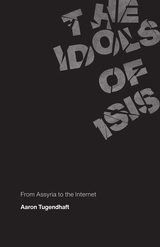 The Idols of ISIS: From Assyria to the Internet
Aaron Tugendhaft
University of Chicago Press, 2020 In 2015, the Islamic State released a video of men smashing sculptures in Iraq’s Mosul Museum as part of a mission to cleanse the world of idolatry. This book unpacks three key facets of that event: the status and power of images, the political importance of museums, and the efficacy of videos in furthering an ideological agenda through the internet.
Beginning with the Islamic State’s claim that the smashed objects were idols of the “age of ignorance,” Aaron Tugendhaft questions whether there can be any political life without idolatry. He then explores the various roles Mesopotamian sculpture has played in European imperial competition, the development of artistic modernism, and the formation of Iraqi national identity, showing how this history reverberates in the choice of the Mosul Museum as performance stage. Finally, he compares the Islamic State’s production of images to the ways in which images circulated in ancient Assyria and asks how digitization has transformed politics in the age of social media. An elegant and accessibly written introduction to the complexities of such events, The Idols of ISIS is ideal for students and readers seeking a richer cultural perspective than the media usually provides.
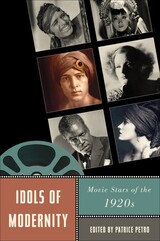 Idols of Modernity: Movie Stars of the 1920s
Petro, Patrice
Rutgers University Press, 2010 With its sharp focus on stardom during the 1920s, Idols of Modernity reveals strong connections and dissonances in matters of storytelling and performance that can be traced both backward and forward, across Europe, Asia, and the United States, from the silent era into the emergence of sound.
Bringing together the best new work oncinemaand stardom in the 1920s, this illustrated collection showcases the range of complex social, institutional, and aesthetic issues at work in American cinema of this time. Attentive to stardom as an ensemble of texts, contexts, and social phenomena stretching beyond the cinema, major scholars provide careful analysis of the careers of both well-known and now forgotten stars of the silent and early sound era—Douglas Fairbanks, Buster Keaton, the Talmadge sisters, Rudolph Valentino, Gloria Swanson, Clara Bow, Colleen Moore, Greta Garbo, Anna May Wong, Emil Jannings, Al Jolson, Ernest Morrison, Noble Johnson, Evelyn Preer, Lincoln Perry, and Marie Dressler.
Idols of the Tribe: Group Identity and Political Change
Harold Isaacs
Harvard University Press, 1989 “A pacesetter, at the forefront in recognizing the persisting importance of ‘ethnicity as a force both in building nations and in tearing them apart,’ it is also a work of literary merit, crafted by a master wordsmith.” So comments Lucian Pye in reflecting on this classic work in political science and sociology about group identities bending and shaping themselves under the pressure of political change. These transformations seem to have basic similarities, whether they take place in Little Rock or Kenya, Vietnam or Pakistan, Belgium or Biafra.
Isaacs sorts out some fundamentals in forming group identity: the body, names, language, history of origins, religion, and nationality. These are dynamic elements that are melded together but have the possibility of creating new pluralisms.
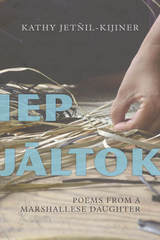 Iep Jaltok: Poems from a Marshallese Daughter
Kathy Jetnil-Kijiner
University of Arizona Press, 2017 As the seas rise, the fight intensifies to save the Pacific Ocean’s Marshall Islands from being devoured by the waters around them. At the same time, activists are raising their poetic voices against decades of colonialism, environmental destruction, and social injustice. Marshallese poet and activist Kathy Jetnil-Kijiner’s writing highlights the traumas of colonialism, racism, forced migration, the legacy of American nuclear testing, and the impending threats of climate change. Bearing witness at the front lines of various activist movements inspires her work and has propelled her poetry onto international stages, where she has performed in front of audiences ranging from elementary school students to more than a hundred world leaders at the United Nations Climate Summit. The poet connects us to Marshallese daily life and tradition, likening her poetry to a basket and its essential materials. Her cultural roots and her family provides the thick fiber, the structure of the basket. Her diasporic upbringing is the material which wraps around the fiber, an essential layer to the structure of her experiences. And her passion for justice and change, the passion which brings her to the front lines of activist movements—is the stitching that binds these two experiences together. Iep Jāltok will make history as the first published book of poetry written by a Marshallese author, and it ushers in an important new voice for justice.
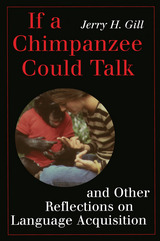 If a Chimpanzee Could Talk and Other Reflections on Language Acquisition
Jerry H. Gill
University of Arizona Press, 1997 How is it that chimpanzees can learn to "speak" at a higher level than some so-called wolf children? What happened that day in the pumphouse, when Helen Keller suddenly grasped the meaning of words? And picture this: a father and mother who shun the advice of professionals, who doggedly force their way into the closed world of their autistic son, and who reverse his grim prognosis, revealing him to be gifted. How to explain?
In this book, a philosopher combines these famous cases with a lifetime of study to examine the threshold of language--that point "between speech and not quite speech." He provides fascinating accounts of the deaf and blind Helen Keller, of chimpanzees like Washoe, and of feral children such as Victor, the "wild boy of Aveyron," putting a new spin on their stories. When does it start, he asks, that miracle most of us take for granted? Where does it come from, that uniquely human power to transform perception and action into thought and the singular activity we call speech?
Here is evidence that, for chimp or child, the crucial factors in acquiring language have less to do with intellect and everything to do with social interaction. Here is confirmation that the "give-and-take, push-and-pull" of daily life forces virtually all of us to acquire language simply to live and work together. Author Jerry Gill offers no pat answers. Rather, he emphasizes imitation and reciprocity—for example, playing pat-a-cake with a baby—as essential to becoming part of a speaking community "and thereby becoming a human being." In addition, Gill gives dozens of examples to show how gesture and facial expression both create and change the meaning of language. In compelling fashion, he underscores the point that language acquisition can be fully understood only in terms of such physical and social activity. The author exposes the flaws of research focused mainly on mental processes and gives little credit to findings based upon artificially contrived experiments.
With vigor, compassion, and a broad-minded humanism, these pages invite the reader to think again about how we say what we mean, how we mean what we say, and where it all starts in the first place. Valuable to students of psychology, linguistics, philosophy, and anthropology, the book will also appeal to general readers who welcome an opportunity to explore familiar things in a new and entirely enjoyable way.
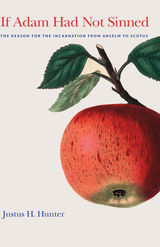 If Adam Had Not Sinned: The Reason for the Incarnation from Anselm to Scotus
Justus H. Hunter
Catholic University of America Press, 2020 Since the twelfth century, theologians have found a counterfactual question irresistible: “If Adam had not sinned, would the Son have become incarnate?” In the latter half of the twentieth century, Hans Urs von Balthasar, Hans Küng, Gerhard Ludwig Müller, Karl Rahner, Karl Barth, Wolfhart Pannenburg, Jürgen Moltmann, and Robert Jenson all considered this question on the reason, or motive, for the incarnation. Nearly every case refers to the classic disagreement between those who follow Thomas Aquinas and those who follow John Duns Scotus.
Though it is common to claim Thomas or Scotus as one’s authority, the theological debates among which Thomas and Scotus developed their own positions remain largely neglected. This study fills that gap. If Adam Had Not Sinned is a study of the medieval debates over the motive for the incarnation from Anselm of Canterbury to John Duns Scotus. While the volume is primarily focused on thirteenth-century debates at the University of Paris, it also supplies necessary historical background to those debates. As a result, the larger context within which Thomas Aquinas and John Duns Scotus developed their influential responses is detailed. This larger context permits an analysis that leads to the surprising claim, against widespread assumptions, that the responses given by Thomas and Scotus are substantially reconcilable.
If at First You Don't Succeed?: Writing, Rhetoric, and the Question of Failure
Steven J. Corbett
University Press of Colorado, 2025 What does it mean to fail at an important performance, to be a failure, or to fail someone at something? Failure is a universal concept widely applicable to every aspect of writing studies. Perhaps it is the most universal concept applicable to writing studies (or life, for that matter). But what it means to fail can mean vastly different things to vastly different people at vastly different times. In this edited collection, 25 writing studies scholars use failure as a conceptual lens to reflect on their experiences as scholars and teachers. Their contributions address historical and theoretical treatments of failure, offer case studies of failure in teaching and research, and share brief (but bitter/sweet) narratives drawn from personal experiences in the field.
If Beale Street Could Talk: Music, Community, Culture
Robert Cantwell
University of Illinois Press, 2008 Demonstrating the intimate connections among our public, political, and personal lives, these essays by Robert Cantwell explore the vernacular culture of everyday life. A keen and innovative observer of American culture, Cantwell casts a broad and penetrating intelligence over the cultural functioning of popular texts, artifacts, and performers, examining how cultural practices become performances and how performances become artifacts endowed with new meaning through the transformative acts of imagination. Cantwell's points of departure range from the visual and the literary--a photograph of Woody Guthrie, or a poem by John Keats--to major cultural exhibitions such as the World's Columbian Exposition. In all these domains, he unravels the implications for community and cultural life of a continual migration, transformation, and reformulation of cultural content.
 If Colors Could be Heard: Narratives About Racial Identity in Music Education
Edited by Christopher Cayari, Jason D. Thompson, and Rekha S. Rajan
Intellect Books, 2025 A deeply personal and scholarly exploration of how race and ethnicity shape the ways we learn, teach, and experience music.
If Colors Could Be Heard: Narratives About Racial Identity in Music Education is a groundbreaking collection of firsthand accounts by music educators, artists, activists, and students from the Global Majority. These deeply personal narratives explore how race and ethnicity shape experiences in music learning, making, and teaching.
From stories of childhood discovery to reflections on navigating racial identity in the classroom, these voices paint a complex and vivid portrait of music education in the United States. Going beyond a collection of research studies, this book embraces self-reflective storytelling as a legitimate and essential method of inquiry, offering a scholarly mosaic of lived experience.
By centering voices often marginalized in academia, If Colors Could Be Heard challenges dominant narratives and reimagines music education through a lens of equity, identity, and belonging. A must-read for students, educators, and researchers committed to fostering an inclusive and just musical future.
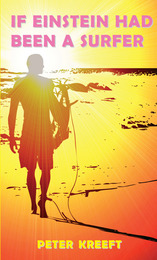 If Einstein Had Been a Surfer: A Surfer, a Scientist, and a Philosopher Discuss a "Universal Wave Theory" or "Theory of Everything"
Peter Kreeft
St. Augustine's Press, 2009 (1) Science, (2) philosophy, and (3) poetry, myth, and mysticism are three modes of consciousness that are radically different today. We are usually very good at carefully distinguishing them so as not to corrupt them, reduce them, or to confuse them with each other. But almost no one tries to connect them in a synthesis in which each maintains its own identity yet each contributes to a greater whole that no one of them could attain alone – like a happy marriage. If we bring them together at all, it is only to focus in three different ways on a specific issue (like health care, or children’s literature, or gender roles). If Einstein Had Been a Surfer dares to do it for Everything, or rather for a “Theory of Everything” that only scientists today dare to talk about. But how can a “theory of the whole” be discovered by a brain that is less than a whole brain?
In this book all three dimensions of consciousness not only speak about a “theory of everything” but speak to each other in dialog. The three voices are incarnated in three characters from an upcoming novel, An Ocean Full of Angels: Evan Jellema is a theoretical physicist (and a clumsy Dutchman), ’Isa Ben Adam is a philosophical Muslim (and cantankerously clear), and Libby Rawls is a poet, mystic, and surfer (and a sassy, classy Black feminist).
Isn’t “surfer” a bit of a stretch? Not at all. Actually, the papers reported last year that an amateur scientist has in fact finally discovered, or claimed to have discovered, the “theory of everything” that Einstein failed to find and that scientists have been searching for ever since – and he is a surfer! Perhaps this is no accident, but a natural connection: the mind of the “soul surfer,” having become one with the sea, has awakened its “third eye” which alone gives the scientist the binocular vision, the synoptic perspective, that he lacks. And perhaps only a philosopher can mediate the two other modes of vision, as Aquinas mediated and synthesized the science of Albert the Great and Aristotle with the poetry and symbolism of mystics like Augustine.
This lively trialog, full of irony, intellectual surprise, and humor, is a serious call for a post-medieval synthesis. It does not claim to have arrived anywhere near the end of a journey to a “Theory of Everything,” only to have begun it. Even that modest ambition will certainly be criticized a priori as impossibly ambitious. Does that tell you anything about the book, or does it tell you something about the critic?
 If England Were Invaded
William Le Queux
Bodleian Library Publishing, 2014 No fewer than two hundred thousand Germans were already upon English soil! The outlook grew blacker every hour.
Eight years before the onset of World War I, as national hysteria over the possibility of German spies in England reached its peak, journalist and prolific spy novelist William Le Queux penned The Invasion of 1910. Although it has since faded from public memory, at the time of its serialization, the novel was a tremendous success, selling more than one million copies and even inspiring an unauthorized, abridged German-language edition that altered the book’s ending.
If England Were Invaded restores this major work of “invasion literature” to print. Le Queux constructs a catastrophic scenario in which the German army has invaded England in a surprise attack on the coast. The story chillingly chronicles a war fought on the British homeland, with detailed accounts of battles involving real locations and real defense experts of the time. Throughout, Le Queux brings to life the domestic realities of a nation at war, from food shortages and failing financial institutions to the ever-present threat of espionage. One by one, strategic cities and counties in the novel—Birmingham, Manchester, and Suffolk—are abandoned to the German army until it stands poised to “advance upon and crush the complex city which is the pride and home of every Englishman—London.”
A truly entertaining read—complete with campaign maps and fictional proclamations from Kaiser Wilhelm II—If England Were Invaded also offers an incredible cautionary tale about a country that was not prepared for an attack and, in doing so, it shines a light on the common hopes and fears in England at the beginning of the twentieth century.
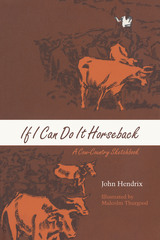 If I Can Do It Horseback: A Cow-Country Sketchbook
By John Hendrix; illustrated by Malcolm Thurgood
University of Texas Press, 1964 John Hendrix drew upon his own varied experiences for this panoramic view of West Texas ranch life, presented here in an integral compilation of flavorful articles written originally for The Cattleman. Touching upon virtually every facet of the cattle industry, they examine economic influences and technological changes as well as the personal and emotional aspects of range life. Here are accurate, detailed, fascinating descriptions of the day-to-day life of the cowboy, the chuck-wagon cook, the range boss: narratives rich in human interest, in pathos, comedy, drama. Some tell of the organization and operation of the cow camp: the activities of the men, their duties and their entertainments, the clothes they wore, the food they ate, the horses they rode, the language they spoke. Some compare West Texas cattle-handling techniques with those of other sectors, or contrast early techniques with later practices. Others give biographies of cattlemen and cowboys. Still others study the operation, development, problems, and achievements of typical ranches of various types: the early open-range ranches, the large ranches which successfully made the transition to modem operation, the unsuccessful company-owned ranches of the 1880s, the pioneer cattle-feeding projects. Several articles describe the geography of the West Texas cattle country: the vast, arid expanses; the brown-green hills and Cap Rock; the life-giving springs; and the fickle weather. These are all considered in terms of their physical appearance and emotional impact, their importance as economic factors, and their effect on the duties of the cowboys. Written in direct language and savoring of the life they describe, these articles capture the beauty of the cattle country—as well as its violence, hardships, drudgery. John Hendrix’s affection for the land, the people, and the life gives his writing a special warmth that his readers are sure to recognize and admire. Texas artist Malcolm Thurgood has provided delightful illustrations for the text, and Wayne Gard, author of The Chisholm Trail and The Great Buffalo Hunt, has written a valuable introduction.
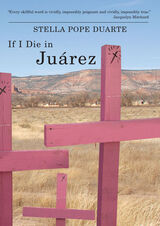 If I Die in Juárez
Stella Pope Duarte
University of Arizona Press, 2008 From the red-light districts in Ciudad Juárez to remote villages hidden away in the mountains of Chihuahua comes a tale of one of the darkest crimes to be recorded in the history of humankind. If I Die in Juárez traces the lives of three young women—Evita, a street child; Petra, a maquiladora worker; and Mayela, a Tarahumara Indian girl—who together uncover Juárez’s forbidden secret: the abduction and murder of young women. Bound together by blood, honor, an ancient chant, and a mysterious photo, the girls bring the murderous streets of Juárez to life. Based on the author’s interviews with relatives of murdered women, If I Die in Juárez is brilliantly crafted to give readers the experience of walking in the shoes of women who daily risk being abducted and murdered in the “capital city of murdered women,” joining thousands of others who for more than a decade have disappeared from Juárez, las desaparecidas, brutally murdered by assassins who have gone unpunished. The agony of one of the darkest tales in human history brings to light a strange hope, illusive yet constant, resisting lies, betrayal, and the desert’s silent sentence of death. Read an in-depth review of If I Die in Juárez here or click here for a study guide. If I Die in Juárez was also reviewed on KNAU's Southwest Book Review program. Listen here!
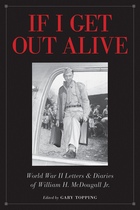 If I Get Out Alive: The World War II Letters and Diaries of William H McDougall Jr
Gary Topping
University of Utah Press, 2007 In 1939, William H. McDougall was a newspaperman from Salt Lake City who quit his job and went to work for the Japan Times, an English-language newspaper in Tokyo, and later for the United Press, for which he covered the Japanese occupation of Shanghai and the fall of the Dutch East Indies (Indonesia). When the ship on which he had escaped from Java was sunk, he reached the island of Sumatra, where he was captured and imprisoned by the Japanese until 1945.
McDougall’s letters to his family offer a rare and detailed look at daily life in Tokyo and in Japanese-occupied Shanghai during the months leading up to the Pearl Harbor attack. After his imprisonment in Sumatra, he began keeping a daily journal of his experiences as a POW. Published here for the first time are the journals he retrieved at the end of World War II.
Written by an articulate and perceptive professional reporter, McDougall's letters and diaries offer an intimate, personal narrative of conditions in wartime East Asia.
 If I Should Die
Leroy S. Rouner
University of Notre Dame Press, 2001 What does "death" really mean? Is there life after death? Is that idea even intelligible?
Despite our constant confrontation with death there has been little serious philosophical reflection on the meaning of death and even less on the classical question of immorality. Popular books on "death and dying" abound, but they are largely manuals for dying with composure, or individual "near death" experiences of light at the end of the tunnel.
This lively conversation includes various views on these matters, from John Lachs gentle but firm insistence that the notion of immorality is philosophically unintelligible, to Jürgen Moltmann's brave and careful examination of various arguments for what happens to us when we die. David Roochnik searches the Platonic dialogues for a metaphorical immorality which might satisfy the human longing for some meaning which does not die with us. Aaron Garrett traces the naturalization of the idea of immorality from Scotus to Locke in the history of Western philosophy, and David Schmidtz offers autobiographical reflections in shaping his philosophy of life's meaning. David Eckel takes us through a synopsis of Buddhist ideas on these issues. Rita Rouner uses the poems she wrote after the death of her son to chronicle a survivor's struggle with life and death. Peter Gomes casts a critical eye on our death rituals, and defends a classical Christian view of death and immortality, while Wendy Doniger examines the literature on those who were offered immorality by the gods and chose instead to remain mortal.
Leroy S. Rouner is Professor of Philosophy, Religion, and Philosophical Theology and Director of the Institute for Philosophy and Religion at Boston University.
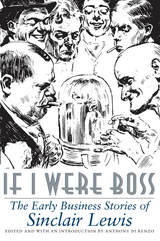 If I Were Boss: The Early Business Stories of Sinclair Lewis
Edited by Anthony Di Renzo
Southern Illinois University Press, 1997 Anthony Di Renzo makes available for the first time since their original publication some eighty years ago a collection of fifteen of Sinclair Lewis’s early business stories. Among Lewis’s funniest satires, these stories introduce the characters, themes, and techniques that would evolve into Babbitt. Each selection reflects the commercial culture of Lewis’s day, particularly Reason Why advertising, self-help manuals, and the business fiction of the Saturday Evening Post. The stories were published between October 1915 and May 1921 (nine in the Saturday Evening Post, four in Metropolitan Magazine, one in Harper’s Magazine, and one in American Magazine). Because some things have not changed in the American workplace since Lewis’s day, these highly entertaining and unflinchingly accurate office satires will appeal to the fans of Dilbert and The Drew Carey Show. In a sense, they provide lay readers with an archaeology of white-collar angst and regimentation. The horror and absurdities of contemporary corporate downsizing already existed in the office of the Progressive Era. For an audience contemplating the death of the American middle class, Lewis’s stories provide an important retrospective on earlier times and a preliminary autopsy on the American dream. Appearing just in time to celebrate the seventy-fifth anniversary of the publication of Babbitt, this collection rescues Lewis’s best early short fiction from obscurity, provides extensive information about his formative years in advertising and public relations, and analyzes both his genius for marketing and his carefully cultivated persona as the Great Salesman of American letters.
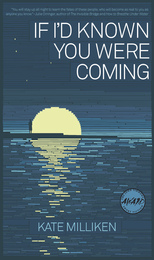 If I'd Known You Were Coming
Kate Milliken
University of Iowa Press, 2013 In these twelve award-winning stories, Kate Milliken unflinchingly shows us what can happen when the uninvited guest of our darkest desires comes to call. Whether surrounded by the white noise of a Hollywood celebration or enduring a stark winter in Maine, the characters of If I’d Known You Were Coming yearn to heal old wounds with new hurts. With a wry wit and a keen eye for emotive detail, the author of this unforgettable collection sets intersections in motion that will leave you both winded and wanting more.
In one story, a mother, driven by greed, unwittingly finds out how far her needs will push her. A hand model surprises himself and everyone else at the birthday party of an old friend’s daughter in another. With poetic deftness, a woman evaluates the meaning, the familial stories, that we carry with us from birth. In a story ripped from the headlines, a woman pines for the legs her husband lost in a freak accident at a Santa Monica farmer's market. A medical clerk, restless and alone, takes advantage of a disabled neighbor.
Kate Milliken knows the ties that bind and how tautly we will pull them. These are stories about desire, betrayal, love, regret, and family. Like all great fiction, If I’d Known You Were Coming possesses that uncanny ability to reveal us to ourselves.
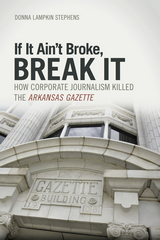 If It Ain't Broke, Break It: How Corporate Journalism Killed the Arkansas Gazette
Donna Lampkin Stephens
University of Arkansas Press, 2015 The Arkansas Gazette, under the independent local ownership of the Heiskell/Patterson family, was one of the most honored newspapers of twentieth-century American journalism, winning two Pulitzer Prizes for its coverage of the Little Rock Central Crisis. But wounds from a fierce newspaper war against another local owner—Walter Hussman and his Arkansas Democrat—combined with changing economic realities, led to the family’s decision to sell to the Gannett Corporation in 1986.
Whereas the Heiskell/Patterson family had been committed to quality journalism, Gannett was focused on the bottom line. The corporation shifted the Gazette’s editorial focus from giving readers what they needed to be engaged citizens to informing them about what they should do in their leisure time. While in many ways the chain trivialized the Gazette’s mission, the paper managed to retain its superior quality. But financial concerns made the difference in Arkansas’s ongoing newspaper war. As the head of a privately held company, Hussman had only himself to answer to, and he never flinched while spending $42 million in his battle with the Pattersons and millions more against Gannett. Gannett ultimately lost $108 million during its five years in Little Rock; Hussman said his losses were far less but still in the tens of millions.
Gannett had to answer to nervous stockholders, most of whom had no tie to, or knowledge of, Arkansas or the Gazette. For Hussman, the Arkansan, the battle had been personal since at least 1978. It is no surprise that the corporation blinked first, and the Arkansas Gazette died on October 18, 1991, the victim of corporate journalism.
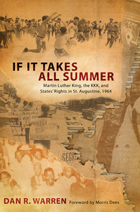 If It Takes All Summer: Martin Luther King, the KKK, and States' Rights in St. Augustine, 1964
Dan R. Warren, with foreword by Morris Dees
University of Alabama Press, 2008 An insider’s record of the St. Augustine Civil Rights drama. This memoir recounts the struggle against segregation in St. Augustine, Florida, in the early and mid-1960s. In the summer of 1964 the nation’s oldest city became the center of the civil rights movement as Martin Luther King Jr., encouraged by President Johnson, a southerner, who made the civil rights bill the center piece of his domestic policy, chose this tourism-driven community as an ideal location to demonstrate the injustice of discrimination and the complicity of southern leaders in its enforcement. St. Augustine was planning an elaborate celebration of its founding, and expected generous federal and state support. But when the kick-off dinner was announced only whites were invited, and local black leaders protested. The affair alerted the national civil rights leadership to the St. Augustine situation as well as fueling local black resentment. Ferment in the city grew, convincing King to bring his influence to the leadership of the local struggle. As King and his allies fought for the right to demonstrate, a locally powerful Ku Klux Klan counter-demonstrated. Conflict ensued between civil rights activists, local and from out-of-town, and segregationists, also home-grown and imported. The escalating violence of the Klan led Florida’s Governor to appoint State Attorney Dan Warren as his personal representative in St. Augustine. Warren’s crack down on the Klan and his innovative use of the Grand Jury to appoint a bi-racial committee against the intransigence of the Mayor and other officials, is a fascinating story of moral courage. This is an insider view of a sympathetic middleman in the difficult position of attempting to bring reason and dialog into a volatile situation.
 If Memory Serves: Gay Men, AIDS, and the Promise of the Queer Past
Christopher Castiglia
University of Minnesota Press, 2011 The AIDS epidemic soured the memory of the sexual revolution and gay liberation of the 1970s, and prominent politicians, commentators, and academics instructed gay men to forget the sexual cultures of the 1970s in order to ensure a healthy future. But without memory there can be no future, argue Christopher Castiglia and Christopher Reed in this exploration of the struggle over gay memory that marked the decades following the onset of AIDS. Challenging many of the assumptions behind first-wave queer theory, If Memory Serves offers a new perspective on the emergence of contemporary queer culture from the suppression and repression of gay memory. Drawing on a rich archive of videos, films, television shows, novels, monuments, paintings, and sculptures created in the wake of the epidemic, the authors reveal a resistance among critics to valuing—even recognizing—the inscription of gay memory in art, literature, popular culture, and the built environment. Castiglia and Reed explore such topics as the unacknowledged ways in which the popular sitcom Will and Grace circulated gay subcultural references to awaken a desire for belonging among young viewers; the post-traumatic (un)rememberings of queer theory; and the generation of “ideality politics” in the art of Félix González-Torres, the film Chuck & Buck, and the independent video Video Remains.
Inspired by Alasdair MacIntyre’s insight that “the possession of a historical identity and the possession of a social identity coincide,” Castiglia and Reed demonstrate that memory is crafted in response to inadequacies in the present—and therefore a constructive relation to the past is essential to the imagining of a new future.
If Mother Braids a Waterfall
Dayna Patterson
Signature Books, 2020 Dayna Patterson has produced a book obsessed with motherhood and daughterhood, ancestry, and transition—of home, family, faith, and the narratives woven to uphold the Self. In her debut collection of poetry and lyric essay, Patterson grapples with a patriarchal and polygamous heritage. After learning about her mother’s bisexuality, Patterson befriends doubt while simultaneously feeling the urge to unearth a feminist theology, one that envisions God the Mother taking pride in her place at the banquet table.
If No Moon
Moira Linehan
Southern Illinois University Press, 2007 If No Moon by award-winning author Moira Linehan documents the effects of profound loss and the dark withdrawal into grief. Wherever the author turns—the landscape of her backyard in Massachusetts, a Trappist monastery in Kentucky, the museums of Florence, or the cliffs of Inishmor in Ireland—she sees only the geography of emptiness. Crossovers between craft and art, form and voice, knitting and memory, recur throughout the poems. Lying within the tradition of narrative poetry, elegy, and the lyric, the collection reveals the mysterious journey of return. Coming full circle to find again the lyrical and the transcendent within the everyday, beauty eventually wins out. If No Moon, accessible to all who have or will experience loss, is the voice of one who has come to understand that there is no other work but starting over.
 If Not Us, Who?: William Rusher, National Review, and the Conservative Movement
David B. Frisk
Intercollegiate Studies Institute, 2012
“The great unsung hero of the conservative movement” —MARK LEVIN
If Not Us, Who? is both the story of an architect of the modern conservative movement and a colorful journey through a half century of high-level politics.
Best known as the longtime publisher of National Review, William Rusher (1923–2011) was more than just a crucial figure in the history of the Right’s leading magazine. He was a political intellectual, tactician, and strategist who helped shape the historic rise of conservatism.
To write If Not Us, Who?, David B. Frisk pored over Rusher’s voluminous papers at the Library of Congress and interviewed dozens of insiders, including National Review founder William F. Buckley Jr., in addition to Rusher himself. The result is a gripping biography, authorized yet independent, that shines new light on Rusher’s significance as an observer and an activist while bringing to life more than a generation’s worth of political hopes, fears, and controversies.
Frisk vividly captures the joys and struggles at National Review, including Rusher’s complex relationship with the legendary Buckley. Here we see the powerful blend of wit, erudition, dedication, shrewdness, and earnestness that made Rusher an influential figure at NR and an indispensable link between conservatism’s leading theorists and its political practitioners.
“If not us, who? If not now, when?”—a maxim often attributed to Ronald Reagan—could have been Rusher’s motto. In everything he did—publishing National Review, recruiting and advising political candidates, organizing cadres of young conservatives, taking on liberal advocates in a popular television debate program, writing a syndicated column—his objective was to build a movement. And he constantly exhorted his colleagues to step up as leaders of that movement. His tireless efforts proved essential to conservatism’s ascendancy, from the pivotal Goldwater campaign through the Reagan era.
Largely unexamined until now, Rusher’s career opens a new window onto the history of the conservative movement, its successes and failures. This comprehensive biography reintroduces readers to a remarkable man of thought and action.
If One of Us Should Fall
Nicole Terez Dutton
University of Pittsburgh Press, 2012 Winner of the Cave Canem Poetry Prize
“Nicole Terez Dutton’s fierce and formidable debut throbs with restless beauty and a lyrical undercurrent that is both empowered and unpredictable. Every poem is unsettling in that delicious way that changes and challenges the reader. There is nothing here that does not hurtle forward.”<br>
—Patricia Smith
 If Some God Shakes Your House
Jennifer Franklin
Four Way Books, 2023 Jennifer Franklin reimagines an Antigone for our times in her third collection, If Some God Shakes Your House, where filial devotion and ossified roles of gendered labor become the engine of her defiance. Franklin’s Antigone is ferocious, feeling, and unafraid of the consequences of speaking the truth to power about the political atrocities she has witnessed and personal traumas she has withstood. With a sensitivity that equally elevates the quotidian and the classical, and an attention that moves from the ancient ruins of Pompeii to the right of bodily autonomy and agency stripped away by our own Supreme Court, Franklin reveals the high stakes of our moment where “the one who does the judging judges things all wrong.” Franklin’s Antigone has embraced the sacrifice of self for something greater—a dual devotion to her disabled daughter and to her art. “For twenty years, I have been disappearing,” she writes in the book’s final poem, yet she continues to sing.
If the House
Molly Spencer
University of Wisconsin Press, 2019 In these poems, well-known spaces both reassure and imperil, and language both anchors and disorients. Molly Spencer's speakers navigate the landscape of human experience, building upon the cycles of a household throughout the seasons of the year. Ordinary places and things—a kitchen table, a memory, a beloved's thigh—are viewed as if through the lens of a shifting, unsettling kaleidoscope. This incisive collection suggests that the imagined comfort we find in familiarity and routine belies the unease that lingers beneath.
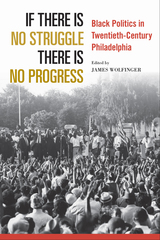 If There Is No Struggle There Is No Progress: Black Politics in Twentieth-Century Philadelphia
Edited by James Wolfinger
Temple University Press, 2022 Philadelphia has long been a crucial site for the development of Black politics across the nation. If There Is No Struggle There Is No Progress provides an in-depth historical analysis—from the days of the Great Migration to the present—of the people and movements that made the city a center of political activism. The editor and contributors show how Black activists have long protested against police abuse, pushed for education reform, challenged job and housing discrimination, and put presidents in the White House. If There Is No Struggle There Is No Progress emphasizes the strength of political strategies such as the “Don’t Buy Where You Can’t Work” movement and the Double V campaign. It demonstrates how Black activism helped shift Philadelphia from the Republican machine to Democratic leaders in the 1950s and highlights the election of politicians like Robert N. C. Nix, Sr., the first African American representative from Philadelphia. In addition, it focuses on grassroots movements and the intersection of race, gender, class, and politics in the 1960s, and shows how African Americans from the 1970s to the present challenged Mayor Frank Rizzo and helped elect Mayors Wilson Goode, John Street, and Michael Nutter. If There Is No Struggle There Is No Progress cogently makes the case that Black activism has long been a powerful force in Philadelphia politics.
 If They Don't Bring Their Women Here: Chinese Female Immigration before Exclusion
George Anthony Peffer
University of Illinois Press, 1999 Seven years before the Chinese Exclusion Act of 1882, the Page Law sought to stem the tide of Chinese prostitutes entering the United States. Yet during these seven years, it was not just prostitutes but all Chinese females who encountered at best hostility and at worst expulsion when they reached the "Golden Door." George Anthony Peffer looks at enforcement of immigration laws to provide the first detailed account of Chinese American women's lives in the pre-exclusion era. Peffer documents the habeas corpus trials in which the wives and daughters of Chinese laborers were required to prove their status as legal immigrants or return to China. He also surveys the virulently anti-Chinese coverage of these trials and the issue of Chinese immigration received in California newspapers, confirming that Chinatown's prostitution industry so dominated the popular imagination as to render other classes of female immigrants all but invisible. Insightful and groundbreaking, If They Don't Bring Their Women Here amplifies the voices of Chinese immigrant women and establishes a place for them within the historiographic framework of Chinese American studies.
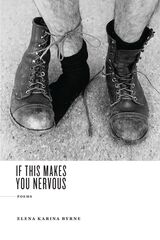 If This Makes You Nervous
Elena Karina Byrne
Omnidawn, 2021 Lyrical narrative poetry that responds to works of art.
Elena Karina Byrne’s fourth collection of poems offers what she describes as an homage to her art-immersed upbringing with poems that challenge perception as they create a dialogue between the speaker and sixty-six artists. Lyrical narratives unfold with psychological urgency and candor as they re-encounter each artist’s unique oeuvre. The poems are as political as they are personal, mapping out the author’s emotional, spatial, and gender orientations within the confines of our visual culture.
Longing and loss prevail in If This Makes You Nervous, always leading the reader on winding paths that return to the bodily while balancing beauty and terror and what is seen and what remains invisible. If This Makes You Nervous is a devotional look at shifting identity that begins in a preteen’s memory, moves through history’s collective body, and ends with what is “connected and accounted for” in the imagination’s relativistic measure of time.
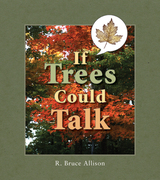 If Trees Could Talk: Stories About Wisconsin Trees
R. Bruce Allison
Wisconsin Historical Society Press, 2009
Inside the pages of If Trees Could Talk, Allison gives readers aged 7 to 12 fascinating stories that introduce them to noteworthy trees, both past and present, across Wisconsin. From Kenosha's buried forest on the shores of Lake Michigan to the Wyalusing maple that saw the last of the passenger pigeons; from Aldo Leopold's "good oak" to the disappeared elms of State Street in Madison, these stories open up a fascinating ecological and social history of Wisconsin to young readers. Other stories showcase the state's history: readers will encounter Chief Black Hawk hiding in a hickory, Civil War soldiers enlisting for battle under "sign-up" trees, and trees used to hang criminals without a trial. They will also learn of large and unusual trees like the Columbus Cottonwood, which was over 26 feet around or, in the words of the author, so large that "it would take you and eight of your friends with your arms outstretched to reach all the way around it!"
Told in a compelling narrative style and supplemented with historic photographs and illustrations, these stories instill a sense of place and understanding of the rich heritage of our trees and forests. The book also carries an environmental message encouraging children to appreciate and manage natural resources wisely and respectfully. The highly accessible format includes a map of historic trees locations, a glossary of tree terms, a tree identification chart, and a list of suggested books and websites for further reading.
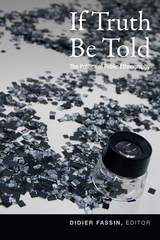 If Truth Be Told: The Politics of Public Ethnography
Didier Fassin, editor
Duke University Press, 2017 What happens when ethnographers go public via books, opinion papers, media interviews, court testimonies, policy recommendations, or advocacy activities? Calling for a consideration of this public moment as part and parcel of the research process, the contributors to If Truth Be Told explore the challenges, difficulties, and stakes of having ethnographic research encounter various publics, ranging from journalists, legal experts, and policymakers to activist groups, local populations, and other scholars. The experiences they analyze include Didier Fassin’s interventions on police and prison, Gabriella Coleman's multiple roles as intermediary between hackers and journalists, Kelly Gillespie's and Jonathan Benthall's experiences serving as expert witnesses, the impact of Manuela Ivone Cunha's and Vincent Dubois's work on public policies, and the vociferous attacks on the work of Unni Wikan and Nadia Abu El-Haj. With case studies from five continents, this collection signals the global impact of the questions that the publicization of ethnography raises about the public sphere, the role of the academy, and the responsibilities of social scientists.
Contributors. Jonathan Benthall, Lucas Bessire, João Biehl, Gabriella Coleman, Manuela Ivone Cunha, Vincent Dubois, Nadia Abu El-Haj, Didier Fassin, Kelly Gillespie, Ghassan Hage, Sherine Hamdy, Federico Neiburg, Unni Wikan
 If We Dream Too Long
Poh Seng Goh
National University of Singapore Press, 2020 Published in 1972 and widely regarded as the first Singapore novel, If We Dream Too Long explores the dilemmas and challenges faced by its hero, Kwang Meng, as he navigates the difficult transitional period between youthful aspirations and the external demands of society and family. Shy and sensitive, he feels detached from mainstream life and is unable to identify with the values that animate his friends. Kwang Meng takes refuge in dreams of exotic faraway places, and imagines merging himself with the sea, which he loves. Yet amid this uncertainty, the reader feels that all is not lost, that the young dreamer will eventually find his way. Kwang Meng’s experiences reflect Goh Poh Seng’s fascination with the question of self amid the dreariness and aimlessness of an increasingly urbanized and materialistic Asian society. The book also provides a fascinating portrait of Singapore as it was in the 1960s, a landscape and society that have since undergone many changes but remain faintly visible in modern Singapore. This new edition restores the author’s original typographic design and has an updated introduction by Koh Tai Ann.
 If You Don't Laugh You'll Cry: The Occupational Humor of White Wisconsin Prison Workers
Claire Schmidt
University of Wisconsin Press, 2017 America is fascinated by prisons and prison culture, but few Americans understand what it is like to work in corrections. Claire Schmidt, whose extended family includes three generations of Wisconsin prison workers, introduces readers to penitentiary officers and staff as they share stories, debate the role of corrections in American racial politics and social justice, and talk about the important function of humor in their jobs.
In a state that locks up a disproportionate number of men and women of color, white prison workers occupy a complicated social position as representatives of institutional authority and bearers of social stigma. The job, by turns dangerous, dull, or dehumanizing, is aided by a quick wit, comedic timing, and verbal agility. The men and women who do this work rely on storytelling, practical jokes, and sarcasm to bond with each other, build flexible relationships with inmates, and create personal identities that work in and out of prison. Schmidt shows how this humorous occupational culture both upholds and undermines prisons as social institutions.
Issues of power and race, as well as sex and gender, infuse Schmidt's groundbreaking analysis, and she also engages with current scholarship about identity, occupational folklore, and family narrative. This eye-opening, provocative book reveals the invisible culture, beliefs, and aesthetics embedded in workplace humor.
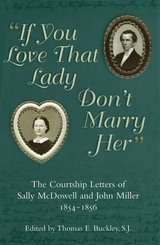 If You Love That Lady Don't Marry Her: The Courtship Letters of Sally Mcdowell and John Miller, 1854-1856
Edited by Thomas E. Buckley
University of Missouri Press, 2000
"Could you love me so much that if the whole world turned against us, & we were obliged to live alone, given up by society you could live entirely in me? Could I ever become all the world to you?" --John Miller to Sally McDowell, February 21, 1855
"At last I come to tell you that I am yours. And I pray God to bless us not only in each other but to each other, and to grant us His favor and protection in the important step we are about to take.
If even to this hour I have fears and misgivings, and am disturbed by doubts and anxieties you must forgive me. They grow out of a condition of things as painful as it is unalterable, and out of an anxious temper which is, I think, like dear little Allie's ticklishness "constitutional." They are entirely without justification in anything I know or believe of you for I have the very fullest trust in your affection, and every confidence in your high and honorable character. But the cloud that rests upon the past with me does obscure the present to us both and looks portentous for the future. Yet you must take me with it all. Perhaps I may by and by prove to be something else than a burden to you; and at any rate, my affection is of some value to you, isn't it?" --Sally McDowell to John Miller, April 30, 1855
"If You Love That Lady Don't Marry Her" is a fascinating collection of almost five hundred letters between John Miller (1819-1895) and Sally Campbell Preston McDowell (1821-1895). Their correspondence began in early August 1854 and continued until their marriage in November 1856. The oldest daughter of the late Governor James McDowell of Virginia, Sally McDowell owned and managed Colalto, the family plantation. She was considered part of the South's social and political elite. John Miller, a widower with two young children, was a Presbyterian minister in Philadelphia. Son of Samuel Miller, a founder of Princeton Theological Seminary, he was one of the North's most prominent clergymen.
McDowell and Miller literally fell in love by mail, but one major obstacle blocked their marriage: Sally McDowell was a divorced woman. She had been wed to Governor Francis Thomas of Maryland, but his jealousy and cruelty soon drove her from Annapolis. Although an 1846 legislative divorce freed her to remarry legally, it was not socially acceptable to do so, especially not to "a man of the cloth." So when Miller and McDowell announced their plan to marry, social pressure cost him his pulpit and made her the object of extreme criticism from family members and friends. Although Miller was initially determined to wed despite any opposition, he eventually settled for a long-term engagement to preserve McDowell's social position.
Apart from a few brief visits, Miller and McDowell's relationship depended entirely upon letters. Begun in carefully guarded terms, these letters soon evolved into intimate explorations of their deepening love, their respective gender roles, the problems created by divorce, and religious and familial obligations. McDowell provides the unusual feminist perspective of a divorced woman in mid-nineteenth-century America. As she probes her own inner world, her correspondence with Miller becomes a healing experience through which she gradually surmounts the limitations she experiences as a woman, her depression and the fears resulting from her first marriage, and the stigma of divorce. Ultimately her self- revelations lead to their marriage in November 1856, which lasted until their deaths a week apart almost forty years later.
Because of their unique situation, Miller and McDowell committed to paper the private thoughts and feelings that most couples would have expressed in person. Although their personal relationship forms the principal subject of these letters, the couple also discussed such issues as the growing sectional tensions, national and state politics and politicians, literary figures, church meetings and personages, slave management and behavior, and family and community values and attitudes. Eloquently written, these letters offer a unique window on American society on the eve of the Civil War. They also reveal important information about gender roles and relationship in nineteenth-century America. Because no other book like this exists in print, readers everywhere will welcome "If You Love That Lady Don't Marry Her."
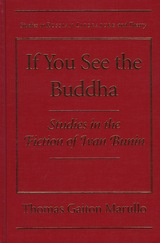 If You See the Buddha: Studies in the Fiction of Ivan Bunin
Thomas Gaiton Marullo
Northwestern University Press, 1999 In a 1994 American Scholar article, Andrew Wachtel wrote of Ivan Bunin: "[He] is undoubtedly the greatest Russian writer whom no one reads." With the collapse of communism, however, Bunin's works are undergoing a revival in both Russia and the West. As enthusiastic as readers and publishers have been, scholarship has not kept pace with this "rediscovery," in part due to the many contradictions in Bunin's writing, in part because much past criticism has been used to advanced the critic's own view of what they love or hate about "modern" life.
In If You See the Buddha, Thomas Gaiton Marullo begins addressing the lack of scholarship by establishing that Bunin was a thoroughly modern writer whose images and ideas were rooted more in the twentieth century than in the nineteenth. But beyond that point, Marullo states that, of all the systems of belief that Bunin adopted and adapted throughout his career, it was his interest in Buddhism that best elucidates the dynamics of his writing. Key Buddhistic concepts figured prominently in Bunin's work. These ideas enabled him to make sense of his world and serves as the catalyst for an ars poetica that tempered his philosophical and aesthetic restiveness and contributed a sense of timelessness to work from both his prerevolutionary and émigré periods.
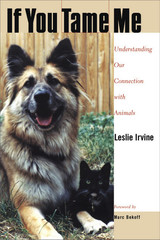 If You Tame Me: Understanding Our Connection With Animals
Leslie Irvine, foreword by Marc Bekoff
Temple University Press, 2004 Nearly everyone who cares about them believes that dogs and cats have a sense of self that renders them unique. Traditional science and philosophy declare such notions about our pets to be irrational and anthropomorphic. Animals, they say, have only the crudest form of thought and no sense of self at all. Leslie Irvine's If You Tame Me challenges these entrenched views by demonstrating that our experience of animals and their behavior tells a different story. Dogs and cats have been significant elements in human history and valued members of our households for centuries. Why do we regard these companions as having distinct personalities and as being irreplaceable? Leslie Irvine looks closely at how people form "connections" with dogs and cats available in adoption shelters and reflects on her own relationships with animals. If You Tame Me makes a persuasive case for the existence of a sense of self in companion animals and calls upon us to reconsider our rights and obligations regarding the non-human creatures in our lives.
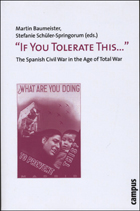 "If You Tolerate This . . . ": The Spanish Civil War in the Age of Total War
Edited by Martin Baumeister and Stefanie Schüler-Springorum
Campus Verlag, 2008 The Spanish Civil War has been called the quintessential expression of violent ideological confrontation in 1930s Europe. Despite this reputation, researchers have neglected to properly explore the Spanish experience in the context of the history of twentieth-century warfare. To fill this gap, “If You Tolerate This . . . ” brings together an international group of scholars to address the Spanish Civil War’s role in the development of total war.
Examining such topics as military violence, the experience of war, and the culture of war, this anthology traces how the differentiation between civilian and military sectors crumbled with the onset of civil war. Individual memory and collective identity in Spain, the authors argue, became synonymous with mass killing and mass dying. Offering a unique perspective on one of European history’s most fraught events, this volume will be necessary reading for students and scholars of twentieth-century Spain and military history.
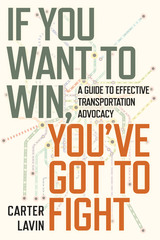 If You Want to Win, You've Got to Fight: A Guide to Effective Transportation Advocacy
Carter Lavin
Island Press, 2025 Your transit and street safety dreams are within your reach. While challenging our dangerous car-centric systems can feel daunting, you can win, and this book is here to help. In If You Want to Win, You’ve Got to Fight, transportation activist and advocacy consultant Carter Lavin provides a roadmap for transforming passion into political power.
Whether your dream is to make your community safer and more sustainable by getting protected bike lanes, improving bus service, or expanding high-speed rail, this book provides step-by-step guidance on organizing for change. Through advice from dozens of advocates across the United States and Lavin’s own experience with over 100 campaigns, readers will learn transportation-specific strategies to win. Critically, the book teaches readers how to deftly navigate their political, cultural, and historical contexts to adapt their advocacy efforts and make allies -- from local businesses to transit agency staff to key decision makers. Action points at the end of each chapter and a toolbox of campaign tactics at the end of the book enable readers to move seamlessly from brainstorming into concrete action.
Whether you are just starting out or have engaged in transportation advocacy for a while, the tools and insights in this book will help you develop, plan, and execute the transportation-related campaign of your choosing. Professionals in the transportation space will also discover how to be an effective advocate while working within the system.
Accessible and inspirational, If You Want to Win, You’ve Got to Fight will be a game-changer for people who want our communities to prioritize people over cars.
Your transportation dreams are all possible. Are you ready to fight for them?
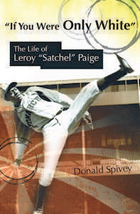 If You Were Only White: The Life of Leroy "Satchel" Paige
Donald Spivey
University of Missouri Press, 2012 If You Were Only White explores the legacy of one of the most exceptional athletes ever—an entertainer extraordinaire, a daring showman and crowd-pleaser, a wizard with a baseball whose artistry and antics on the mound brought fans out in the thousands to ballparks across the country. Leroy “Satchel” Paige was arguably one of the world’s greatest pitchers and a premier star of Negro Leagues Baseball. But in this biography Donald Spivey reveals Paige to have been much more than just a blazing fastball pitcher.
Spivey follows Paige from his birth in Alabama in 1906 to his death in Kansas City in 1982, detailing the challenges Paige faced battling the color line in America and recounting his tests and triumphs in baseball. He also opens up Paige’s private life during and after his playing days, introducing readers to the man who extended his social, cultural, and political reach beyond the limitations associated with his humble background and upbringing. This other Paige was a gifted public speaker, a talented musician and singer, an excellent cook, and a passionate outdoorsman, among other things.
Paige’s life intertwined with many of the most important issues of the times in U.S. and African American history, including the continuation of the New Negro Movement and the struggle for civil rights. Spivey incorporates interviews with former teammates conducted over twelve years, as well as exclusive interviews with Paige’s son Robert, daughter Pamela, Ted “Double Duty” Radcliffe, and John “Buck” O’Neil to tell the story of a pioneer who helped transform America through the nation’s favorite pastime.
Maintaining an image somewhere between Joe Louis’s public humility and the flamboyant aggression of Jack Johnson, Paige pushed the boundaries of segregation and bridged the racial divide with stellar pitching packaged with slapstick humor. He entertained as he played to win and saw no contradiction in doing so. Game after game, his performance refuted the lie that black baseball was inferior to white baseball. His was a contribution to civil rights of a different kind—his speeches and demonstrations expressed through his performance on the mound.
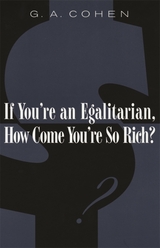 If You're an Egalitarian, How Come You’re So Rich?
G. A. Cohen
Harvard University Press, 2001 This book presents G. A. Cohen's Gifford Lectures, delivered at the University of Edinburgh in 1996. Focusing on Marxism and Rawlsian liberalism, Cohen draws a connection between these thought systems and the choices that shape a person's life. In the case of Marxism, the relevant life is his own: a communist upbringing in the 1940s in Montreal, which induced a belief in a strongly socialist egalitarian doctrine. The narrative of Cohen's reckoning with that inheritance develops through a series of sophisticated engagements with the central questions of social and political philosophy.
In the case of Rawlsian doctrine, Cohen looks to people's lives in general. He argues that egalitarian justice is not only, as Rawlsian liberalism teaches, a matter of rules that define the structure of society, but also a matter of personal attitude and choice. Personal attitude and choice are, moreover, the stuff of which social structure itself is made. Those truths have not informed political philosophy as much as they should, and Cohen's focus on them brings political philosophy closer to moral philosophy, and to the Judeo-Christian ethical tradition, than it has recently been.
 If You're Angry and You Know It, Go Outside: Tools to Cool Off Hot Feelings
Mara Giglio and Keith Wilde
Ohio University Press, 2025 Children have big feelings that are sometimes difficult to manage. In If You’re Angry and You Know It, Go Outside, Mari is struggling with the death of her beloved dog and trying to deal with anger, sadness, and loss. Written simply for young children and illustrated with vibrant colors to reflect the range of Mari’s emotions, this book introduces self-regulation skills for both kids and adults. It emphasizes staying in or returning to our resilient zone—a state where we feel like our best selves and maintain a sense of agency. The book highlights three key strategies for staying in the resilient zone or returning to it when emotions run high:
(1) Notice sensations. Recognizing physical sensations in the body helps us respond to feelings constructively rather than impulsively.
(2) Practice grounding. Grounding involves physical activities that anchor us in the present and calm our nervous system. Techniques include deep breathing, pushing against objects, stretching, dancing, or even playing video games.
(3) Focus on joy and love. Shifting attention to positive and joyful experiences can foster resilience. Ideas include writing a gratitude journal, creating a photo collage, or spending time with loved ones and pets.
Mari’s story is followed by a section for adults that explains the evidence-backed Community Resiliency Model (CRM), developed by the Trauma Resource Institute, and helps grown-ups guide children through big feelings.
If You're So Smart: The Narrative of Economic Expertise
Deirdre Nansen McCloskey
University of Chicago Press, 1990 In this witty, accessible, and revealing book, Deirdre McCloskey demystifies economic theory and practice to show that behind the economists claim to certainty is the ancient art of storytelling. If You're So Smart will engage, enlighten, and empower anyone trying to evaluate the experts who stand ready to engineer our lives.
"Writing with delicious wit and great seriousness."—Publishers Weekly. "
"McCloskey is more interesting on an uninspired day than most of her peers can manage at their very best."—Peter Passell, New York Times
If You've Seen One, You've Seen the Mall: EUROPEANS AND AMERICAN MASS CULTURE
Rob Kroes
University of Illinois Press, 1996 The Dutch scholar Rob Kroes argues that American culture is "modular,"
continually fragmenting, disassembling, and reassembling itself--and in
the process creating something new. In a series of topical essays that
show why he is one of Europe's leading authorities on American culture,
Kroes probes trends in American advertising, the image of the Vietnam
war in American films, the implications of American vernacular culture as represented in rap music, and other topics.
 Igloo Among Palms
Rod Val Moore
University of Iowa Press, 1994
The stories in this prize-winning volume are set in fictional towns, along highways, and in industries on either edge of the Mexico-California border. The author uses memory and imagination to transform these scenes into a defamiliarized frontera, a region of subtle misplacements and cultural contretemps. In these engaging and extremely human stories, gringos move south and Mexicans move north in a search for growth and difference but find that the border is much more fluid, much harder to definitively cross, than they imagined.
For instance, in “Grimshaw's Mexico,” Officer Grimshaw chauffeurs his family south of the border to buy medicine and is taken aback when his little boy appears to learn Spanish in an afternoon. Years later, back in Mexico, his son grown and gone away to live his life, a con artist gives Grimshaw his last chance to so “something foreign and unforgivable.” “Igloo among Palms,” the title story, tells of a dry-ice deliveryman on a lonely road and the somewhat ghostly hitchhiker he picks up and then loses track of late one summer night. The hitchhiker resurfaces, along with a fast-food waitress, in a date palm garden, and there they must find a way to sort out their respective lives.
These stories are deeply entertaining, full of surprises and unexpected turns that ultimately lead the reader to the narrative's fascinating resolution.
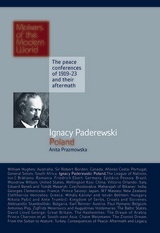 Ignacy Paderewski: Poland
Anita Prazmowska
Haus Publishing, 2009 The thirteenth of President Wilson's Fourteen Points of 1918 read: "An independent Polish state should be erected which should include the territories inhabited by indisputably Polish populations, which should be assured a free and secure access to the sea, and whose political and economic independence and territorial integrity should be guaranteed by international covenant." Ever since the Third Partition in 1795 brought Polish independence to an end, nationalists had sought the restoration of their country, and the Paris Peace Conference of 1919 did indeed produce the modern Polish state. The Western Allies saw a revived Poland as both a counter to German power and a barrier to the westward expansion of the Bolshevik Revolution in Russia—a role the Polish army fulfilled by defeating a Soviet invasion in 1920. But caught between two powers and composed of territory taken from both of them, Poland was vulnerable, and in 1939 it was divided up between the Soviet Union and Nazi Germany following the Molotov-Ribbentrop Pact. The highest profile Polish representative at the Conference was the pianist and politician Ignacy Paderewski (1860-1941), the "most famous Pole in the world", whose image had done much to promote the Polish cause in the West. But he was joined by the altogether less romantic figure of Roman Dmowski (1864-1939), whose anti-Semitic reputation Paderewski took pains to distance himself from when seeking support in the United States.
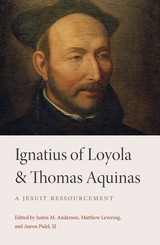 Ignatius of Loyola and Thomas Aquinas: A Jesuit Ressourcement
Justin M. Anderson
Catholic University of America Press, 2023 Though the relationship between Jesuits and Dominicans has historically been marked by theological controversy, Ignatius of Loyola, the founder of the Jesuits, shows remarkable affinity for the Thomistic tradition, the tradition advanced above all by the Dominican order. When writing the Jesuit Constitutions, in fact, Ignatius made Thomas Aquinas’s Summa Theologiae the primary textbook for Jesuit theological formation. The contributions to this volume—originating from Jesuits, Dominicans, and lay scholars alike—explore different aspects of the complex yet illuminating relationship between Ignatius and Thomas. The themes range from the general relationship between the early Jesuits and scholastic theology to the attempts by Francisco de Toledo, the first Jesuit cardinal, to apply Thomistic reasoning to the religious and legal status of Jewish converts to Christianity. Other contributions compare Ignatius and Thomas on topics of significant interest for dogmatic, sacramental, and spiritual theology: spiritual experience, the ordering of the passions, the use of the imagination, prudence and discernment of spirits, frequent communion, Mariology, the “hierarchical church,” and the limits of obedience.
Students of Ignatius of Loyola, Thomas Aquinas, second scholasticism, Christian-Jewish relations, and spiritual theology in general will find this volume an invaluable contribution.
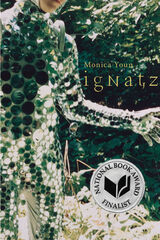 Ignatz
Monica Youn
Four Way Books, 2010 Ignatz takes the form of a cycle of love poems—in radical variations—based on Ignatz Mouse, the rodent anti-hero and love-object of George Herriman’s classic comic strip Krazy Kat. For decades, Krazy Kat rang the changes on a quirky theme of unrequited love: cat loves mouse; mouse hates cat; mouse hits cat with brick; cat mistakes brick for love; and so on, day after day. The backgrounds of the strip were in constant inexplicable flux: a desiccated specimen of Arizona flora morphs in the next panel into a crescent moon, then into a snowcapped butte, while the characters chatted obliviously on, caught up in their own obsessive round. Moving through pacy, overflowing sentences, enigmatic aphoristic observations, and pointed imagistic vignettes, Youn’s second collection vividly captures the way the world reorients around an object of desire: the certainty that your lover “will appear in the west, backlit by orange isinglass,” the ability to intuit a lover’s presence from the way “unseen flutes / keep whistling the curving phrases of your body.” Youn skillfully draws on the repeating narrative motifs and haunting landscapes of Krazy Kat as she tests and surpasses the limits of lyric to explore the cyclical elements of romanticized love. Youn speaks to and with her poetic forbears, whether St. John Perse, whose phrase “robed in the loveliest robe of the year” (T.S. Eliot’s translation) recurs in several love songs to Ignatz, or Geoffrey Hill, whose Mercian Hymns these poems recall in their serial structure and their commingling of the contemporary and classical. Ignatz is a poignant foray into the inventive possibilities of obsession and passion.
Ignition!: An Informal History of Liquid Rocket Propellants
Clark, John D
Rutgers University Press, 1972 A classic work in the history of science. Readers will want to get their hands on this influential classic, available for the first time in decades.
This newly reissued debut book in the Rutgers University Press Classics imprint is the story of the search for a rocket propellant which could be trusted to take man into space. This search was a hazardous enterprise carried out by rival labs who worked against the known laws of nature, with no guarantee of success or safety.
Acclaimed scientist and sci-fi author John Drury Clark writes with irreverent and eyewitness immediacy about the development of the explosive fuels strong enough to negate the relentless restraints of gravity. The resulting volume is as much a memoir as a work of history, sharing a behind-the-scenes view of an enterprise which eventually took men to the moon, missiles to the planets, and satellites to outer space.
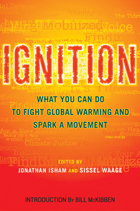 Ignition: What You Can Do to Fight Global Warming and Spark a Movement
Edited by Jonathan Isham and Sissel Waage
Island Press, 2007 The evidence is irrefutable: global warming is real. While the debate continues about just how much damage spiking temperatures will wreak, we know the threat to our homes, health, and even way of life is dire. So why isn’t America doing anything? Where is the national campaign to stop this catastrophe? It may lie between the covers of this book. Ignition brings together some of the world’s finest thinkers and advocates to jump start the ultimate green revolution. Including celebrated writers like Bill McKibben and renowned scholars like Gus Speth, as well as young activists, the authors draw on direct experience in grassroots organization, education, law, and social leadership. Their approaches are various, from building coalitions to win political battles to rallying shareholders to change corporate behavior. But they share a belief that private fears about deadly heat waves and disastrous hurricanes can translate into powerful public action. For anyone who feels compelled to do more than change their light bulbs or occasionally carpool, Ignition is an essential guide. Combining incisive essays with success stories and web resources, the book helps readers answer the most important question we all face: “What can I do?”
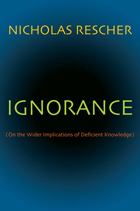 Ignorance: (On the Wider Implications of Deficient Knowledge)
Nicholas Rescher
University of Pittsburgh Press, 2009
Historically, there has been great deliberation about the limits of human knowledge. Isaac Newton, recognizing his own shortcomings, once described himself as “a boy standing on the seashore . . . whilst the great ocean of truth lay all underscored before me.”
In Ignorance, Nicholas Rescher presents a broad-ranging study that examines the manifestations, consequences, and occasional benefits of ignorance in areas of philosophy, scientific endeavor, and ordinary life. Citing philosophers, theologians, and scientists from Socrates to Steven Hawking, Rescher seeks to uncover the factors that hinder our cognition.
Rescher categorizes ignorance as ontologically grounded (rooted in acts of nature-erasure, chaos, and chance-that prevent fact determination), or epistemically grounded (the inadequacy of our information-securing resources). He then defines the basis of ignorance: inaccessible data; statistical fogs; secreted information; past data that have left no trace; future discoveries; future contingencies; vagrant predicates; and superior intelligences. Such impediments set limits to inquiry and mean that while we can always extend our existing knowledge-variability here is infinite-there are things that we will never know.
Cognitive finitude also hinders our ability to assimilate more than a certain number of facts. We may acquire additional information, but lack the facility to interpret it. More information does not always increase knowledge; it may point us further down the path toward an erroneous conclusion. In light of these deficiencies, Rescher looks to the role of computers in solving problems and expanding our knowledge base, but finds limits to their reasoning capacity.
As Rescher's comprehensive study concludes, ignorance itself is a fertile topic for knowledge, and recognizing the boundaries of our comprehension is where wisdom begins.
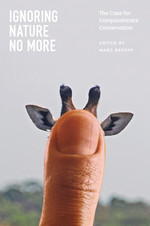 Ignoring Nature No More: The Case for Compassionate Conservation
Edited by Marc Bekoff
University of Chicago Press, 2013 For far too long humans have been ignoring nature. As the most dominant, overproducing, overconsuming, big-brained, big-footed, arrogant, and invasive species ever known, we are wrecking the planet at an unprecedented rate. And while science is important to our understanding of the impact we have on our environment, it alone does not hold the answers to the current crisis, nor does it get people to act. In Ignoring Nature No More, Marc Bekoff and a host of renowned contributors argue that we need a new mind-set about nature, one that centers on empathy, compassion, and being proactive.
This collection of diverse essays is the first book devoted to compassionate conservation, a growing global movement that translates discussions and concerns about the well-being of individuals, species, populations, and ecosystems into action. Written by leading scholars in a host of disciplines, including biology, psychology, sociology, social work, economics, political science, and philosophy, as well as by locals doing fieldwork in their own countries, the essays combine the most creative aspects of the current science of animal conservation with analyses of important psychological and sociocultural issues that encourage or vex stewardship. The contributors tackle topics including the costs and benefits of conservation, behavioral biology, media coverage of animal welfare, conservation psychology, and scales of conservation from the local to the global. Taken together, the essays make a strong case for why we must replace our habits of domination and exploitation with compassionate conservation if we are to make the world a better place for nonhuman and human animals alike.
The Igor Moiseyev Dance Company: Dancing Diplomats
Anthony Shay
Intellect Books, 2019 In this book, Anthony Shay examines the history of the Moiseyev Dance Company and the life and works of its renowned choreographer and founder, Igor Moiseyev. Founded in Moscow in 1937 amid a mass Soviet Union campaign of political repression, Moiseyev’s theatrical dance troupe came to be an international force, transforming the folk traditions of the Soviet Union into a vital diplomatic tool that helped usher in a new era of cultural exchange. The author explores the company through multiple lenses of spectacle, Russian nationalism, and the Cultural Cold War to analyze its history and its enduring contributions to dance and global culture. The first English-language study of its kind, Shay blends academic research with personal anecdote to provide a nuanced analysis of Moiseyev’s importance in choreographic art and his place in the world of dance.
iGovernment
Corien Prins, Dennis Broeders, Henk Griffioen, Anne-Greet Keizer, and Esther Keymolen
Amsterdam University Press, 2012
The authors of this incisive study explore the problems of the ongoing digitization of government, such as the creeping loss of data quality, and how citizens and officials must respond to these complications in the coming years. The iGovernment is running full speed on information networks and digitization, but it is also seriously out of step with existing bureaucracies. iGovernment offers an accurate picture of how the digital technologies are shaping modern governments, and also a powerful corrective for the dissonance between technology and organizational management.
“This book will be a valuable resource for researchers and scholars seeking to understand the possibilities, dilemmas, and challenges of bringing the Internet and related technologies to center stage in government and public services”—Helen Margetts,University of Oxford
 Group Experiment and Other Writings: The Frankfurt School on Public Opinion in Postwar Germany
By: Friedrich Pollock, Theodor W. Adorno, and ColleaguesEdited, Translated and Introduced by: Andrew J. Perrin and Jeffrey K. Olick
Harvard University Press, 2011 During the occupation of West Germany after the Second World War, the American authorities commissioned polls to assess the values and opinions of ordinary Germans. They concluded that the fascist attitudes of the Nazi era had weakened to a large degree. Theodor W. Adorno and his Frankfurt School colleagues, who returned in 1949 from the United States, were skeptical. They held that standardized polling was an inadequate and superficial method for exploring such questions. In their view, public opinion is not simply an aggregate of individually held opinions, but is fundamentally a public concept, formed through interaction in conversations and with prevailing attitudes and ideas “in the air.” In Group Experiment, edited by Friedrich Pollock, they published their findings on their group discussion experiments that delved deeper into the process of opinion formation. Andrew J. Perrin and Jeffrey K. Olick make a case that these experiments are an important missing link in the ontology and methodology of current social-science survey research.
IGY: Year of Discovery
Sydney Chapman
University of Michigan Press, 1959 Here, in word and picture, is the story of man's first probe into space. Vanguard and Sputnik are only one side of the story--the International Geophysical Year is the first concerted international effort to advance our knowledge not only of space but of earth and sun.Sydney Chapman, leader of the team of scientists that directed the program, re-creates for the general reader the discoveries that will provide the basis for our exploration of space. He describes how scientists from 67 nations pooled their resources and techniques to explore our corner of the universe—with satellites and rockets, the voyage of the "Nautilus" under the polar ice cap, teams of amateur moonwatchers—and what their discoveries mean for our future.
 Hippota Nestor and Beyond: Selected Essays
Douglas Frame
Harvard University Press In Hippota Nestor and Beyond: Selected Essays, Douglas Frame revisits the Homeric figure of Nestor, who he argues derives from twin figures in Indo-European myth, and dates the composition and performance of the Iliad and Odyssey to the late eighth or early seventh century BCE at a festival of twelve Ionian cities in Asia Minor. Frame takes up subjects such as the evidence for Nestor’s Indo-European origins; the related origins of the Greek word noos, “mind”; the Phaeacians in the Odyssey as the key to the circumstances in which the Homeric poems were created; Nestor’s role connecting the two poems into a one whole. Other essays in the collect break new ground with respect to the circumstances of the poems’ performance; the purpose of the poems in their historical setting; the relation of the poems to other poetic monuments of the time; the reception of the poems in the Greek mainland after their origin in Ionia; and a closer tracking of the Indo-European origins of the figure hippota Nestor, “the horseman Nestor,” in light of the invention of the chariot in the Russian steppes c. 2000 BCE.
 Hippota Nestor and Beyond: Selected Essays
Douglas Frame
Harvard University Press In Hippota Nestor and Beyond: Selected Essays, Douglas Frame revisits the Homeric figure of Nestor, who he argues derives from twin figures in Indo-European myth, and dates the composition and performance of the Iliad and Odyssey to the late eighth or early seventh century BCE at a festival of twelve Ionian cities in Asia Minor. Frame takes up subjects such as the evidence for Nestor’s Indo-European origins; the related origins of the Greek word noos, “mind”; the Phaeacians in the Odyssey as the key to the circumstances in which the Homeric poems were created; Nestor’s role connecting the two poems into a one whole. Other essays in the collect break new ground with respect to the circumstances of the poems’ performance; the purpose of the poems in their historical setting; the relation of the poems to other poetic monuments of the time; the reception of the poems in the Greek mainland after their origin in Ionia; and a closer tracking of the Indo-European origins of the figure hippota Nestor, “the horseman Nestor,” in light of the invention of the chariot in the Russian steppes c. 2000 BCE.
|
|

